April 20, 2024 | 12th of Nisan, 5784
By Julia Loeb, WLCJ International President
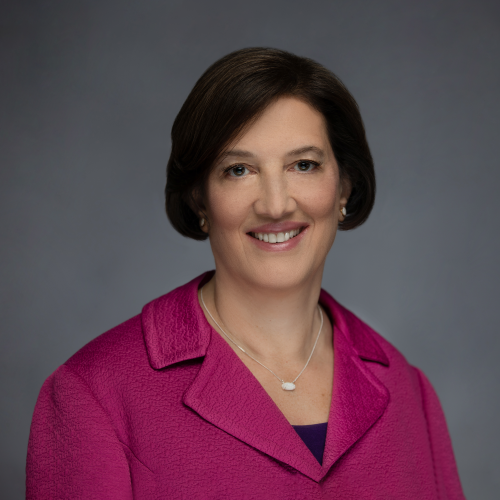
Zissen Pesach
As the first night of Pesach approaches on Monday, our communities are abuzz with both excitement and the typical pre-holiday panic. This week, we are busy with extensive preparations—cleaning, shopping, and cooking. As I get ready for this year’s holiday, I reflect on previous celebrations, each one a vivid memory interwoven with tradition, mishaps, and unforgettable moments. From the unexpected breakdown of a cooktop just before the first Seder to vibrant gatherings marked by songs, afikomen hunts, and family reunions, each Seder has its own unique narrative and leaves a lasting imprint on our family’s history.
Our Passover celebrations have evolved over the years, blending innovative customs with cherished traditions. These include crafting playful “plague bags” and experimenting with diverse culinary delights that go beyond the classic brisket. The active participation of my now-adult children has infused our Seders with creativity and joy, renewing our sense of community and continuity. Although some faces at our table have changed—with friends moving and beloved family members passing away—we consistently open our home and our Seder to new attendees, embracing both Jews and non-Jews alike, trying to embody the spirit of “let all who are hungry come and eat.”
This Shabbat, Parashat Metzora discusses tzara’at, a mysterious affliction where the victim is described as if they were dead and explains the ritual for reintegration of that person into the community. Just days after that Torah reading, we have our Passover Seder, where we recount the Exodus, highlighting the protective ritual that safeguarded Israelite homes during the plagues. Interestingly, the Hebrew word Negah, meaning disease, plague or wound, is used to describe both the affliction of the tenth plague that caused the death of the first born, and the tzara’at skin disease—linking both narratives and underscoring themes of rebirth and community integration.
The rabbis noticed more than just the similar word used to describe these two “afflictions.” The act of painting blood using the hyssop plant is used to ward off both the angel of death on the night of the tenth plague and the affliction of the skin disease. Moreover, on the night of the tenth plague, the Israelites were required to perform this ritual, and then wait until they were allowed to leave their homes and join the broader community. And, in this week’s Torah reading we are told that the person suffering from the near-death skin disease had to wait after the similar ritual to rejoin their community. The rabbis say in the former instance the Israelites were being born as a new nation, and in the latter, the person is given a chance for a spiritual rebirth that now allows them to rejoin that nation. In both instances, the focus is on rebirth and the renewal of spirit required to build a community.
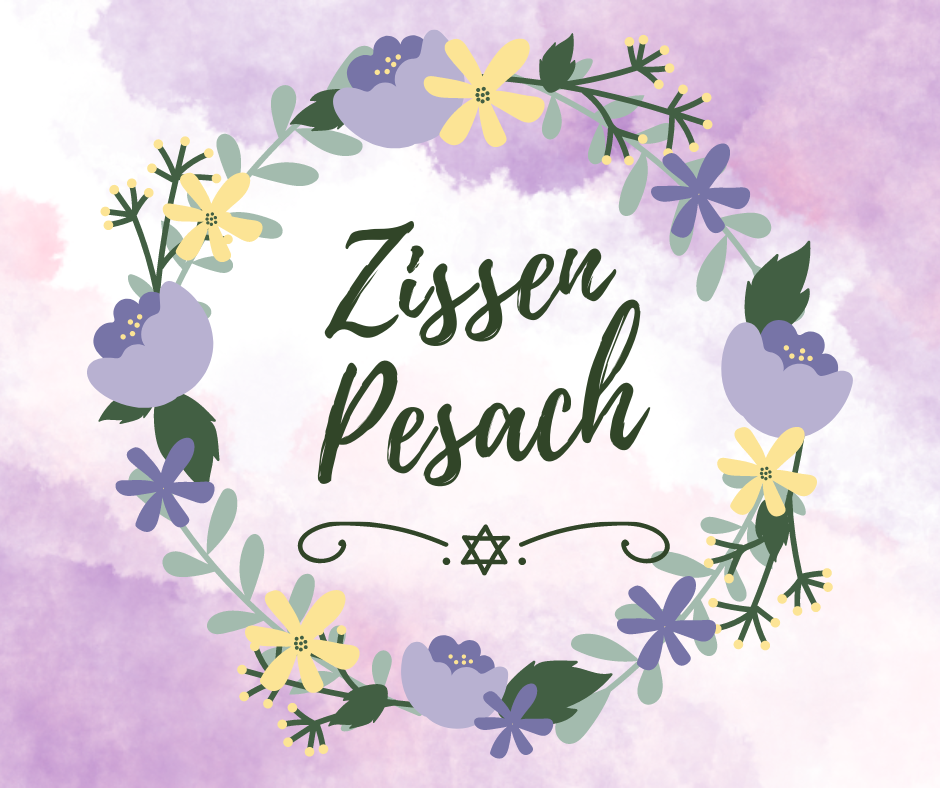
In our times, the themes of spiritual renewal and community resonate strongly. As we prepare for Passover, let’s reconnect with loved ones and with our community, including our brothers and sisters in Israel, to cherish all the blessings in our lives, including the bonds within Women’s League. May the story of our ancestors remind us of the power of community and the divine potential in every individual.
Wishing everyone a Zissen Pesach surrounded by family and friends.
Shabbat Shalom and Chag Sameach!
Julia Loeb
WLCJ International President
jloeb@wlcj.org
April 13, 2024 | 5th of Nisan, 5784
By Ellen Kaner Bresnick, Co-Chair of the WLCJ Kehilah Committee
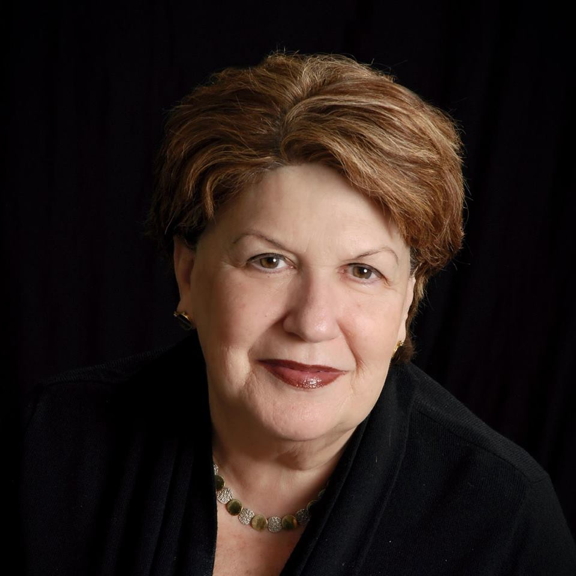 On the Road to “L’Dor V’Dor”—A Joyous Jewish Journey, For Sure!
On the Road to “L’Dor V’Dor”—A Joyous Jewish Journey, For Sure!
In the whole spectrum of frequently-used sayings, I believe that “Wait till you become a grandparent! There is nothing better” is probably one of the most, if not the most, commonly used one. And why do people think that there is nothing better? That question calls for an easy answer. Grandparenting gives us new moments with playmates that we often view as both adorable and gifted, new chances to re-do with them what we think we might not have done so well the first time with their parents, and new opportunities to love “Jewishly” these very special little people who are related to us and of whom we are very proud.
One of my most significant memories as a grandparent occurred about twelve and a half years ago when I went to my daughter and son-in-law’s house. I eagerly rang the bell hoping to spend some playing-time with my four-year-old granddaughter Rylie and her baby brother Blake who was about six months old. When Sara came to the door, she held the baby in her arms. He took one look at me and flung out his little arms and—I really want to believe this—tried to say something that sounded vaguely like the word “Nana”. His eyes were bright and joyful, and he had a big smile on his face. He definitely knew who I was and that he belonged to me and I, most certainly, belonged to him.
My excitement was evident as well, and as I reached for him, I realized at that moment that as much as I had loved him before that day simply because he was mine, he and I, in a second, had cultivated a new aspect of our relationship. He was my hope for the future, along with his older cousins and his sister (and later his younger brother). He, my fourth grandchild, had become my next opportunity for ensuring that Judaism, my Judaism as I knew it and loved it, would go on for these beautiful children. That was my responsibility L’Dor v’Dor—“From Generation to Generation”—to see that I did everything for the next generation that I could, despite the proliferating anti-Semitism and other often difficult anti-Jewish moments in our history and in our daily lives. It was so clear to me during that “aha!” moment that it was incumbent upon me and others from my generation to pass on many important teachings to our children and grandchildren and provide for them repeatedly numerous religious and spiritual opportunities for them to fully celebrate their Judaism. This is what others had done for me, and what I intended to do for them.
During our present time, it is often very difficult to relax enough within our Jewish lives so as to enjoy these special moments—like the meaningful Seders we will participate in next week or the life-changing occasions like the bar mitzvah and bat mitzvah of our children and grandchildren when they attain their adult membership in our respective synagogue, day school, camp or JCC communities, or even at our Jewish weddings with beautiful rituals and traditions like the chuppah and the communal yelling of “mazal tov” when the glass is broken. These are the moments in which we must joyfully engage and lead our little ones right along with us despite the vitriolic anti-Semitic demonstrations we see on the world-wide stage and even in our own backyards. The presence of naysayers who threaten our very existence, and the friends who inexplicably remain silent when we look to them for their support and their affirmation that they will always be there for us should not control our responses to our Judaism and our obligations to those in the next generations. As much as we are heartbroken about the horrors that occurred on October 7, 2023 and the accompanying anti-Semitism that caught so many of us by surprise, we cannot allow all of those moments of fear to prevent us from handing down to those who come after us and those whom we love with all of our hearts these precious Jewish life-affirming experiences. And at the same time, we cannot forget how those who came before us did the same for us, despite the hardships that they encountered. L’Dor V’Dor took care of us then, and now we must do the same for the next generations coming up in spite of every negative force surrounding us.
As I have now been at this grandparenting position for nineteen years, I am more and more sure that my role as a Jewish grandparent is to honor each of my five grandchildren by “feathering their Jewish nests” and by handing down to them the family stories of their relatives from so many generations ago who came to this country to achieve what they perceived of as their American Dream, one that was completely bound up in the quest for religious freedom. During these teachable moments of family storytelling, I have been and continue to be very mindful that I must extend the power of these inherited stories by including “props” with them. Thus, I have been working on giving some of my precious mementos and prized Judaica that was handed down to me from my grandparents and parents to my grandchildren, with the promise of more to come. And with each of these great gifts comes great responsibility, I tell them. Hopefully, they and others like them will come to understand that this endeavor, on one level, is a literal translation of L’Dor v’Dor, but they also have to appreciate the spiritual power behind this commandment. I want them to comprehend that they too have the responsibility to pick up the mantle of their Judaism and hand it down, with all of its teachings from the Torah and the Talmud and every other important text that we study in whatever form they wish, to the generation that comes after theirs. They have to understand the intent behind the mitzvah of L’Dor v’Dor”— i.e. to ensure, to promise, to guarantee. When this is done, so we and they, all of us, will carry on and survive despite the forces that try to work against us.
Finally, as many of you know, I had a very difficult summer in 2023 and, physically, I almost did not make it to 2024. Thankfully I am still here. I always joke that only the good die young, so I have it made, but in truth what I have also said is that I have no intention of going anywhere, not that I have the power to control this. I will claw my way back as much as is necessary and as much as I can because I want to see all of the wonderful things my grandchildren are doing and will do with their Judaism. Right now, as I write this, my two granddaughters are planning to go to Israel—one next week and the other shortly after—in order to volunteer with other young Jews from around the world. Israel is as much a part of their DNA as it is for me, and they know that Israel needs them desperately to help in any way they can.
Additionally, it is all those plans, and events and those Jewish rites of passage in which they and their siblings and cousins participate that hopefully illustrate the fulfillment of the mitzvah of “L’Dor v’Dor”, and I want to be there for these events—fully and completely. I want to learn about what my five are doing spiritually and religiously and how they are doing it. I want to dress up for these events, give tzedakah as needed, explain to them and teach them about everything that is beautiful and awe-inspiring about Judaism and do whatever else I need to do to help them as together we fulfill the mitzvah of “L’Dor v’Dor”.
And, in truth, I have done all of those things recently, for this Shabbat, my grandson Blake will become a Bar Mitzvah. Yes, the same baby that greeted me so joyously long ago and cemented our Jewish connection from generation to generation, is ready to take his next Jewish step. And I am as proud of him as I was of his cousins Jordyn and Micah and his sister Rylie when they became bar mitzvah and bat mitzvah. And I will be equally proud of his younger brother Liam when it is his turn.
So Blake—go do it. Your Nana loves you very much and is extremely proud of you for you are one of her five chances to get L’Dor v’Dor correct! And in case I don’t tell you enough—yasher koach in advance!!
Shabbat Shalom, Everyone!
Ellen Kaner Bresnick
Co-Chair of the WLCJ Kehilah Committee
ebresnick@wlcj.org
April 6, 2024 | 27th of Adar II, 5784
By Diane Mashioff, WLCJ Treasurer
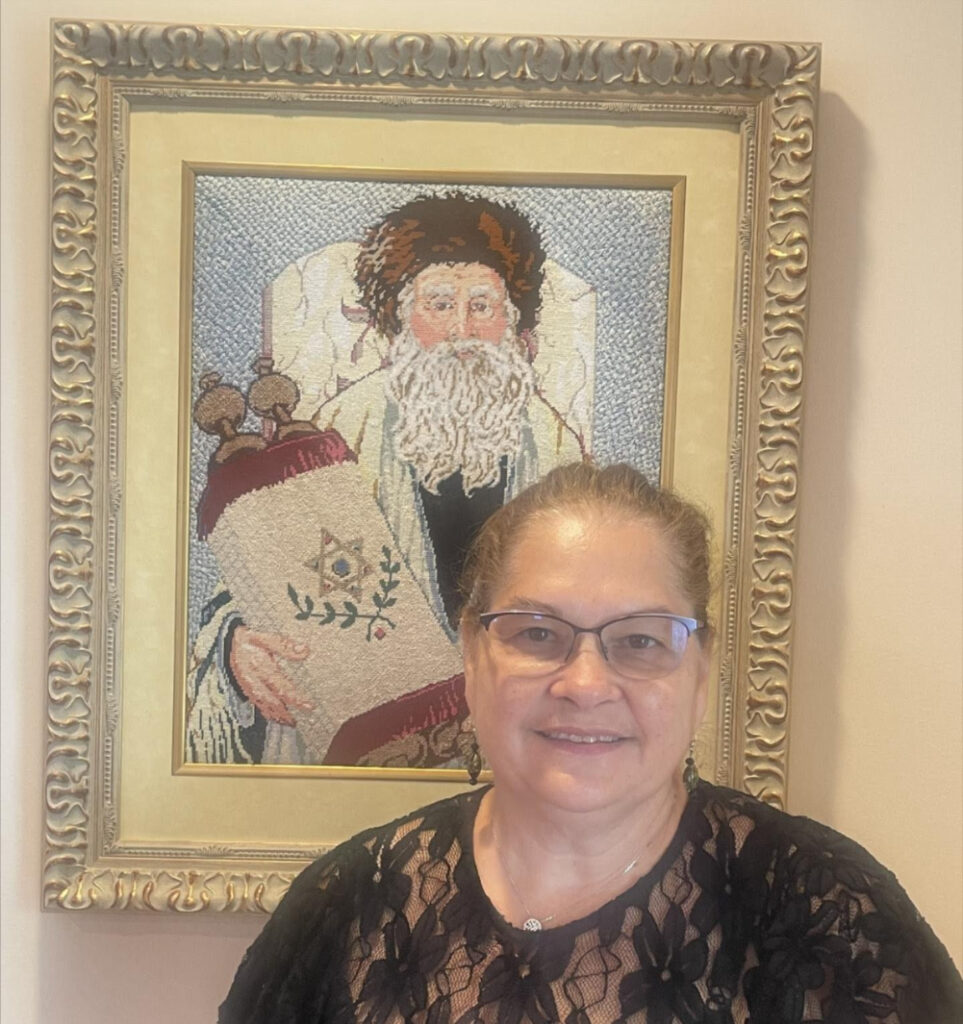 Instilling Jewish Customs and Rituals as a Convert
Instilling Jewish Customs and Rituals as a Convert
In this week’s Torah portion, Shmini, God laid out the “laws of kashrut.” Thirty-seven years ago, I decided to convert to Judaism and adopted the laws of kashrut (keeping a kosher home) and never looked back from my childhood upbringing. I married my beloved husband, Ben, in 1986, and raised two children, Ira and Leah.
I made many trips to and from Hebrew school. Ira became a Bar Mitzvah in 2004 and Leah, a Bat Mitzvah in 2008. They both went onto Hebrew high school and were Confirmed, and attended JCC summer camp. Leah continued to teach Hebrew school and the Junior Congregation at our shul in Cherry Hill, N.J. Hopefully I instilled in my two children the laws and the value of Jewish customs and rituals.
Born and raised as a Catholic, going to Catholic school until fourth grade (oldest of 6 children), that was the religion that I practiced. My father, a Lutheran who converted to Catholicism, married my mom, a Catholic. As I wrote this article, I observed his yahrzeit on the 29th of Adar. It wasn’t until his passing that I finally realized why he was always more accepting than my mom of my choice to convert to Judaism: It was because he was a convert too! There were little subtle things, but it was clear that he didn’t ever once question my choice.
As a family, we decided to participate in many of my family’s religious events and we invited them to participate in our Jewish traditions. But it was very clear to all that our children were being raised Jewish.
Recently, I joined over 40 sisters of WLCJ during Makom B’Yachad to say Kaddish for my dad. Not only did I find comfort among all my sisters, we had a beautiful service and watched a lovely video for International Women’s Day. Had I not been a member of Women’s League, I would have not had this opportunity to partake in this religious ritual at my home.
While there is no formal requirement for a convert to say Kaddish for a non-Jewish parent, I wanted to show utmost respect for my dad and said Kaddish for one day less than 11 months to elevate his soul. It was my way of honoring him, and when my mom passes, I will do the same for her, too.
This week’s Torah portion begins with the consecration of the Mishkan, the sanctuary where the Israelites worshipped, and the establishment of a sacred space for divine presence among the people. The one thing I wish I could change is that if I were to make aliyah to Israel, I would not be recognized as being Jewish because of my Conservative conversion. I would have to have an Orthodox conversion to be considered Jewish in Israel. For me, once a Jew always a Jew, so that we all should be able to share the sacred space for divine presence no matter where we travel.
It’s an honor and thrill to serve as Women’s League for Conservative Judaism’s Treasurer for Julia Loeb’s administration. I look forward to seeing my kids get married under the chuppah and G-d willing someday to have grandchildren so my husband and I can be called zayde and bubbie, and so we can instill in them our strong Jewish customs and rituals.
L’dor va’dor!
Diane Mashioff
WLCJ Treasurer
dmashioff@wlcj.org
March 30, 2024 | 20th of Adar II, 5784
By Cathey, Swerdlow, WLCJ International Vice President and Education Chair
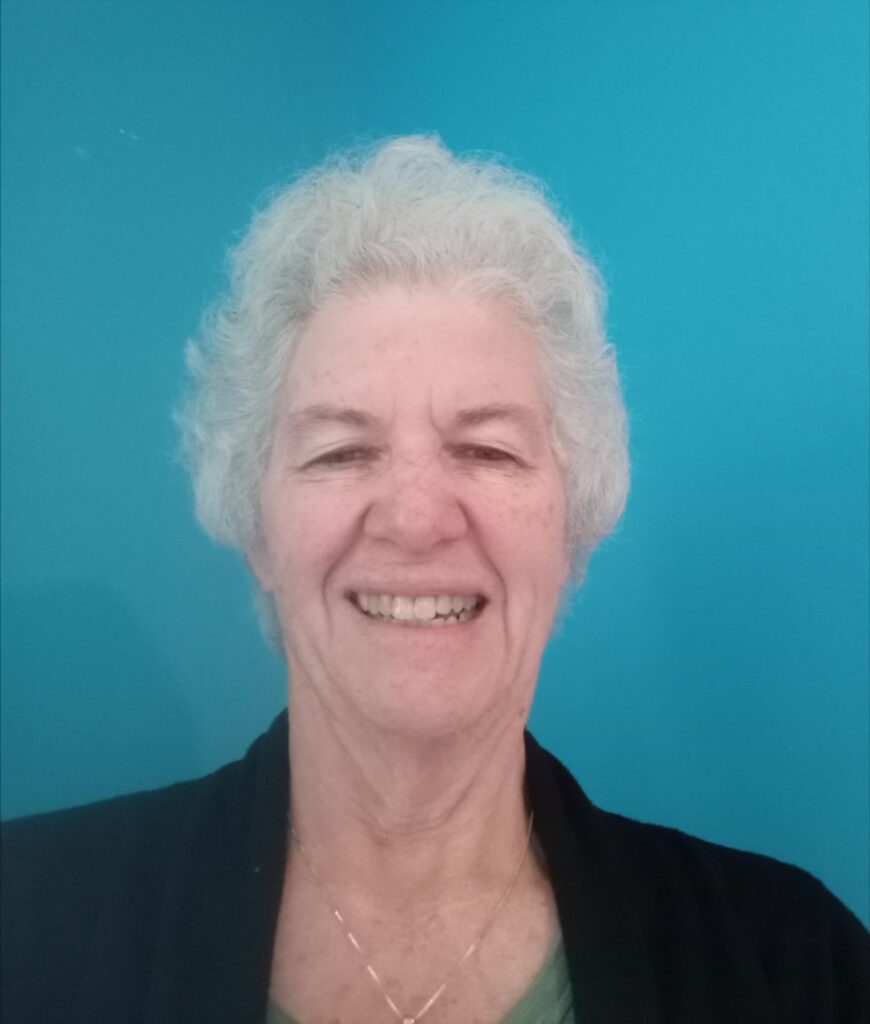
Encouraging Equity and Equality in Our Communities Today
Over the years as I have engaged in Torah study on a more regular basis, whenever I reach the beginning of Leviticus, I let out a groan. After the family dramas, the escape from slavery, the magnificence of Mt. Sinai, the Torah now turns to animal slaughter, entrails on the altar, and other disgusting details. What a letdown!
But this year, in true rabbinic fashion, I found something to mull over and relate to that I hadn’t fully understood before. In the opening discussion of the guilt offering that we read about last Shabbat there is this exchange (Lev 5:1-13) – “For a guilt offering bring a female from the flock, sheep or goat…but if his means do not suffice, two turtledoves or pigeons…but if his means do not suffice, a tenth of an ephah of choice flour.”
As I read through this passage, it hit me…this is an example of the interplay between equality and equity, two words that get bantered around a lot and, in some circles, even derided as negatives.
Equality – the laws apply equally to all people. Each person has an equal responsibility to endeavor to live a life free of incurring guilt. That is the law. But life is complicated, mistakes are made, and guilt is incurred. If there was only one kind of sacrifice that could be brought the potential would exist that there would be an unequal burden to be shouldered by members of the community.
Equity – the Torah recognizes that not every person has the same resources. So, the Torah immediately sets up a more equitable system. According to a person’s means, the sacrifice offering is adjusted. The ritual still functions in the same manner and expiation is made for the guilt, but there is equity in how the law applies within the community.
What are equality and equity today, in our communities? As an example, we need to have equality of access…to education, to healthcare, to justice, to clean air and water and more. And yet, even when the goal is equality, without addressing equity there is often little semblance of equality.
Suppose you are a teacher in a classroom, and you want everyone to be able to see what you write on the board at the front of the room. Would you put the tallest children in the front row? No, they would obstruct the view of shorter children behind them. Maybe you would arrange the desks in such a way that each child has a clear view of the board, rather than the typical setup with straight rows. And if one child can’t see because she needs glasses you would make sure she gets a pair, but you wouldn’t get a pair for every child. These considerations are examples of seeking equity.
When navigating in the community with the goal of equality, striving for equity is not showing favoritism or discrimination. Rather, it is treating individuals with dignity and respect, understanding a person’s needs and addressing systemic issues that will enable us to create a community of equality and justice.
Perhaps that is why the Torah embeds these lessons here, amid the messiness of the details of sacrificial offerings. Our world is full of messiness and in order to make sense of it we need to wade through the muck and find our way to the truth.
Shabbat Shalom,
Cathy Swerdlow
WLCJ International Vice President and Education Chair
cswerdlow@wlcj.org
March 23, 2024 | 13th of Adar II, 5784
By Julia Loeb, WLCJ International President

From Shushan to Selma: Lessons of Resistance, Courage, and Change
Having recently returned from our synagogue’s Purimspiel practice, and delving into my megillah reading for the upcoming weekend, Purim is at the forefront of my thoughts. At the same time, I’m filled with the impactful images and narratives from our Women’s League Civil Rights Journey last week through Atlanta, Birmingham, Selma, and Montgomery, where we learned about individuals who sparked significant historical change in this country.

On the trip, we confronted the history of racial terror lynching, used as a systemic tool of oppression against African Americans. The haunting photographs of lynchings, eerily reminiscent of modern images taken by Hamas terrorists, underscored the dehumanization of the “other.”
This theme of oppressing the “other” is central to the Purim narrative as well. Though Purim and the Civil Rights movement come from vastly different historical and cultural contexts, they both explore the themes of identity, otherness, and the pursuit of justice.
In the Purim story, Jews were marginalized as the “other”—a minority targeted by Haman for their distinct identity and refusal to assimilate. Purim celebrates the bravery of Esther and Mordechai and their successful stand against injustice, challenging, and ultimately foiling, Haman’s evil plan. Esther, who initially concealed her Jewish identity, risked everything by revealing it to the king, asserting that Jews were not mere “others” but her family.
Every fight against injustice requires brave heroes. Civil Rights movement leaders such as Dr. Martin Luther King Jr., Rosa Parks, and John Lewis, together with Jewish leaders and countless others championed equality through nonviolent protest and civil disobedience. The Selma to Montgomery marches, spurred by the tragic death of Jimmy Lee Jackson, stand as a testament to such courage. Southern Christian Leadership Counsel (SCLC) leader James Bevel drew from Esther’s courage, proposing a march to the state capital in Montgomery in honor of Jackson, reminiscent of Esther’s plea to the king on behalf of her people. He said “it would be fitting to take [Jimmy Lee Jackson’s] body and march all the way to the state capital in Montgomery. As it is written in the Book of Esther, ‘she is charged to go unto the King and supplicate unto him for her people.’ We must go to Montgomery and see the King [Dr. Martin Luther King Jr.].”

Rosa Parks’ refusal to give up her seat on a Montgomery bus and King’s leadership of the bus boycott are specific acts of defiance that sparked significant change, much like Esther’s confrontation with the king and Haman. Both Purim and the Civil Rights movement underscore the importance of challenging injustices, highlighting how reclaiming one’s identity can lead to transformative societal change.

Our celebration of Purim this year offers an opportunity for reflection on the ongoing struggles for justice and against antisemitism worldwide, urging us to embrace the courage of Esther and the Civil Rights leaders. We are inspired to use our voices, resources, and privileges to combat all forms of oppression, bigotry, and injustice.
Whether it’s Esther, Civil Rights icons, or our political leaders here and in Israel, the world needs leaders who exemplify humility, openness, and bravery. May we all find courage within ourselves and be blessed with such leaders in our lifetime.
Shabbat Shalom and wishing you and your families and communities a very joyous Purim.

Shabbat Shalom,
Julia Loeb
WLCJ International President
jloeb@wlcj.org
March 16, 2024 | 6th of Adar II, 5784
By Teresa Samtur, WLCJ Recording Secretary and Garden State Region Immediate Past President
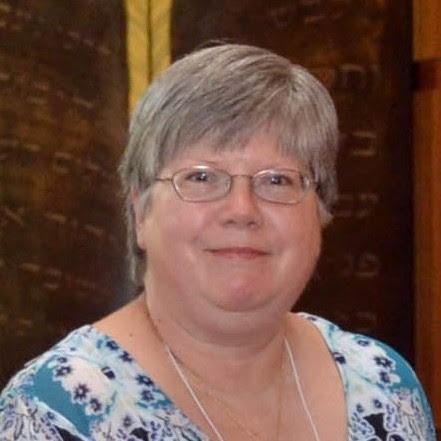
“O prosper the work of our hands!” Psalm 90:17
This week’s Torah reading, Parashat Pekudei, begins with an inventory of the gold, silver and copper given by the Israelites to build and furnish the mishkan (tabernacle). Moses blesses the Israelites after he sees that the work needed to build and furnish the mishkan was completed as commanded. According to Midrash (Sifre to Bamidbar, 143) Moses blesses them saying, “May it be God’s will that the Shechinah rests upon the work of your hands.” The people respond, “May the favor of the Lord, our God, be upon us; let the work of our hands prosper, O prosper the work of our hands!” (Psalm 90:17). Parashat Pekudei ends with a cloud covering the mishkan, signifying that the Shechinah, God’s divine presence, is inside.
In discussing Parashat Pekudei, Rabbi Lord Jonathan Sacks wrote: “Blessing them and celebrating their achievement, Moses showed them what they could be. That is potentially a life-changing experience. We can achieve heights of which we never thought ourselves capable. All it takes is for us to meet someone who believes in us, challenges us, and then, when we have responded to the challenge, blesses and celebrates our achievements.”
Reading Parashat Pekudei took me back to the time, almost thirty years ago, when I decided to become a Jew by choice. After walking into my synagogue for the first time, I was drawn by the feeling of kehilah (community). A short time later, after attending services and going to Sisterhood Affiliate meetings, I learned about tikkun olam and my role in making the world a better place. I never imagined I would become president of my Sisterhood Affiliate, let alone president of the Garden State Region or Women’s League recording secretary. But I had family, friends and mentors who believed in me and celebrated with me, each step along the way. For several weeks this winter, the Garden State Region nominations committee worked, like the other Regions in Women’s League, to present to our membership a slate of officers and activity chairs for the 2024 – 2026 term. At our Spring Conferences, we will celebrate the newly elected slate and their achievements. But our job is not done – we must give them encouragement, the tools for success and friendship. This will strengthen them, our Regions, Women’s League, and most of all ourselves.
Blessings – do you ever count them in the morning or before falling asleep? I had been thinking about keeping a gratitude journal after learning, at a Region program about insomnia, that an inventory of daily blessings reduces anxiety and improves sleep. However, last week I read an article about Gina Hamadey, author of the book “I Want to Thank You.” She gave herself the goal of writing 365 thank you notes in a year. She started writing the notes during her daily commute to work and in a few days realized she left the train feeling happier. An unexpected benefit also happened- the recipients of her notes often contacted her and told her the notes made them feel appreciated and had improved their mood as well.
I don’t know about you, but immediately after Shabbat I’m going to start writing lots of thank you notes. I want the special people in my life to know, tangibly, in writing, how grateful I am for the blessings they have given me.
Shabbat Shalom,
Teresa Samtur
WLCJ Recording Secretary and Garden State Region Immediate Past President
tsamtur@wlcj.org
March 9, 2024 | 29th of Adar I, 5784
By Cory Schneider, WLCJ Archives Chair and Past International President
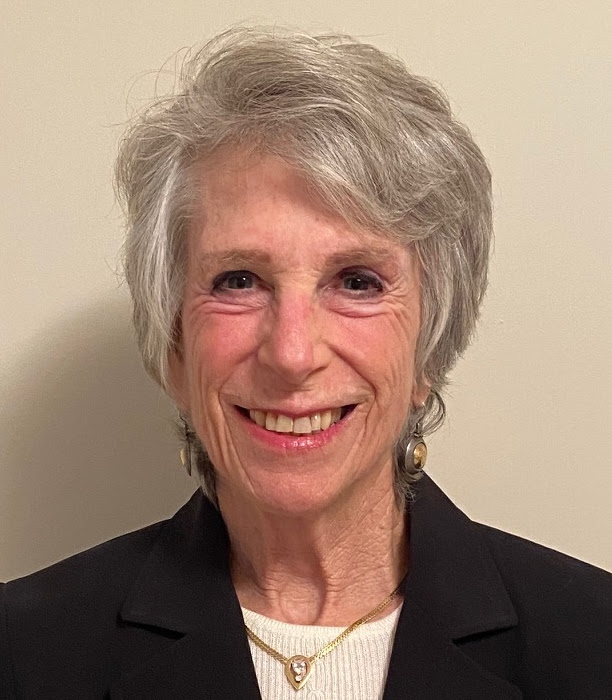 Weaving Mitzvot
Weaving Mitzvot
Hiddur mitzvah was the theme for Women’s League and Torah Fund for 2011-2012. This excerpt from the introduction to the program materials created by the Women’s League Education Department beautifully describes this mitzvah.
“There is a famous story in the Talmud when Rabbi Ishmael, commenting on the verse, “This is my God and I will glorify Him” (from Shirat HaYam, the “Song of the Sea,” Ex. 15:2), asks: “How should we glorify God?” Rabbi Ishmael answers his own question by saying: “I shall prepare before God a beautiful lulav, a beautiful sukkah, beautiful tzitzit, beautiful tefillin, a beautiful shofar, a beautiful Torah scroll.”
“The concept of hiddur mitzvah — beautifying or embellishing a mitzvah – that derives from this verse in the “Song of the Sea” is considered to be the source for Jewish aesthetics. With adornment, sacred objects become more precious. A plain challah on the table would be sufficient; a beautiful challah cover enhances its presence.”
“Throughout the ages, Jewish craftsmen and artisans – both men and women – have created all manner of beautifully decorated ritual objects – from the miskhan in the desert, to delicately embroidered Torah mantles, filigreed kiddush cups and illuminated manuscripts.”
“In very practical terms hiddur mitzvah is a way in which each of us can personalize mitzvot through the act of creation and adornment. As we moderns seek new modes of spiritual expression, handcrafts remain a time-honored source of satisfaction.”
One of the ways I have translated this mitzvah into action was to develop a weaving program through my Sisterhood at Neve Shalom Congregation in Metuchen, N.J. with wonderful support from Jennifer Bullock, Sisterhood president and co-chair of the program. I wanted to provide the opportunity for others to experience the satisfaction and beautiful results of hiddur mitzvah. Personally, and most amazingly, it has become a way for me to act out my passion and to share the joys of Judaism with others. It has become one of the raisons d’être of my life.
Since the program began about eight years ago, we have had more than 300 weavers come to weave Judaica – tallitot, tallit and tefillin bags, challah and matzoh covers, and chuppot. From ages 4 (with help to reach the pedals) to 94, they have used our Loom Room to create beautiful Judaica. Weaving, a very relaxing and “Zen” experience, is a time when so many reflected on their lives, their Judaism, and the relationship between them and the person for whom they are weaving, be it themselves or a loved one.
The comments have been so gratifying!
“Each time I put on the tallit my mother wove for me it is like being hugged by her.”
“Three generations tied the tzitzit on the tallit I wove for my grandson. When completed, we all recited the Shehecheyanu. This was such an emotional experience. My heart was filled with love for my family and pride in what I was passing on to my grandson. My father, z’’l, was a very religious man and I couldn’t help thinking how proud he would have been.”
“As I completed my tallis project on the loom, I realized what an amazing transformation was taking place while I worked. Not only were the threads woven together into a beautiful tallis and tallis bag, but also I grew as a person and as a Jew. I have learned a lot about myself and about how important fostering the love of Judaism is for me.”
I am so pleased that Women’s League has now become a partner with our program. Each time someone comes to weave as a referral from Women’s League, we have the opportunity to share this incredible experience with them (and Women’s League also receives a referral fee). Whether you come to weave yourself or have our volunteers weave the item after you have designed it, you will take enormous pride and joy and satisfaction in your performance of hiddur mitzvah. It will be a seminal moment in your life.
 |
 |
Jennifer Bullock and Cory Schneider,
Loom Room co-chairs |
Marion Mohl and Sheil
Sheil is Marion’s granddaughter |
 |
 |
Three generations in their woven tallitot:
Steven, Jacob & Stanley Schneider |
WLCJ Presidents Miller, Simon,
Loeb, and Goldich (2023 Convention) |
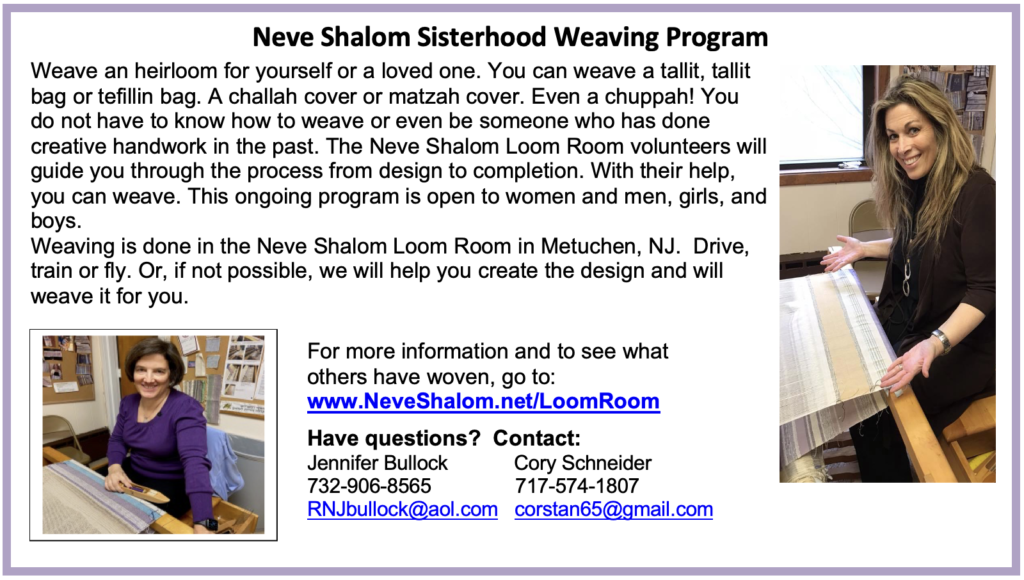
There is also a Women’s League Hiddur Mitzvah Google Group. If you want to join the group, please email Esta Lichtenstein, WLCJ Communications Chair at elichtenstein@wlcj.org to be added.
Shabbat Shalom,
Cory Schneider
WLCJ Archives Chair and Past International President
cschneider@wlcj.org
March 2, 2024 | 22nd of Adar I, 5784
By Julia Loeb, WLCJ International President

From Brokenness to Strength — Reflections from Parashat Ki Tisa and October 7
In Parashat Ki Tisa, we read of the golden calf, and of Moses smashing the two tablets when seeing the people dancing around and praying to the idol. But, even in that tragic moment, Moses does not give up hope for the Jewish people. He insists that God, after punishing the instigators, forgive the Jewish people. God does forgive, and Moses ascends the mountain to receive a set of new tablets written by God. Moses sings the praises of God’s mercy—the 13 attributes we say repeatedly on the High Holidays and throughout the year.
The duality of the highs and lows of this parashah speaks strongly to me this week, as I have just returned from Israel on a mission representing Women’s League with the Conference of Presidents of Major American Jewish Organizations. In Israel I had the privilege of meeting with Aviva Siegel who was kidnapped from Kfar Aza by Hamas and released after 51 days in captivity. Her husband, Keith, continues to be held by Hamas. We also met with soldiers, politicians, and evacuees from the South, and now the North, who are refugees in their own country. We met with first responders who witnessed the results of the horrific attacks and residents from the Kibbutzim that were destroyed. In Israel, you cannot escape the overwhelming tragedies of October 7 and its aftermath. It is simply heartbreaking. At the same time, the pervasive resilience of the Israeli people is breathtaking.


(left to right) Shir Siegel and Aviva Siegel Photo of Kibbutz Nir Oz after October 7
At our Shabbaton, Rabbi Ellen Wolintz-Fields taught about a Talmudic phrase, eilu v’eilu divrei Elohim Chayim—both these and those are the words of the Living God. This phrase is used to describe two seemingly incompatible concepts, which nonetheless exist together. That is how I felt in Israel, seeing the memorial to the 360 people killed on the grounds of the Nova Music Festival, hearing artillery shells in Gaza and drones flying overhead as we said the El Malei Rachamim prayer, and seeing the destruction at Kibbutz Nir Oz. Eilu v’eilu— signs of death, and the pervasive strains and dangers of war were everywhere, but at the same time I experienced great pride and joy as I learned about the bravery and strength of our brothers and sisters in Israel.
In Israel, instead of Trauma Centers they have Resilience Centers. That to me was very telling. The people are committed and unified to carry on, to not let this event define them, and to never allow such an attack to ever happen again. The country has suffered a devastating blow, but the way the Israeli people step up for one another, the way they give of themselves, and their resilience is what defines them in my eyes (and not the tragedy they suffered).


Re’im—Site of the Nova Music Festival
No better example of that resilience is Corporal Ori Megidish. She was captured by Hamas on October 7, and held in dark tunnels for 23 days, fearing for her life and suffering unimaginable trauma. On Monday of this week, she announced that she was returning to duty in the army’s Intelligence Directorate.
We were all shattered on October 7. But like the shattering of the two tablets in this week’s Torah portion, that day did not end the story. The Torah says that the shattered tablets were to be kept together with the whole second set of the Ten Commandments in the ark of the covenant. It was done so as a reminder to the people that surviving a crisis can bring unity and strength. The Israelites carried those shattered tablets around with them through the desert and into the Promised Land and established a nation there, flowing with milk and honey.
And today, we all carry the shattered parts of own hearts from October 7. That brokenness will never fully go away, but the Israeli people have shown us the importance of strength and resilience and the true meaning of Am Israel Chai.
Shabbat Shalom,
Julia Loeb
WLCJ International President
jloeb@wlcj.org
February 24, 2024 | 15th of Adar I, 5784
By Wendy J. Glasser, WLCJ Convention Logistics Chair and North by Northwest Region Past President
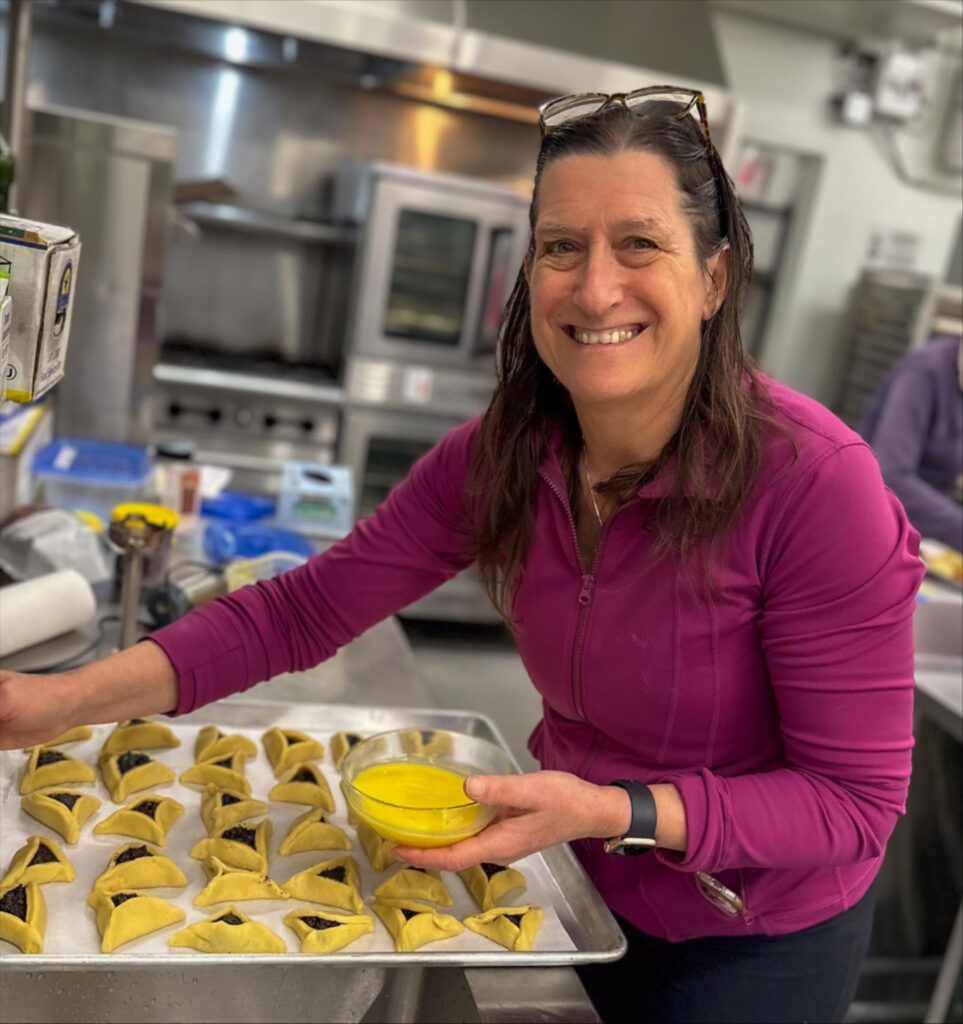 One Time, One Chance
One Time, One Chance
This week’s parashah begins with God telling Moses to tell the Israelites to make olive oil for a lamp in front of the ark that will burn eternally. Then it transitions to appointing Aaron and his sons to be the priests responsible for maintaining the light above the ark and to be the representatives of the Israelites in Temple matters. Moses is now the municipal leader, God’s representative via the courts, water, food, routes through the desert, etc. But Aaron and his sons are now the spiritual leaders, representing the people to God.
Immediately following this appointment, God tells Moses how the priests must be clothed. It then goes on for pages of the Chumash describing the clothes that must be made for and worn by the priests. A simple explanation for this would be that the clothes are to elevate the priests in the eyes of the people and set them apart. However, these clothes are only worn while the priests are acting in their role of priests. All other times they dress like all the other Israelites, so if the priestly garments are not to elevate and create a class of priests that are above the general populous at all times, why have such elaborate clothing while serving in the Mishkan and later the Temple service?
I have been studying the Japanese Tea Ceremony for 25 years. The Tea Ceremony was developed by Buddhist monks; even so, it is not a religious ceremony but a spiritual practice. When doing Tea, I put on a kimono. Putting on a kimono correctly is an intricate process that takes time and focus; I then bring that focus with me into the Tea Room to practice my Tea Ceremony. It is the focus and intention given to the actions of the Tea Ceremony that helps find the inner balance of the spiritual moment. I believe that one of the reasons for the priests dressing in the extremely complex robes before going into the Mishkan was to focus their attention and their intent on the service they were to perform.
In Zen there is a saying: “One Time, One Chance.” It means that you need to be in the moment to experience it. Even if you have done something a million times, this time will always be different. You are different. Is this why Jacob had the moment when he said, “God was in this place and I did not know it”? Was he finally in the moment and experiencing God’s presence in the world?
This phrase applies to everything we do. Do we focus on the prayers we say in synagogue and at home or do we just recite the prayers in the siddur and complain that there is no spirituality in the service? When we are with our family and friends, are we there with intent and attention or are we thinking about what we are going to say, or what else there is to do? How many times did we miss our “God was in this place and we did not know it” moment? And how do we gain the focus that the light in the Mishkan and the priestly garments are trying to show us? The rabbis tell us to say a blessing for every event in our life. I believe that is the rabbis showing us “One Time, One Chance.”
Shabbat Shalom
Wendy J. Glasser
WLCJ Convention Logistics Chair and North by Northwest Region Past President
wglasser@wlcj.org
February 17, 2024 | 8th of Adar I, 5784
By Mindy Steinholz, WLCJ Finance Chair and MetroNorth Region Past President
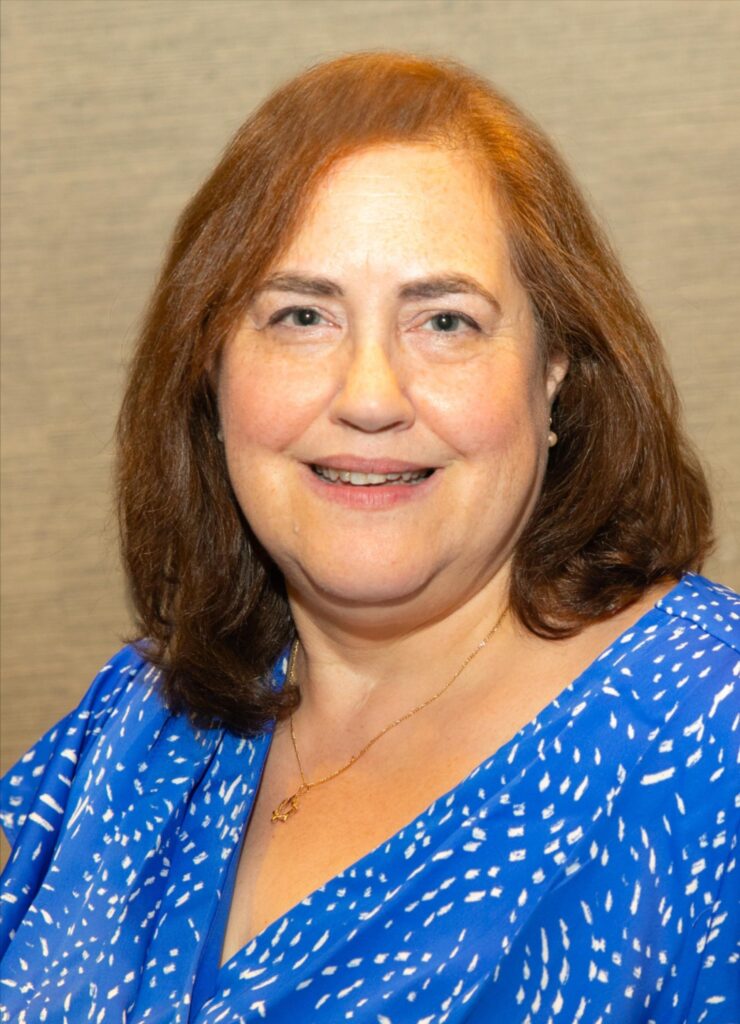 “Make for yourself a teacher, acquire for yourself a friend.” (Pirkei Avot 1:6)
“Make for yourself a teacher, acquire for yourself a friend.” (Pirkei Avot 1:6)
When I became a Bat Mitzvah in the late 1970s (so late it was practically the 1980s), my family’s Conservative congregation was not yet egalitarian, though the Movement itself was in the midst of change. I don’t think any of the other Conservative congregations in our area were egalitarian at that time either. In fact, some were so traditional that girls were not even allowed to stand on the bimah for their Bat Mitzvah service. However, the girls in the local Reform congregations were called to the Torah at their Bat Mitzvah services. I also remember that none of the Bar/Bat Mitzvah children in either Movement, at any of the many services I attended, actually read from the Torah. Boys always had an aliyah; Reform girls did too. Many of us chanted a Haftarah (even some of us Friday night girls).
Within the year, my congregation voted to become egalitarian. With that change, I began to be called to the Torah for an aliyah. I never took having an aliyah for granted but I also never thought about reading from the Torah myself. It was something that the rabbi or the cantor did. I did not connect this skill with something a layperson could do. Or could learn to do.
Fast forward a couple of decades and I joined my current synagogue as an adult with a family. And I saw Bar/Bat Mitzvah children read Torah. I saw many parents read it too. I saw lay readers on other occasions. I attended Sisterhood Shabbat services and saw women older than me read Torah. When my daughter began to study for her Bat Mitzvah, I decided I would like to read Torah on that occasion as well, in her honor. Our synagogue Bat Mitzvah tutor, Alice Krochmal z’l, agreed to work with me. Then she kept working with me for Sisterhood Shabbat services and other occasions over the years, always listening when I said “give me a short one!” I also had the opportunity to read Torah at other Sisterhoods during my term as MetroNorth Region President.
My rabbi, Dana Bogatz, has been teaching me Biblical Hebrew for years. She is endlessly patient when I mess up my vowels and other letters (which I do, often). She has worked with me so I have been able to read Torah for my nieces’ and my nephew’s Bat/Bar Mitzvah services, for Sisterhood Shabbat, on other Shabbatot, and even on Rosh Hashanah as well. This week, which is Parashah Terumah, I will be one of the Torah readers while she takes some well-deserved family time. As I began to work on this Shabbat message, I was still early in my preparation process. I doubt I will ever be able to just read on a moment’s notice – it usually takes me weeks and multiple resources to prepare.
When I do stand on the bimah and read from the Torah, I use the yad my parents gave me as a birthday gift several years ago. I am also equipped with the lessons from my friends and teachers Alice and Rabbi Dana, the examples of other women I have watched do the same, and the knowledge that the evolving egalitarian Conservative Movement has enabled me to do things I once thought I never would. My wish for you is the chance to do those things (whatever they may be) that you once thought you would never do.
In memory of Alice Krochmal, z’l
In honor of Rabbi Dana Bogatz
Shabbat Shalom,
Mindy Steinholz
WLCJ Finance Chair / MetroNorth Region Past President
msteinholz@wlcj.org
February 10, 2024 | 1st of Adar I, 5784
By Esta Z. Lichtenstein, WLCJ International Vice President and Communications Chair
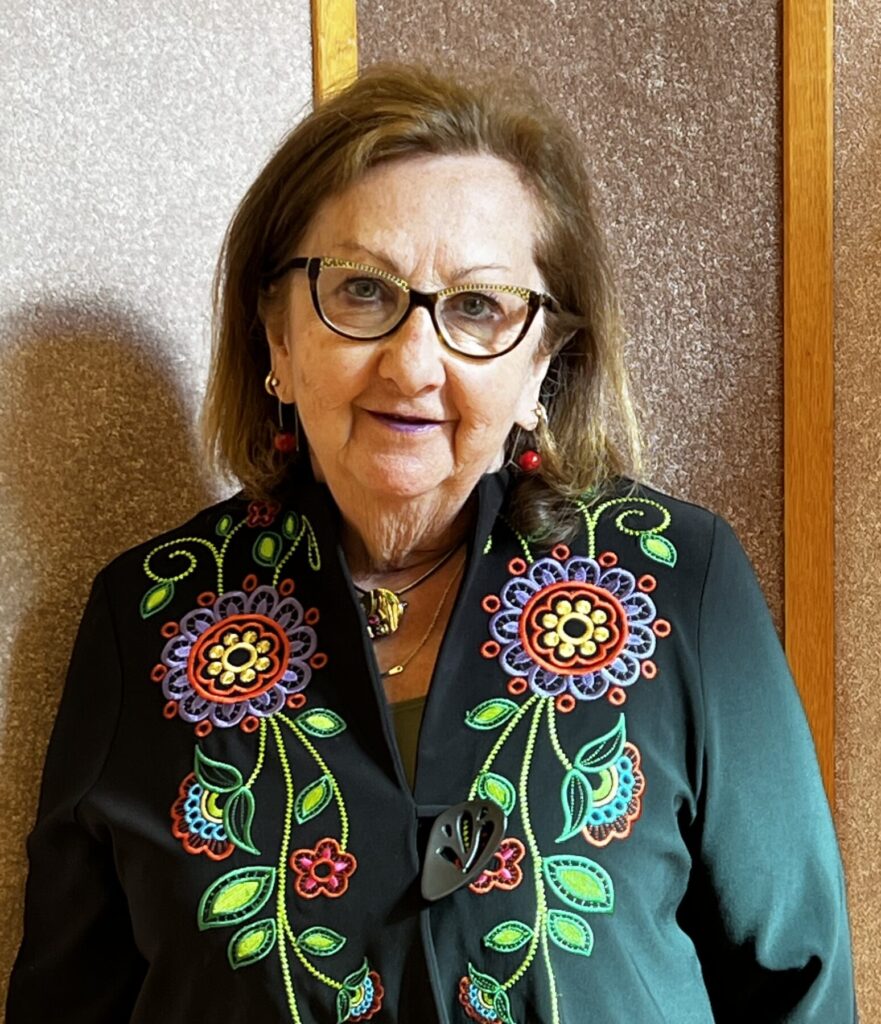 WLCJ: Where Friendship Blossoms into Unforgettable Adventures
WLCJ: Where Friendship Blossoms into Unforgettable Adventures
What does WLCJ mean to me? It is most definitely about the relationships one builds. While in New York City for Torah Fund training in 2015 Cathy Swerdlow and I hoofed it through Central Park to the Neue Galerie to see the Woman in Gold exhibition. Who knew that I was going to make a spur of the moment decision and go with someone that I did not even know? And wearing heels, no less! Oh, the blisters on my feet. I actually had to purchase a pair of flats to wear for the remainder of our training. We trained together, ate all our meals together and learned not only about Torah Fund, but about each other as well.
Some of us ladies stayed together and later became Region Presidents. We are now on six years together. Anise Parnes, from Brooklyn, Queens, & Long Island Region (BQLI), Joan Lowenstein, from International Northeast Region (INR), and myself from North Atlantic Region (NAR), all became close friends. We met for lunch in Albany, N.Y., which was a locale that was equidistant for each of us. We brought our husbands (we call them the Tag-alongs, a term coined by Anise) and luckily (and surprisingly) they also got along well. We chose to add some culture into our trips and each of us did research and found some interesting sites.
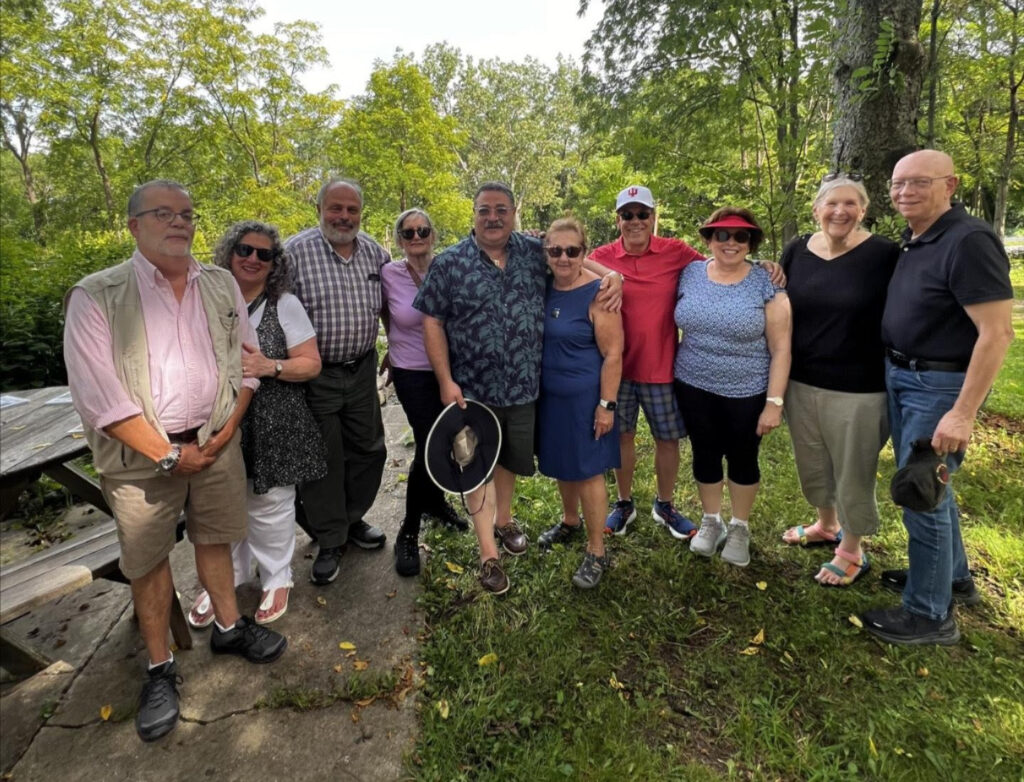
Photo taken at the Black Squirrel Farms in Penn Yan, NY | (left to right) Lon and Joan Lowenstein, Phil and Anise Parnes, Barry and Esta Lichtenstein, Mark and Lori Snow, and Fran and Tom Hildebrandt
We are now past presidents (we call ourselves the IPP’s) and our ranks have grown to include Fran Hildebrandt from Central Great Lakes Region (CGLR) and Lori Snow from Mid-Atlantic Region (MAR). We met in the Western Massachusetts area known as the Berkshires and had a wonderful weekend where we did many things together and some things separately. Local culture and historical sites are always fun. Just chat with some of the ladies that you have met over the years and plan an adventure together. Even if you live in different states, you can make it work. We share WLCJ in common but we also like fine dining, culture, ice cream and theater. So many options. See if any of these women have children and/or grandchildren where you live, and meet up with the women when they are visiting their family members.
We have gone on a couple of small vacations as a group. People usually ask us about our group and we always boast about WLCJ and explain about our amazing organization!
We’ve gone to Cleveland to the Rock & Roll Hall of Fame Museum along with an incredible art museum and zoo; visits to NYC, taking in shows and of course, Serendipity for ice cream. Check it out. Last year we met in upstate New York and went to various sights including Olana State Historic site and the Empire State Aero Sciences Museum.
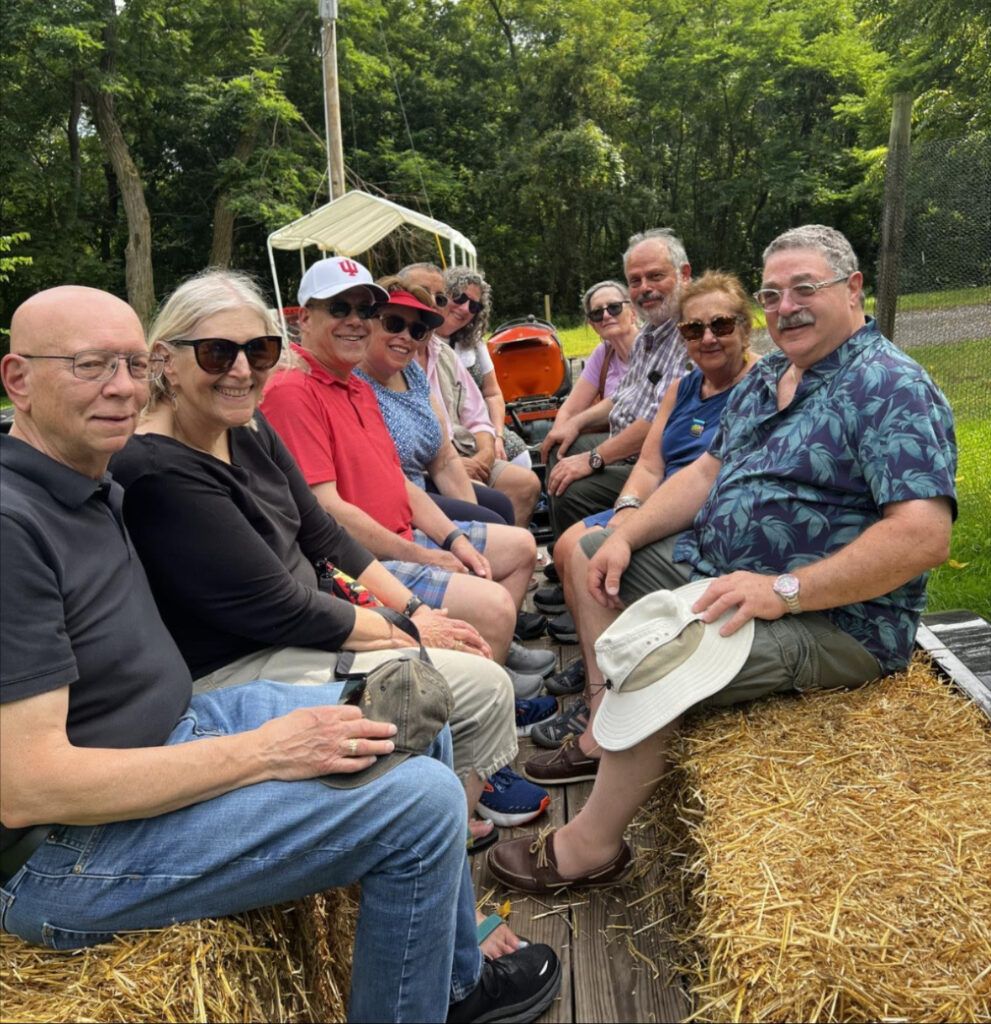
Photo taken at the Black Squirrel Farms in Penn Yan, NY | (left to right) Lon and Joan Lowenstein, Phil and Anise Parnes, Barry and Esta Lichtenstein, Mark and Lori Snow, and Fran and Tom Hildebrandt
This past summer we went on the best trip yet. We stayed at a wonderful B+B in Penn Yan, in the Finger Lakes area of upstate New York. Our hosts provided breakfast each morning with fruits from their garden. The trip included day trips to various local sights. We went to the Corning Glass Museum, a black walnut farm and various local vineyards. Dinners at eateries that provided the taste of the area, and of course, we ended our evenings at ice cream shops.
One of the highlights of the trip, for me, was going to a local Amish farmers market. The produce was truly remarkable with broccoli and cauliflower the size of basketballs, tomatoes the size of melons and dozens of other items and craft products, all done with the flair of the area. I only wished that I could have brought some of that amazing produce home.
Reach out to any of us and we will be glad to collaborate with you! As we begin to plan our trip for summer of 2024, we wish that all of you find an additional connection with your WLCJ Sisters and plan a road trip. Or, even a destination you can fly to, like the ladies who meet in Florida!
Shabbat Shalom,
Esta Z. Lichtenstein
WLCJ International Vice President and Communications Chair
elichtenstein@wlcj.org
February 3, 2024 | 24th of Shevat, 5784
By Julia Loeb, WLCJ International President
 The Stranger Among Us
The Stranger Among Us
I’ve been thinking a lot about strangers lately. Maybe it is because we are reading the Exodus story where the prophesy made to Abraham–that his descendants will be strangers in a foreign land–has been fulfilled. Now the Israelites have crossed the Reed Sea and are standing at the foot of Sinai to receive the Torah. Next week we read Mishpatim where one of the laws enumerated is that we should not “ill-treat a stranger or oppress him for [we] were strangers in Egypt.” Or maybe it is because the news is filled concerns about “strangers” here in the U.S. and abroad (including about those who want to treat Jews as strangers who do not belong in Israel).
I wanted to share two stories that I read recently about how to treat and respect those oft-ignored strangers in our everyday lives. The first is from Rabbi Jonathan Sacks z’’l, the former Chief Rabbi of Great Britain. He tells of how he often hosted dinner parties for dignitaries within and outside the Jewish community. At the end of the dinners, the guests often came up to him and his wife to thank their hosts, but one guest asked to be allowed to go into the kitchen to thank those who made and served his meal. This guest was John Major, a former British Prime Minister.
The second story comes from Walter Bettinger, CEO of Charles Schwab. He talks about one of the important lessons he learned in a business strategy course in college. He had spent many hours studying for the final exam so that he could maintain his 4.0 average. When he arrived at the exam, the professor handed out a single piece of paper face down. When they were allowed to do so, the students turned the paper over. The other side was blank too. The professor said, “I’ve taught you everything I can teach you about business in the last 10 weeks, but the most important message, the most important question, is this: What’s the name of the lady who cleans this building?”
This was the only exam Mr. Bettinger ever failed. The name of the cleaning woman was Dottie. He had seen her many times but had never taken the time to ask her name. He concludes his story with the lesson he learned: “It was just a great reminder of what really matters in life, and that you should never lose sight of people who do the real work.”
Are there any “Dotties” in your community, your Sisterhood? Do you know the name of the custodian or security guard at your synagogue? The barista at Starbucks who serves you coffee? The woman who comes to Shabbat services and sits by herself in the last row? Often, as the saying goes, strangers are just friends you haven’t met yet.
I have been traveling the past few weeks and have met with members of our Sisterhood affiliates in Massachusetts and Connecticut and the East and West coasts of Florida. At each stop, I met many women whom I had never met before, but then became friends. Each stop involved much planning and organization and I so appreciate all the dedicated, kind women who made that happen.
On Sunday afternoon, 27 Women’s League members walked into B’nai Torah Congregation in Boca Raton, Florida for our first Leadership Institute in four years. Many of them were strangers at the beginning, but by the time they left on Tuesday, they had a strong bond and were planning how to stay connected and when they could see each other again.
Strangers are just friends you haven’t met yet.
Take some time this week to get to know some of these people that you see every day who work hard to make your life easier and take some time to make a friend out of a stranger.
Shabbat Shalom!
Julia Loeb
WLCJ International President
jloeb@wlcj.org
January 20, 2024 | 10th of Shevat, 5784
By Julia Loeb, WLCJ International President
 From Fear to Hope – A Journey Across the Narrow Bridge
From Fear to Hope – A Journey Across the Narrow Bridge
I have been hearing a popular Jewish song a lot lately since the Hamas attacks on Israel: Kol haolam kulo gesher tzar meod, veha-ikar lo lefached klal – the whole world is a very narrow bridge, but the main thing is to have no fear at all.
This song has become a rallying cry at vigils and all types of services. At the Conservative Movement Convening in December, the USYers there sang it over and over again, each time louder, faster and more enthusiastically. This song, based on a teaching from Rebbe Nachman of Breslov seems, on the face of it, to be upbeat and encouraging, but is it realistic to have no fear at all? After all fight or flight is a basic human instinct.
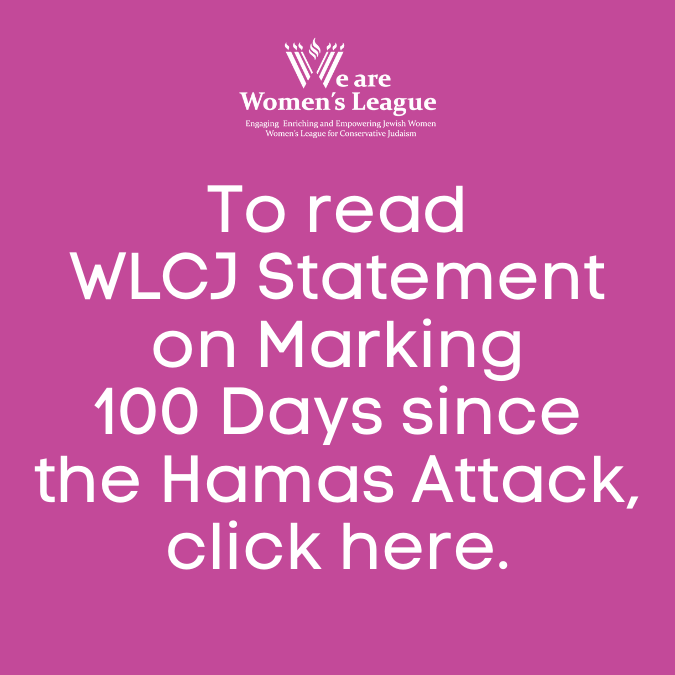 These are the cold, dark days of winter. We see dangerous antisemitism on the rise. We just marked 100 days since Hamas attacked Israel and kidnapped hostages, and Israel is charged with genocide in the United Nations International Court of Justice (where Israel’s warning civilians of attacks and guiding them to safe zones was unbelievably used as evidence of genocidal intent). How can we have no fear at all when so many dark clouds loom around us?
These are the cold, dark days of winter. We see dangerous antisemitism on the rise. We just marked 100 days since Hamas attacked Israel and kidnapped hostages, and Israel is charged with genocide in the United Nations International Court of Justice (where Israel’s warning civilians of attacks and guiding them to safe zones was unbelievably used as evidence of genocidal intent). How can we have no fear at all when so many dark clouds loom around us?
I recently learned that the song alters Rebbe Nachman’s quote. His actual quote is “…v’ha-ikar lo l’hit-pached klal.” Instead of lo lefached klal, to have no fear at all, Rabbi Nachman uses the reflexive form of the verb lo l’hit-pached klal. Its meaning is similar, but not identical. Rabbi Nachman’s message is not that we shouldn’t fear at all, but that we shouldn’t be consumed, or paralyzed by our fear. Even though the bridge is narrow, it represents the way forward, a way to continue the journey, instead of turning back in fear.
Overcoming our fear, along with hope, faith, and determination are essential elements of who we are. It is no accident that the Israeli national anthem is Hatikvah, meaning “The Hope.”
Even among the dark clouds, there are reasons for hope and pride. We are not letting our fears overcome us. The Jewish people are donating to Israeli and Jewish organizations in record numbers. In Israel, brave soldiers risk their lives to defeat Hamas and to gain return of the kidnapped victims. Everyday Israelis are supporting one another. The level of care and support in Israel for those displaced by the Hamas attack and the war is simply inspiring.
Eleanor Roosevelt said that we should do one thing that scares us every day. If we do not succumb to it, fear can be a powerful motivator. It motivates many of us to contribute our time and resources to efforts in Israel. It motivates others to push back against antisemitism by wearing a Magen David in public or flying an Israeli flag outside your home. And in Women’s League, I see women push past their fears and take on new challenges and leadership roles, whether it’s accepting a position on your Sisterhood affiliate or Region Board when a member of the nominating committee calls, or leading part of the service for Women’s League Shabbat.
Rabbi Abraham Joshua Heschel observed that it is our fate, as in the many generations before us, to cross that narrow bridge, to preserve and secure the continuity of the Jewish people and to “give new life to our traditions.” Conservative Judaism has always focused on tradition and change, and as we move forward, Women’s League will be there as your voice. As I meet more and more Women’s League members across the country, my hope and confidence in our future grows. I am energized by the passion and the strength of our community. Together, we are walking across the narrow bridge, keeping ourselves from being overcome by fear, and working towards a better tomorrow.
Shabbat Shalom!
Julia Loeb
WLCJ International President
jloeb@wlcj.org
January 6, 2024 | 25th of Tevet, 5784
By Julia Loeb, WLCJ International President
 Embracing Renewal and Reflection in the Light of the New Year
Embracing Renewal and Reflection in the Light of the New Year
This week, as we step into the new secular year, many of us will use this time for deep reflection and renewal. The shortest day has passed —Shabbat in Washington, D.C. already starts five minutes later than last week — and slowly, the light increases, reminding us of the endless cycle of growth and rebirth. It’s a perfect moment to talk about resolutions and self-care, especially in the context of our Jewish traditions and this week’s Parashah.
Shemot, the first Parashah in the book of Exodus, marks a significant transition. It’s a story of a new beginning, much like our New Year’s resolutions. It speaks of the Israelites’ journey from oppression to liberation and prompts us to consider our personal journeys and how we can improve ourselves in the coming year.
In this context, let’s think of our resolutions not just as goals or tasks, but as steps toward personal growth. This is a good opportunity to take a step back and examine challenges that we face. It could be stress and how we react to it, or perhaps we often neglect our own needs while caring for others. This year let’s commit to overcoming these difficulties.
For me, self-care is a crucial aspect of this journey. It’s often overlooked, but taking care of ourselves enables us to better care for others. As Jewish women, we often juggle roles in our families, communities, and professions. It’s easy to forget that to nurture others effectively, we must first nurture ourselves.
Incorporating self-care into our daily lives is essential. It could be something as simple as meditating, taking a few minutes each day to breathe deeply, or engaging in a hobby that brings us joy. Remember, self-care isn’t selfish; it’s fundamental to our well-being, and allows us to be a better friend, spouse, parent, and colleague.
The winter solstice is a reminder of the power of light and the importance of patience. Just as the days slowly become brighter, our efforts towards self-improvement and care will gradually illuminate our lives. It teaches us that growth is an incremental process, and that’s okay.
As we embark on this new year, let’s embrace the lessons from Shemot. Let’s embrace change and be courageous in overcoming our fears, insecurities, or old habits. Let’s be like Moses, who, despite his initial reluctance, rose to lead and embrace his role in the liberation of his people. We too can lead and inspire in our own lives, in big and small ways.
 Later this month, 25 women will move forward on their personal journeys at the first Women’s League Leadership Institute in four years. The training in this program has been instrumental to the growth and development of so many women. I cannot recommend it highly enough. There is still space available if you would like to make that choice for yourself and join us.
Later this month, 25 women will move forward on their personal journeys at the first Women’s League Leadership Institute in four years. The training in this program has been instrumental to the growth and development of so many women. I cannot recommend it highly enough. There is still space available if you would like to make that choice for yourself and join us.
I wish all of you strength, patience, and light in all your endeavors. May your resolutions carry you forward and may your self-care practices fill you with renewed energy and joy. Here’s to a year of growth, learning, radiance, and peace!
Shabbat Shalom and Happy New Year!
Julia Loeb
WLCJ International President
jloeb@wlcj.org
December 23, 2023 | 11th of Tevet, 5784
By Florence G. Wolpoff, WLCJ United Nations Non-Governmental Orgnization (NGO) Representative
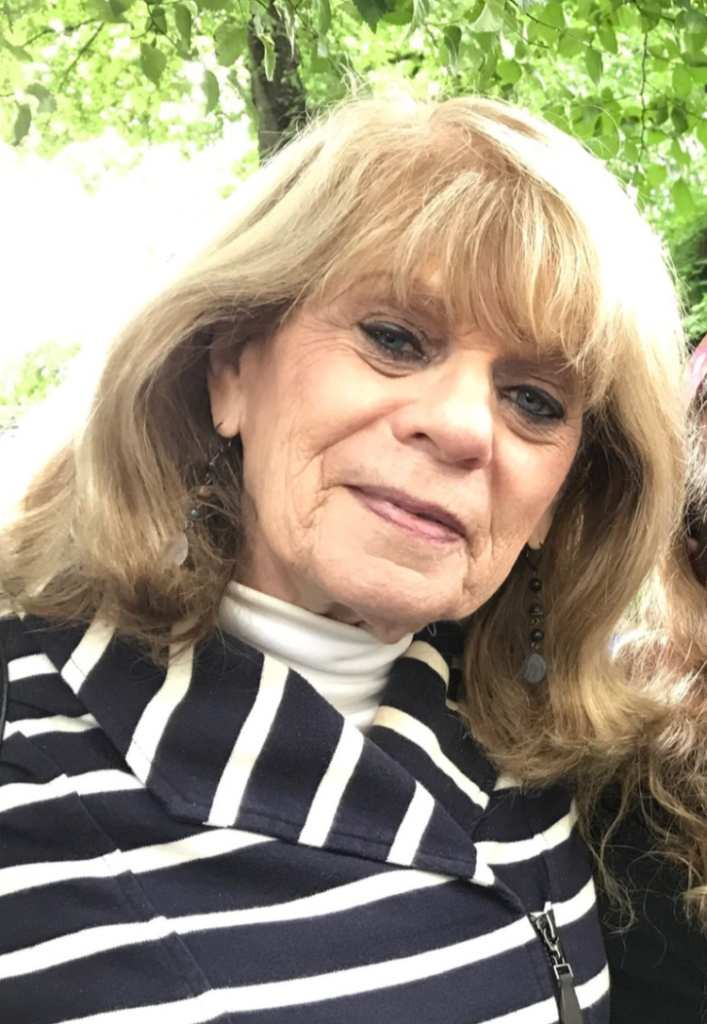 Breaking the Silence: Women’s League Advocates for Justice Amidst United Nations Indifference
Breaking the Silence: Women’s League Advocates for Justice Amidst United Nations Indifference
From Julia Loeb, WLCJ International President — In light of Women’s League’s statement against Hamas’ violence toward Israeli women that we issued last week, I asked Florence Wolpoff to share her reports of her experience at the UN sessions on the war in Israel and the sexual violence against Israeli women. Note: Some of the testimony that Florence includes in her report here is graphic.
As one of Women’s League’s NGO representatives to the United Nations, I have been privileged to attend meetings of the Security Council, the General Assembly, and special sessions. When I have been unable to attend in person, I have been glued to my computer watching very painful presentations by various member countries. For the most part, the speeches have been condemnations of Israel. For too many of them, October 7th never happened, and Hamas is blameless.
As was stated by renowned sociologist and former United States Senator from the State of New York, the late Daniel Patrick Moynihan, “You are entitled to your opinion. But you are not entitled to your own facts.” But it appears that in contemporary society, we have been exposed at the UN to examples of competing “facts,” half-truths and outright lies.
On November 20th, 2023, the Israeli Mission to the United Nations provided an update on the situation in Israel. Ambassador Gilad Erdan opened the meeting saying, “This event is taking place so we can comprehend the evil of this war situation.” He asked the following questions, “How come the UN has not condemned Hamas?” He then asked the audience, “What would you do if you were in Israel’s situation?” And added, “We will not fail, we must win because of humanity.”
Attendees were then asked to hand in their cell phones as we sat for 47 minutes watching the footage taken by Hamas invaders as they killed, raped, mutilated Israelis. While several people felt the need to leave the room, I sat in horror. While the Nazis hid most of what they were doing and many in the world did not want to believe the magnitude of what was happening, here Hamas was bragging. The Hamas charter calls for the total destruction of Israel and all things Jewish. However, yet again, the world seems to be blind to the very horror many have witnessed via Hamas tapes and Israeli eyewitness accounts.
On December 4th, 2023, the Israeli mission at the United Nations sponsored another session, “HEAR OUR VOICES.” The session focused on the sexual assaults perpetrated by Hamas on October 7th, 2023. The Israeli Ambassador to the United Nations offered the opening remarks. He said, “This was planned to clear Jews out of Israel. Hamas views Israel as vermin.” At this session, Kirsten Gillibrand, United States Senator from the State of New York (in person) and former Secretary of State Hillary Clinton (via video) decried how many women’s groups, just like the UN itself, have remained absolutely silent. As a follow-up, Senator Gillibrand reaffirmed the need to give voice to the Israeli women who were raped and whose bodies were mutilated. She went on to say, “When I saw the list of women’s groups that said nothing, I nearly choked. We must demand that the actual videos be shown. If they refuse, I demand it.”
At that session, three Israelis offered eyewitness accounts – Shari Mendez, a member of the Israeli morgue staff whose job is to identify and prepare women’s bodies for burial, Yael Richert, chief superintendent with the Israeli national police. and Simcha Greinman, an emergency medical worker with Zaka. The speakers told of mutilated corpses, broken pelvic bones from repeated rapes, the inability sometimes to determine gender due to mutilation and the need to vacate rooms when live grenades were found buried in women’s private parts.
At the meeting of the Security Council on December 8th, 2023, Secretary General António Guterres put forth a resolution calling for an Israeli Hamas ceasefire for humanitarian causes. The United States invoked its veto power. The US did not support the resolution because the UN refused to condemn Hamas or call for the release of all hostages. The US knows that Hamas does not want a two-state solution.
On December 12, 2023, the General Assembly met again to present Secretary General António Guterres’ resolution calling for a humanitarian ceasefire. The vote was 153 nations in favor of the resolution, ten voting “No,” with 23 abstentions. A vote in the General Assembly is nonbinding.
As members of Women’s League, can we remain silent? In addition to speaking on behalf of women’s rights, we must be the voice of those who can no longer be heard. We must also become teachers of the uneducated, telling them why Israel exists and why Israel cannot endure a one-sided ceasefire. As members of Women’s League, we cannot remain silent.
Florence G. Wolpoff
WLCJ United Nations Non-Governmental Organization Representative
florence.wolpoff@verizon.net
Read → WLCJ Statement on Hamas’ Violence against Israeli Women
December 9, 2023 | 26th of Kislev, 5784
By Julia Loeb, WLCJ International President
 Illuminating Hanukkah
Illuminating Hanukkah
It’s the beginning of December, and it’s hard to ignore the overwhelming focus on Christmas here in the United States. From the dazzling light displays on neighboring houses to the jolly inflatables of Santa, the ubiquitous red and green decorations, and the incessant carols transforming into unavoidable earworms at every shopping mall, it is nearly impossible to escape it. What’s more, the commercial landscape is increasingly adorned with endeavors to assimilate Hanukkah into the Christmas narrative – blue and white lights on a Hanukkah bush, gingerbread Hanukkiyot kits, the substitution of Secret Santas for Mysterious Maccabees, and the Jewish Elf on the Shelf, endearingly named Mensch on the Bench, because nothing says Jewish holiday spirit quite like a miniature bearded man spying on your children. As I step outside, the reminder is stark – I live in a predominantly Christian country. Yet, my heart and mind remain steadfastly focused on Israel.
A friend once asked how the modest Hanukkah candles at home could compete with all the decorations in the outside world. My response was unequivocal – they don’t have to. Hanukkah, a distinctively different and religiously minor holiday, holds profound significance. After candle-lighting, we traditionally sing “Haneirot Halalu/We Kindle These Lights,” emphasizing the remembrance of divine acts, miracles, and wonders. It’s as if the glow of the Hanukkiah possesses the power to forge a connection with ancestors who lived through and directly benefited from these miracles. We align ourselves with heroes of a bygone era who defiantly chose not to assimilate but to proudly be themselves. This year, in our home, we will acknowledge those fighting in Israel once again for our freedom and for the right to exist. In lighting the candles, we also traverse the generations of Jews who, even in arduous circumstances, have faithfully lit candles each year, and we reconnect with our own past – years of celebrating Hanukkah with my own family.
Curious about the lasting impact of these traditions, I queried my adult children about their Hanukkah memories. Their recollections paint a picture of cherished moments – latke-making marathons with their grandmother, readings of perennial favorites like “Herschel and the Hanukkah Goblins,” spirited dreidel games for chocolate gelt, the traditional photo in front of the Hanukkiyot, and off-key singing of Hanukkah songs to tapes and CDs. Surprisingly, one memory stood out – the annual dedication of one night of Hanukkah to helping others. As a family, we would sit down, choose a charity to support, or volunteer for a local nonprofit. Strikingly absent from their recollections were mentions of material gifts – a testament to the enduring impact of the spirit of giving.
Hanukkah imparts valuable lessons, notably that hope and faith can empower even the seemingly weak and few. Lavish displays are unnecessary; we begin by lighting one candle. Hanukkah, meaning dedication in Hebrew, serves as a reminder to rededicate ourselves to upholding the flame of Judaism, preserving Jewish culture and its traditions for future generations. In a world shrouded in both literal and figurative darkness, the adage “A little bit of light dispels a lot of darkness” rings especially true. Despite the challenges of the past two months, our collective efforts, donations to causes in Israel, and the resilience of the Israeli people volunteering to address the aftermath of war, have kindled a brighter flame to “dispel the darkness.”
I reflected on this as I returned Tuesday from the Conservative/Masorti Convening in Baltimore, Maryland, after spending four days with Jews from across North America. Despite gloomy predictions, the flame of the Conservative/Masorti Movement burns brightly, giving us much cause for hope in these dark times.
May this holiday season bring not only an abundance of light, joy, and cherished memories but also a renewed sense of hope.
Happy Hanukkah and Shabbat Shalom!
Julia Loeb
WLCJ International President
jloeb@wlcj.org
November 25, 2023 | 12th of Kislev, 5784
By Julia Loeb, WLCJ International President
 Thanksgiving
Thanksgiving
This week’s Torah portion, Vayetzei, begins with the account of Jacob’s dream featuring a ladder ascending to the heavens, with angels traversing up and down. God speaks to Jacob, reiterating the promises of the land of Canaan made to Abraham and Jacob, and bestows blessings upon Jacob and his descendants. Upon waking, Jacob says that the “Lord is present in this place, and I did not know it,” expressing surprise and being visibly moved by this realization.
Jacob’s awakening to God’s presence and the blessings bestowed upon him resonates with the universal need to pause, reflect, and appreciate the blessings in our lives. As we approach Thanksgiving in the United States this week (and celebrated last month in Canada), we are reminded to take a step back and express thanks.
While Thanksgiving is a secular holiday, its essence aligns with Jewish traditions. Gathering with family, sharing a festive meal, and expressing gratitude are integral aspects of many Jewish holidays. Some Jewish families even incorporate Shir Ha’Maalot into the Grace After Meal Prayers, the Birkat Hamazon, on Thanksgiving, a practice typically reserved for Jewish holidays and Shabbat.
The connection to Thanksgiving is seemingly natural for Jews, given that the very name of our religion, Judaism, is rooted in gratitude. The term “Jew” or “Yehudi” originates from the word meaning “to thank” or “to express gratitude.” The Torah says that when Leah gives birth to a fourth son, she was overwhelmed with a sense of thanksgiving. Rashi comments that Leah did not expect to have a fourth child. She felt that she has been given “more than [her] share, so [she] now need[s] to give thanks.” She names her son Judah, to express her thankfulness. So, being Jewish inherently requires us to be thankful. Such gratitude is deeply ingrained in Jewish culture, traditions, and prayers. Indeed, the words of the very first morning prayer “Modeh Ani Lefanecha,” reflect gratitude for the restoration of the soul and the gift of life.
It is not only the Thanks part of Thanksgiving that is Jewish, but also the Giving. It is said that Tzedakah is equivalent in value to all other mitzvot combined and holds the power to avert negative divine decrees. This year, consider a generous contribution to one of the many funds listed on the Women’s League website that are supporting Israeli relief efforts and, on Giving Tuesday, donate to support the Masorti Days of Study, honoring the memory of Professor Dr. Alice Shalvi, a trailblazing woman, educator, and a true friend of Women’s League. The Days of Study will be held virtually this year because of the war, and all our members are invited to attend.
On a personal note, on this holiday, I express gratitude for my family, my Women’s League sisters, and the dedicated individuals contributing to our collective efforts. Special appreciation goes to the Women’s League Executive Committee, Executive Director, staff, and the courageous IDF members safeguarding Israel and working to free hostages held by Hamas.
Wishing you a Shabbat Shalom and a joyous Thanksgiving with your loved ones.
Julia Loeb
WLCJ International President
jloeb@wlcj.org
November 18, 2023 | 5th of Kislev, 5784
By Rabbi Ellen S. Wolintz-Fields, WLCJ Executive Director
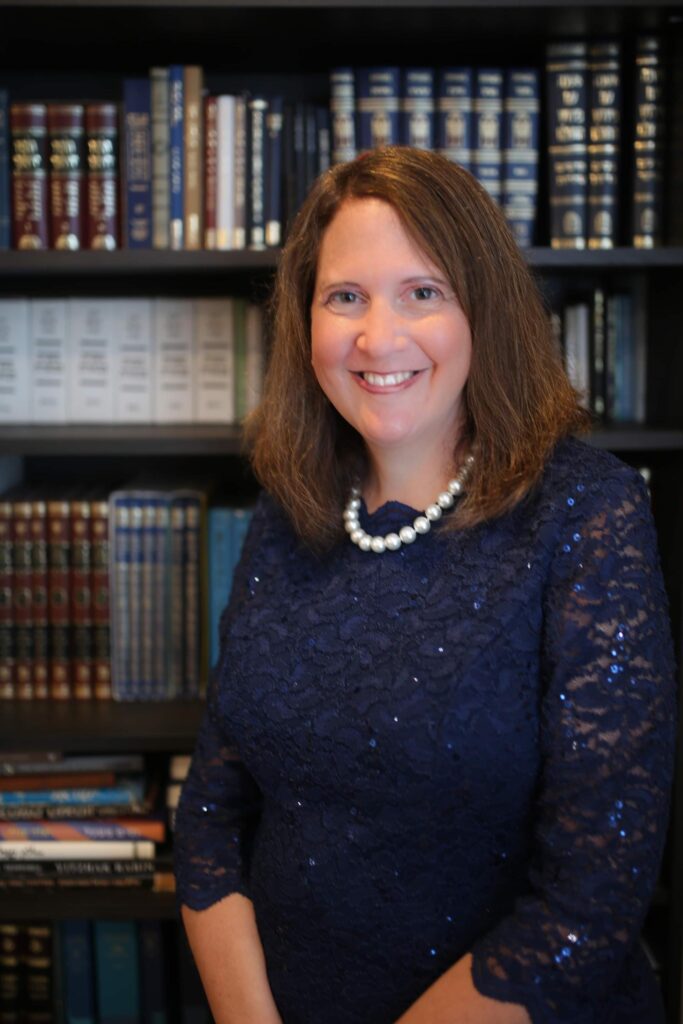 Reflections on Masorti Leadership Solidarity Mission to Israel
Reflections on Masorti Leadership Solidarity Mission to Israel
I was privileged and honored to be able to represent Women’s League for Conservative Judaism on a 56-hour Masorti Leadership Solidarity Mission to Israel, November 5 through November 8, 2023. In the Torah, in the verse Shema Yisrael Adonai Eloheinu, Adonai Echad, Hear O Israel, The Lord our God, the Lord is One, the last letter of the word Shema – the Ayin – and the last letter of the word Echad – the Dalet – are enlarged in the Torah. Together, Ayin Dalet, spells the word Eid, a Witness.
This was the shortest and most powerful of my 13 trips to Israel, because on this trip I was witness to the atrocities of Black Shabbat, October 7, 2023. I was able to be an eyewitness to the results of evil in our midst. I am the Eid, the Witness, and now I can share what others must hear, Shema.
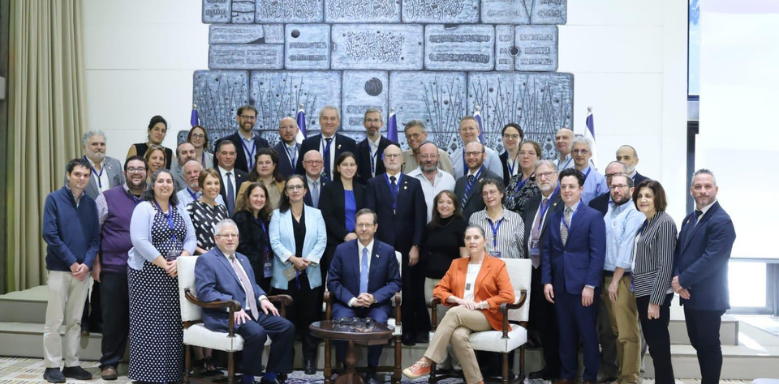 How did you feel in the middle of March 2020? Not sure what this whole Corona was all about? Was it the flu? Would it last? What are you talking about – wearing a mask? We will work remotely and go to school remotely for a few days? Then a month? Who knew, because it was unknown. We are back in that period of the unknown. But a major difference is that the COVID period of the unknown was caused by something that was not created by human beings. This period of the unknown is created by human beings. We are living in a period created by pure Evil.
How did you feel in the middle of March 2020? Not sure what this whole Corona was all about? Was it the flu? Would it last? What are you talking about – wearing a mask? We will work remotely and go to school remotely for a few days? Then a month? Who knew, because it was unknown. We are back in that period of the unknown. But a major difference is that the COVID period of the unknown was caused by something that was not created by human beings. This period of the unknown is created by human beings. We are living in a period created by pure Evil.
Israel became a new country after October 7, 2023. There is a paradigm shift. Nothing is what it used to be. I was always a dreamer. I am now a realist. Reality: many people who wanted to live in peace alongside Palestinians, instead lived beside terrorists, who murdered innocent civilians. People who devoted their lives for peaceful dialogue, died texting that they wished they had a knife in their safe room. I stood in the former homes of residents of Kfar Azza, and saw the bullet holes in the walls of their homes; their blood on the walls; their personal items thrown everywhere. Three groups came across the Gaza border – Hamas; Islamic Jihad and Palestinians who took this break in the border fence as an opportunity to steal and loot from their Jewish neighbors who were lying dead, with their blood still draining.
We heard firsthand about how Hamas did not only kill people, they also set booby traps on the bodies and in homes, so when the Israelis came to check on those killed, the rescuers were also killed. We listened to a mother talk of the plight of waiting to hear news about her daughter, who was seen in a video being pulled by her hair, being held captive by Hamas. We listened to a nurse, and mother of ten, who was at an army base on Black Shabbat, October 7th. Her husband was a rabbi on an army base in the south and was there to bring Simchat Torah to the soldiers. Instead she wound up tending to a soldier who was shot, and was tricked into thinking the other soldier who came to help was part of the IDF, but instead it was a Hamas terrorist, who shot the nurse in her back and arm. She used her head covering as a tourniquet. She shared her story with us when we visited Hadassah Hospital. We listened attentively to the woman who was on a crowded bus when a missile hit, but it was so crowded, no one could hear the sirens to warn them to go into a shelter. She had shrapnel in her leg, and was undergoing extensive physical therapy. But she was one of the lucky ones; better off than the murdered owners of the hundreds of cars we saw in a parking lot in Netivot; cars which were shot and demolished and burned. There were car seats and baby carriages in those cars, and I wondered, where are those children now ? Are they orphans? Captive? Is someone saying Kaddish for them?
I sat on the El Al flight back home in delirium, listening to the cries of the baby in front of me; grateful that the baby was being held; thinking about the children being held captive, who are not old enough to speak to tell you their name, or who their parents are. I witnessed this; and want to scream – Remember what Hamas terrorists did to us on Black Shabbat, October 7, 2023.
Shabbat Shalom,
Rabbi Ellen S. Wolintz-Fields
WLCJ Executive Director
ewolintz-fields@wlcj.org
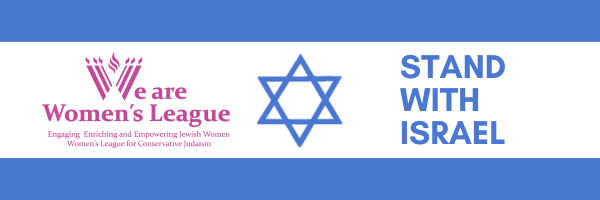
November 11, 2023 | 27th of Cheshvan, 5784
By Julia Loeb, WLCJ International President
 Finding Strength Through Community
Finding Strength Through Community
This week’s Torah portion, Chayyei Sarah, the life of Sarah, opens, ironically, with the death of our matriarch. We read that when Abraham learned the news of Sarah’s death, he “proceeded to mourn for Sarah and to bewail her.” The rabbis note that when one suffers the loss of a loved one, typically, one first cries in despair, and then later eulogizes and mourns the loss. The rabbis explain that for Abraham the loss was so profound that his grief long persisted even after formally mourning for her and eulogizing her to the community.
These days, I think we are all also feeling a tremendous sense of loss. At first, it was the shocking news, on October 7, of Hamas brutally and inhumanely killing so many, and kidnapping hundreds more. This week marks the Shloshim of those killed in the attacks and even after the initial shock and mourning of those deaths, we, like Abraham, continue to cry, feeling utter despair at those being held hostage, at the inhumanity of this attack, and at those still dying in the conflict. When we see other nations, and even people in our own country, call the terrorists heroes, chant for the destruction of Israel, refer to October 7 as a tremendous victory, or worse, view the attacks as “fake news”, we feel like we are in some kind of a nightmare. And when we notice the burbling up of antisemitism around the world, we remember what was allowed to happen during World War II and fear that we again have deluded ourselves into complacency.
Most of us have just changed the clocks, falling back one hour. But in some ways, it feels like we have fallen much further back to the dark times of 1938.
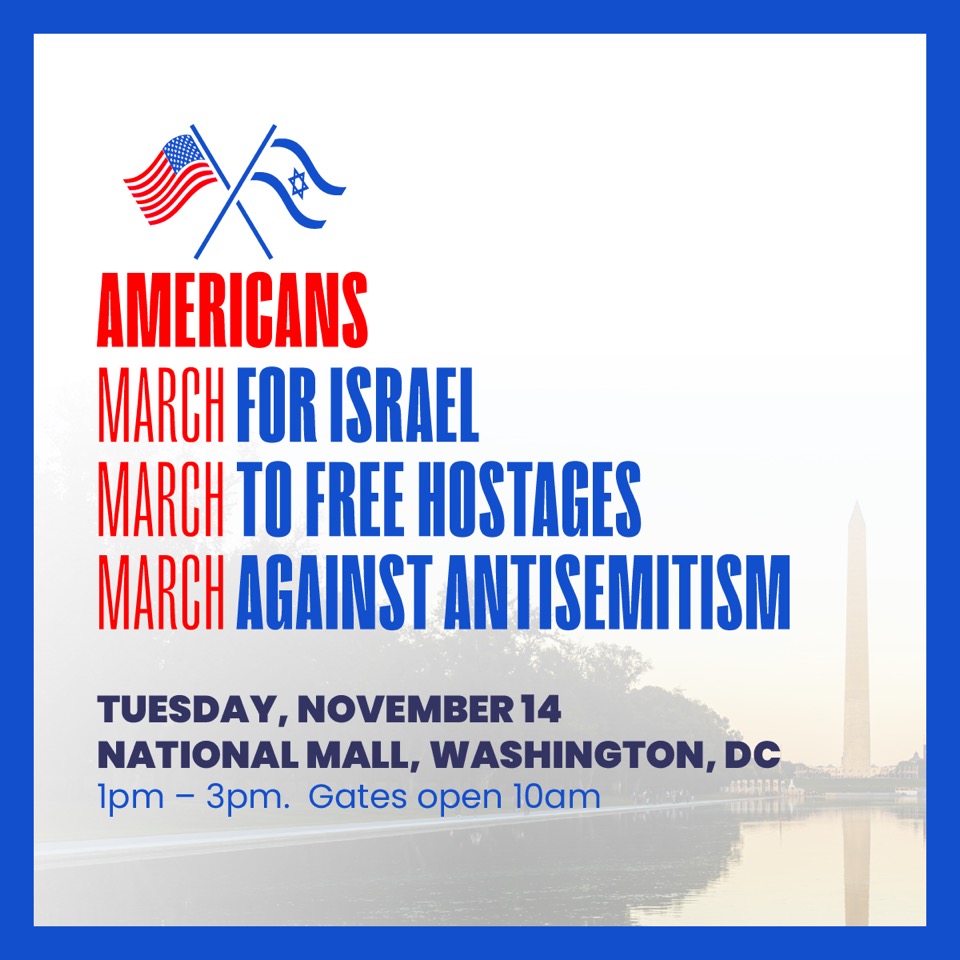 My grandparents and my husband’s grandparents were proud Germans. They were respected members of society. Bob’s grandfather treasured a World War I medal he received for fighting for the Germans. They felt so much a part of that society that they could not imagine that they would become the targets of persecution and systematic murder. Have we fallen into that same trap of complacency and security here? We have assured ourselves that if there were problems where we live, we could always find refuge and safety in Israel. Now Israel is under attack and fighting for its future, and we feel less secure than in recent memory. Some are taking off their kippot or Magen David necklaces in public. Some are even removing mezuzot from their doors. In this week’s Torah portion, Abraham says that in Canaan he feels like a “resident alien.” Are we sometimes made to feel that way here?
My grandparents and my husband’s grandparents were proud Germans. They were respected members of society. Bob’s grandfather treasured a World War I medal he received for fighting for the Germans. They felt so much a part of that society that they could not imagine that they would become the targets of persecution and systematic murder. Have we fallen into that same trap of complacency and security here? We have assured ourselves that if there were problems where we live, we could always find refuge and safety in Israel. Now Israel is under attack and fighting for its future, and we feel less secure than in recent memory. Some are taking off their kippot or Magen David necklaces in public. Some are even removing mezuzot from their doors. In this week’s Torah portion, Abraham says that in Canaan he feels like a “resident alien.” Are we sometimes made to feel that way here?
These are fraught times. We need to stay strong, support Israel and each other. This is a time to pull together as a community. The community of Women’s League has been tremendous solace to me these past weeks, providing a place to pray together, to share, to hear concerns, to offer each other support, and to organize support for Israel and the Masorti community. Our members have donated generously to causes in Israel and have found other productive ways of showing support. Our recent Sichot Beyn Achayot, Conversations Between Sisters program, and our programs on dealing with trauma and grief could not have been more relevant. Women’s League has just signed on as a sponsor for the March for Israel on November 14th at 1:00 p.m. on the National Mall in Washington, D.C. Come join us to show solidarity with the Israeli people, to demand the immediate release of the remaining hostages and to condemn the rise of antisemitism. We will be sending more details about this in the next few days.
In the margin notes of the Shabbat prayer book we use, Lev Shalem, there is a poem by Merle Feld which describes an idealized place where we feel safe and truly at home: a “place where we are respected and cherished, protected, acknowledged, encouraged, heard.” To me, and I hope to many of you, that is Women’s League. In good times and in bad, we offer a true community.
May this war and this spate of antisemitism end soon, and may we, and all the world, learn to live in peace together.
Shabbat Shalom,
Julia Loeb
WLCJ International President
jloeb@wlcj.org
October 28, 2023 | 13th of Cheshvan, 5784
By Julia Loeb, WLCJ International President
 Standing with Israel in Israel
Standing with Israel in Israel
On October 9, just two days after the brutal Hamas attack, I received an urgent email from the Conference of Presidents of Major American Jewish Organizations (an organization comprised of 50 prominent Jewish groups, including Women’s League). Israel’s Foreign Minister had asked the Conference of Presidents to send an emergency solidarity mission of the leaders of the various groups to Israel to show support and unity.
Just one week later, I found myself in Jerusalem representing the 40,000 members of Women’s League. The purpose of our trip was clear: to stand unwaveringly with Israel and in Israel in this time of unprecedented trauma and turmoil.
We met with families of hostages, who shared their heart-wrenching stories and pleaded for us to convey to the politicians we were set to meet the following day their family members’ desperate need for medical attention, protection and ultimately, release. We wore blue ribbons and bracelets inscribed with the poignant message, “Until all of us are here, we are all still there,” a powerful symbol of our solidarity with the hostages and their families.
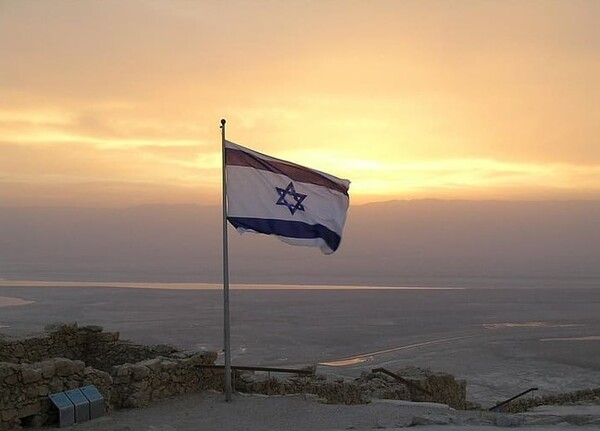 We met with evacuees from Netiv Haasara, a moshav near the Gaza border, who had lived peacefully with their Palestinian neighbors for years. The moshav members provided jobs to Palestinians and made sure those sick in Gaza had access to care in Israeli hospitals. Tragically, the moshav now mourned the loss of 200 members of their community and those who survived the attack had to be evacuated to Jerusalem with nothing but the clothes on their backs. Their support for the government’s mission to eliminate Hamas was now unwavering, as was their resolve to rebuild their homes and return to the moshav. But for now, they are living in hotels and relying on donations for their basic needs.
We met with evacuees from Netiv Haasara, a moshav near the Gaza border, who had lived peacefully with their Palestinian neighbors for years. The moshav members provided jobs to Palestinians and made sure those sick in Gaza had access to care in Israeli hospitals. Tragically, the moshav now mourned the loss of 200 members of their community and those who survived the attack had to be evacuated to Jerusalem with nothing but the clothes on their backs. Their support for the government’s mission to eliminate Hamas was now unwavering, as was their resolve to rebuild their homes and return to the moshav. But for now, they are living in hotels and relying on donations for their basic needs.
We had the privilege of meeting with prominent Israeli leaders, including President Yitzhak Herzog, Prime Minister Benjamin Netanyahu, Foreign Minister Eli Cohen, and Minister of Strategic Affairs Ron Dermer. They emphasized that Israel was not at war with the Palestinian people, but rather the goal was to eradicate Hamas from Gaza. They expressed appreciation for the support from the United States (President Biden was visiting the day we arrived), and implored us to maintain our steadfast support, especially as the war continues and media coverage begins to shift against Israel.
Our visit to Hadassah Hospital revealed the grim reality of operating suites located four floors underground to protect against rocket attacks. Entire administrative wings were filled with empty beds, waiting for the anticipated casualties.
We met a 20-year-old soldier wounded in the conflict and we paid our respects to a grieving Haredi family whose 20-year-old son was tragically killed by Hamas terrorists at the music festival.
In this small country, roughly the size and population of New Jersey, there is hardly anyone who doesn’t have a personal connection to the losses and sacrifices of the ongoing crisis—knowing someone killed, wounded, displaced, or called up for reserve duty.
The streets of Jerusalem were eerily empty, including the Kotel, typically bustling with activity. However, amidst the darkness, there were beacons of light. Israel is united in this fight. Israelis were banding together to donate, pack, and deliver essential items to evacuees and the 400,000 reservists. Long lines have formed to donate blood, and the democracy protests that had gained attention just a month earlier were momentarily put aside as the nation grieves collectively and stands united against a common enemy.
On this trip, we brought needed supplies, gave blood, met the injured, mourned with those who lost loved ones, and hugged the families of the hostages. Our support was deeply appreciated, but we gained far more than we gave by having this unique chance to stand by our brothers and sisters in this time of need.
Since I have returned, many have asked what we can do to help? We can show support in many ways. We can express our solidarity by attending rallies, buying Israeli products, and donating to relief organizations like Magen David Adom Donate Now! – American Friends of Magen David Adom (afmda.org) or the Masorti relief effort Support Masorti’s Emergency War Campaign – Masorti Foundation. We can demonstrate our pride as Conservative Jews by participating in the movement-wide Solidarity Shabbat this week. We can reach out to people that we know in Israel to let them know we are thinking of them. As one Israeli emphasized, “We need to be reminded that we are not alone.” Additionally, we must amplify the Israeli messages online, recognizing that, in part, this war will be fought in the realm of social media. The terrorists used GoPro cameras because they knew that their videos would be devastating to the Israelis. Our continued support of Israel is essential. Israel has a right and duty to protect itself, and they need to know they have our full support.
In this week’s Parashat, Lekh Lekha, God tells Abraham that “I will make for you a great nation…I will bless those who bless you; and curse the ones who curse you.” May those words ring true in the days, months, and years ahead.
Shabbat Shalom,
Julia Loeb
WLCJ International President
jloeb@wlcj.org
October 21, 2023 | 6th of Cheshvan, 5784
By Rabbi Ellen S. Wolintz-Fields, WLCJ Executive Director
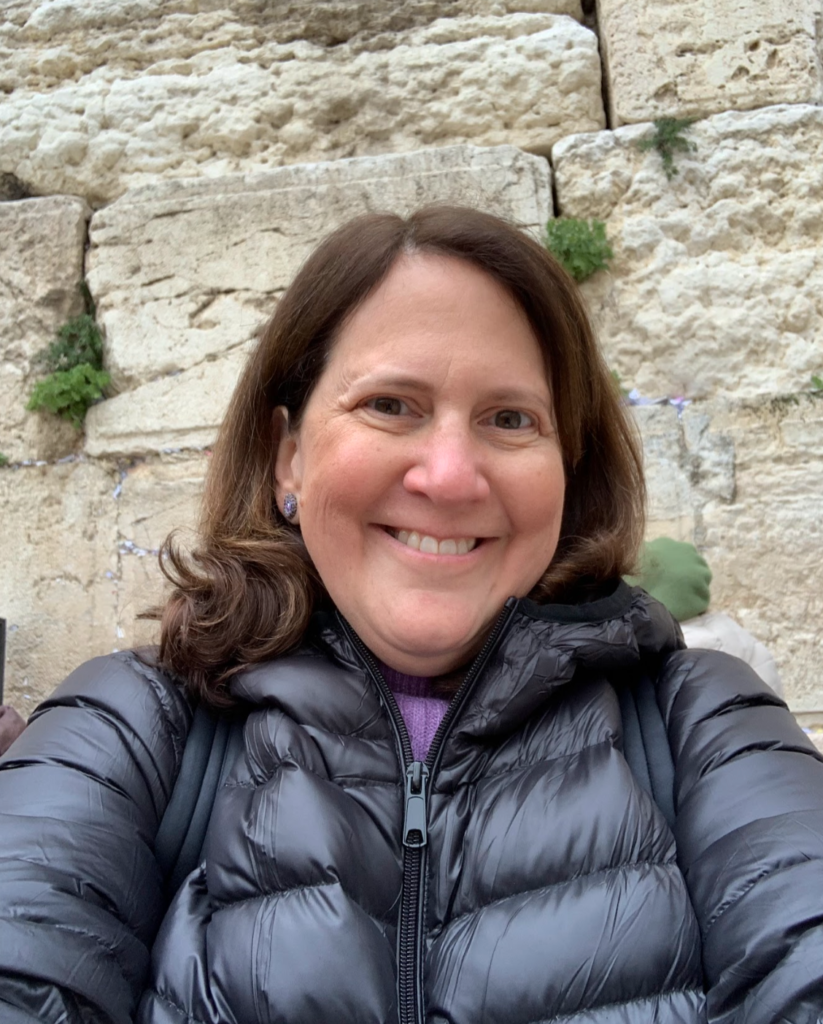 Kol Yisrael Arevim Zeh Ba’Zeh – Israel We Have Your Back!
Kol Yisrael Arevim Zeh Ba’Zeh – Israel We Have Your Back!
Now more than ever, our Torah Fund theme has special meaning in our lives – Kol Yisrael Arevim Zeh Ba’Zeh – All of Israel is Responsible for One Another. We see the significance of feeling a responsibility, arevut, to take care of each other. A more accurate translation of Kol Yisrael Arevim Zeh Ba’Zeh, which truly shows how we feel now, is Israel – We have your back! Think about that – our Torah Fund theme – planned last year – truly depicts how we are all feeling now. No matter if you have blood relatives in Israel, or not, our family is in Israel. I have been reciting Mourner’s Kaddish for the 1,400+ Israelis who have been murdered, including 300+ fallen soldiers, and the 40+ babies murdered. They are all our collective family. We come to this current situation in Israel from different perspectives and approaches.
Since 1995, when I spent nine months living in Israel, I have felt a great tension. In the summer of 1995, when I was on an Egged Bus on my way to Hebrew University for Ulpan (an intensive Hebrew class), before I started my studies at the Schechter Institutes for my year in Israel during Rabbinical School, I heard a bomb explosion. It was very scary, but got worse when I found out it was on the same bus line I was on, and I could have been on that bus. From that day forward, I never calmly took a bus in Israel. My friend bought a car, and he picked me up every day and drove me to Hebrew University. When I was convinced to take a bus, I literally had the Tefillat HaDerech, Traveller’s Prayer card, in my hand and recited it right after I paid my fare. I feared that I would take the next bus that would be bombed, or I would know someone who was on a bus bombing. That fear of knowing someone on a bus bombing came true on February 25, 1996, when my JTS Rabbinical School classmate Matt Eisenfeld and his girlfriend Sara Duker, someone I had known from our time together as students at Barnard College, were murdered on the Number 18 Bus in Jerusalem. I stayed in Israel for a few more days, and then returned to New York to continue the rest of the academic year at JTS. I came back to JTS with a heavy heart, a wounded soul, an intense anger and PTSD. Although, I continued to love the State of Israel after this horrific incident. However, I was scared and scarred and did not return to Israel until June 2012 and did not take a public bus in Israel until February 2021. Hamas is a terrorist organization that murdered my friends. My anger towards Hamas was silenced, and not something I spoke about; not all people who call themselves Palestinians are Hamas.
Hamas is the same word used in this week’s Torah Reading, Parashat Noach, to describe the corruption and lawlessness that existed in Noach’s time, which caused God to send the Flood. Hamas killed my friends, and I have never forgiven them. Since October 7, 2023, there are others who share in my rage and anger. Many now realize that Hamas is an aptly named group; a group of terrorists. As the late Prime Minister Golda Meir said, “Peace will come when the Arabs will love their children more than they hate us.”
We must stand with Israel, as she defends herself against the lawlessness of Hamas. Let us show solidarity and unity and our love for the people of Israel and the State of Israel. It is our responsibility, arevut, to commit ourselves to support the State of Israel and say unequivocally, Kol Yisrael Arevim Zeh Ba’Zeh, Israel – We have your back!
Shabbat Shalom,
Rabbi Ellen S. Wolintz-Fields
WLCJ Executive Director
ewolintz-fields@wlcj.org

October 14, 2023 | 29th of Tishrei, 5784
By Julia Loeb, WLCJ International President
 We Stand with Israel
We Stand with Israel
This is not the Shabbat message I thought I would be writing this week. As we emerged feeling renewed after the introspection of Rosh Hashanah and Yom Kippur and the celebration of Sukkot, I thought I would be writing about new beginnings—the possibilities that open to us as we begin the Torah again, take care of all the items on our to-do list that we said we would do “after the holidays,” and start our programming year in our affiliates and in Women’s League. Of course, that all changed after the brutal attacks this past weekend and the rockets that continue to rain down on the State of Israel.
I am sad. Today I heard that the death toll has reached 1200. 1200 mothers, fathers, daughters, sons, soldiers, and civilians who were killed by terrorists. My heart breaks for all the family members who are grieving or who are worried because they don’t know whether their loved ones are alive or not. Yesterday, I scrolled through Facebook and saw so many people posting about their missing friends and family. Now people are posting and sharing posts about loved ones who have been killed in these terrorist attacks. It is difficult and painful to see all these faces, but I feel compelled to look at each of them, to acknowledge their lives and remember their deaths. May their memory always be for a blessing.
I am mad. My anger grows with each news article or television report about the brutality of these killings.
I am glad. I feel hopeful that so many have come together to condemn the attacks. Countries around the globe are illuminating their landmarks with the colors of the Israeli Flag. The response to these attacks has crossed political, religious, and ideological lines here and in Israel. In a country of nine million people, 360,000 reservists have been called up, including a 95-year-old who fought against the British and the Arabs to create a Jewish Homeland. Many of these reservists were recently protesting the Israeli government but have now answered the call of their government to defend their country.
This is not the message about beginnings that I planned to write, but it is about beginnings. Unlike the Torah, though, this story in Israel is still being written. On Simchat Torah we finish reading the Torah and immediately begin again. We know that the first letter of the Torah is Bet, from Bereshit but less well known is that the last word of the Torah is Yisrael which ends in the letter Lamed. If
we put the two letters together to connect the ending and beginning of the Torah, we create the word, Lev which means heart. Am echad b’lev echad. One nation, one heart. When one Jew is hurt, all Jews feel their pain. Our thoughts and prayers are with the people of Israel in these difficult days.
Rabbi Ellen Wolintz-Fields has written a prayer for Israel that we have included in WL Week this week and is posted on the Women’s League website.
May peace come soon, speedily and in our days.
Julia Loeb
WLCJ International President
jloeb@wlcj.org
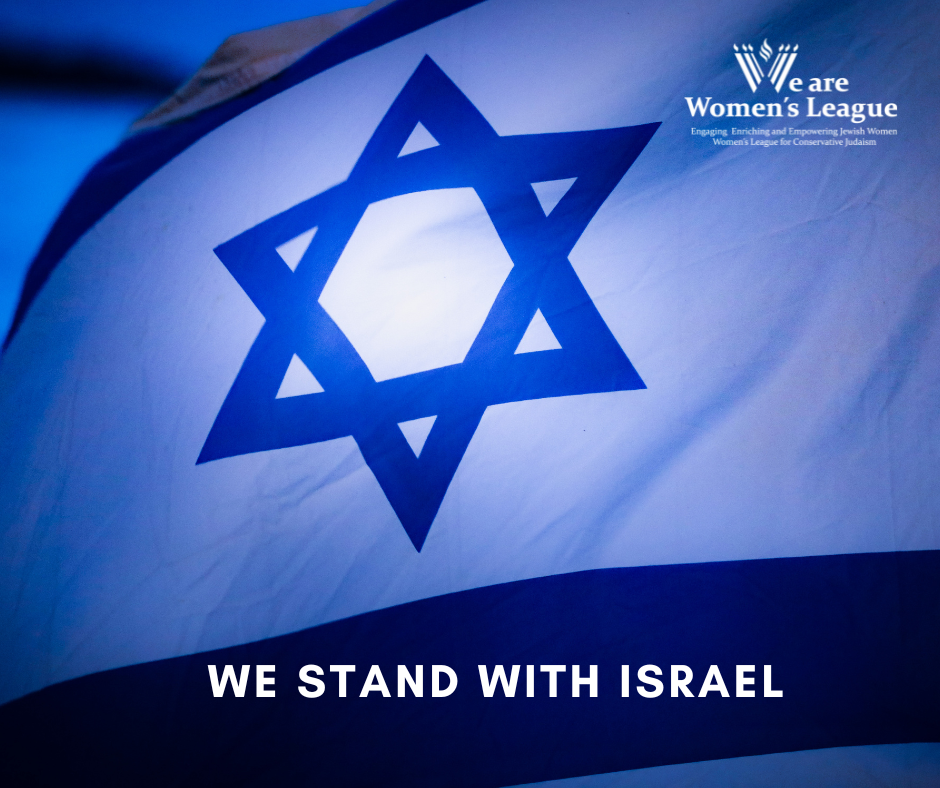
September 16, 2023 | 1st of Tishrei, 5784 | Rosh Hashanah
By Julia Loeb, WLCJ International President
 Rosh Hashanah
Rosh Hashanah
This Shabbat ushers in the Yamim Noraim—the Days of Awe. Rosh Hashanah is observed from Friday night to Sunday night. The Torah refers to this holiday as Yom Teruah, the day of sounding the shofar. The Talmud understands the shofar blasts to represent the cries of women, and the High Holiday liturgy is filled with the stories of these women—Sarah, Hagar, Hannah and Rachel. Their stories remind us of the power of women, their determination, unyielding spirit and the impact of their voices and prayers.
The shofar calls to mind other women too. After we blow the shofar at each musaf section of Rosh Hashanah, we say the phrase “Hayom Harat Olam,” which translates as “today, the world was born.” We call Rosh Hashanah the birthday of the world, but according to tradition, the world was created on the 25th of Elul, and the first day of Tishrei. Rosh Hashanah coincides with the sixth day of creation, when humanity was created. According to this view, Rosh Hashanah becomes the birthday of all people. The focus on birth reminds me of two heroes from the book of Exodus, Shifrah and Puah. These brave women saved the Jewish people by defying Pharoah and saving Jewish babies from his edict of death. It is hard to overstate their importance. Indeed, the Talmud (Sotah 11b) says it was because of the merit of the righteous women of that generation, such as Shifrah and Puah, that the Jewish people were redeemed from Egypt.
Notably, the word “shofar” shares the same Hebrew root as Shifrah. Rabbi Jacob ben Asher, also known as the Baal HaTurim, explained that Shifrah’s name is related to a hollow reed, the shifoferet, a blowing instrument like a shofar, used by midwives to help the newborn Jewish babies breathe.
As we studied in Kiddushin on Makom B’Yachad, women were originally not required to hear the shofar on the High Holidays because it is a positive time-bound mitzvah. But because women voluntarily participated in this mitzvah, and were committed to doing so, traditional halakhic (Jewish Law) authorities changed the status of hearing the shofar to an obligation for women.
So, when you fulfill the obligation of hearing the shofar blown this Rosh Hashanah and Yom Kippur, think of Shifrah and the prayers and cries of the women of Rosh Hashanah. As we celebrate the birth of the world and reflect on our own paths this Rosh Hashanah, let us draw strength from the stories of these brave women and the women whose voices made a difference.
In this High Holiday season, may we all pray with the passion and sincerity of these women and may we all be answered with a year full of growth, love and compassion.
Shabbat Shalom and Shana Tovah!
Julia Loeb
WLCJ International President
jloeb@wlcj.org
September 2, 2023 | 16th of Elul, 5783
By Julia Loeb, WLCJ International President
 Fall and the High Holidays
Fall and the High Holidays
Ah Fall! As the calendar flips to September, I keep thinking of the song “It’s the most wonderful time of the year”– Not the Andy Williams Christmas version, but the Staples commercial with parents excitedly pushing carts down the aisles to get school supplies for their children who are leaving the house after a long summer to go back to school. I don’t have children at home anymore, but I still love this season and I love the idea of purchasing new supplies to prepare for the academic year ahead. There is true excitement in new pens, highlighters and blank notebooks so filled with promise. Fall means other things too – apples and cider replace the summer fruit at the weekly farm market and Trader Joe’s and Starbucks turn to all things Pumpkin Spice. As Jews though, Fall most of all means the High Holidays.
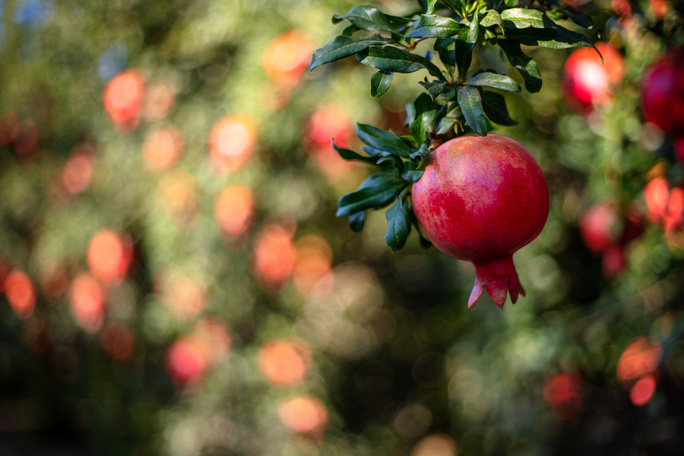 The High Holidays require serious reflection and self-examination. There have been years, however, when we have been away at the beach at the end of the summer, and then were so focused on back-to-school preparations and activities with the kids, that when Rosh Hashanah started, I was totally unprepared spiritually and emotionally. Eventually, the familiar services and High Holiday melodies would get me in somewhat of a proper mindset, but somehow, in those years, because I hadn’t prepared for them, the holidays never felt very satisfying.
The High Holidays require serious reflection and self-examination. There have been years, however, when we have been away at the beach at the end of the summer, and then were so focused on back-to-school preparations and activities with the kids, that when Rosh Hashanah started, I was totally unprepared spiritually and emotionally. Eventually, the familiar services and High Holiday melodies would get me in somewhat of a proper mindset, but somehow, in those years, because I hadn’t prepared for them, the holidays never felt very satisfying.
Other Jewish holidays have physical acts you take that help get you into the mindset. Before Passover we clean the chametz, change our dishes, and plan and prepare for the seder. For Sukkot, we build a sukkah. And leading up to Shavuot, we spend seven weeks counting up to the holiday. These acts get me in the mood for those holidays. But what about Rosh Hashanah?
With the arrival of the Hebrew month of Elul, we have an opportunity to start the spiritual and emotional preparations needed for the high holidays. We start adding an extra daily prayer, Psalm 27, which is focused on repentance, and in the morning prayers we add a shofar blast to remind us that the holiday is coming soon. On our Women’s League Makom B’Yachad Zoom meetings, we add this Psalm and blow the shofar. Gathering with my sisters on Makom, hearing this prayer and the shofar (blown by one of our talented sisters), truly helps me get in the proper mood for the holiday.
In a 2015 video message, Rabbi Judith Hauptman talks about wanting to have a mitzvah tracker, like her fitness tracker, on her wrist. You can watch her short video here: Jewish Women’s Archive, Judith Hauptman, “Exercise Trackers and Mitzvah Motivators,” 2015. (https://jwa.org/media/judith-hauptman-exercise-trackers-and-mitzvah-motivators-2015. What if, instead of a mitzvah tracker, we had a teshuvah tracker on our wrists to track our progress toward repentance during this season. We could use other technology on our phones that would connect to this tracker. Scroll through your contact list on your phone. Have we had miscommunications with friends or family that have festered? Relationships that need to be repaired? Take a look at your calendar. Are you spending your time in a way that aligns with your values? Do you make time for mitzvot? Consider your banking app on your phone or your checkbook. Are you giving tzedakah to causes you value? Hopefully those include Torah Fund and Women’s League. Your teshuvah tracker could give you reminders throughout the days and weeks and help you “close your rings” as the holiday approaches.
These types of questions about who we are, what kind of people we want to be and what we believe, are ones that we don’t often stop and think about. So let’s take the opportunity to do so now in this season of repentance and renewal.
Shabbat Shalom,
Julia Loeb
WLCJ International President
jloeb@wlcj.org
August 19, 2023 | 2nd of Elul, 5783
By Julia Loeb, WLCJ International President
 10 steps. Pay close attention to the 10 steps.
10 steps. Pay close attention to the 10 steps.
No, this opening isn’t clickbait for a get rich quick scheme, or an abbreviated 12-step program, but 10 physical steps that separate the main level of our home from the bedrooms upstairs. I go up and down these 10 steps many times a day without thinking about it, but lately, I have been counting them out every time. I have been thinking about many other activities in my daily life that would not have been remarkable before. In the past month I have flown on an airplane, stayed in a hotel, been out to a restaurant, shopped in a store, and of course, there are those 10 steps to climb. All these things were never an issue until a month ago.
The Torah tells us not to “place stumbling blocks before the blind.” (Leviticus 19:14) That commandment is generally interpreted as a directive to not take advantage of, or defraud a blind person, or any person with a physical, mental, or emotional challenge. But perhaps this commandment should be read not just as a prohibition, but also as a positive mitzvah—one where we are commanded to remove the barriers that impede others from being full members of our community.
 I have been thinking a lot lately about the challenges that those facing physical and other health challenges must overcome daily. As many of you know, just two days before flying out to our wonderful convention in Chicago, I fractured a bone in my ankle. Quickly, I learned firsthand of the many “stumbling blocks” modern life places in front of people with injuries and health challenges.
I have been thinking a lot lately about the challenges that those facing physical and other health challenges must overcome daily. As many of you know, just two days before flying out to our wonderful convention in Chicago, I fractured a bone in my ankle. Quickly, I learned firsthand of the many “stumbling blocks” modern life places in front of people with injuries and health challenges.
I was determined not to miss Convention. But my willpower was not sufficient to make that happen. Without the help of family, I could not have packed for the trip. Without the help of the United Airlines assistants, I could not have managed to get through the airports in Washington, D.C. and Chicago. And without the accessible room assigned to me at the Schaumburg hotel, I could not have taken care of myself.
Of course, once I arrived at the hotel, even before the Convention Shabbaton, I was welcomed by the loving, caring women of Women’s League who provided me with a knee scooter and a wheelchair, and who constantly looked out for my needs.
But even with all that love and help, getting around a big convention hotel on one foot was a major challenge. Things you don’t even think about when you don’t have trouble walking, such as the challenge of a breakfast buffet, were now front of mind. There were just so many literal and figurative stumbling blocks that I had never noticed, and never appreciated their difficulty before.
My injury has also opened my eyes to some of the wonderful accessibility efforts that are provided by thoughtful organizations. Last week, using my knee scooter, I went to a concert at Wolf Trap, a beautiful outdoor music venue and a National Park near Washington, D.C. Wolf Trap exchanged our tickets for accessible seating tickets. They provided a special parking area just yards from the music hall, with a special entrance. And by that entrance, there were special accessible bathrooms, and a separate snack bar hidden from the general crowd. All of that made it so easy to go to the concert and enjoy the evening.
Those types of efforts to provide accessibility are truly a mitzvah. They remove the “stumbling blocks” and allow the person facing physical or health challenges to feel capable and respected. Accessibility isn’t just a right under the Americans with Disabilities Act, it is a moral imperative.
My temporary injury will heal, but many others face similar issues and even greater challenges throughout their lives. This Shabbat, let’s all think how we can remove stumbling blocks faced by others in our community. One valuable resource on that subject is the Women’s League inclusion booklet on our website (https://www.wlcj.org/wp-content/uploads/2023/01/Inclusion-Resource-Guidebook.pdf) that, among other things, provides suggestions for improving the accessibility of our synagogues, services, and programs. Let’s make sure that everyone in our family, Sisterhood Affiliate and broader community knows that they are capable and respected. Let’s all take the necessary steps to make that true.
Shabbat Shalom,
Julia Loeb
WLCJ International President
jloeb@wlcj.org
August 5, 2023 | 18th of Av, 5783
By Julia Loeb, WLCJ International President
 New Beginnings
New Beginnings
In the past few weeks, I have experienced several new beginnings—an installation as President of Women’s League for Conservative Judaism, a family wedding and Tishah B’Av, which marks the beginning of the period of seven weeks leading up to Rosh Hashanah. The overriding message of Tishah B’Av is that “We can be better than we have been.” The time between Rosh Hashanah and Yom Kippur is a time to focus on improving ourselves and our relationship with others and with God. If we take that assignment seriously, we must prepare in advance and as we move through Av and approach Elul, it is a good time to begin these preparations. A baseball team doesn’t show up on opening day without any training. The bride and groom don’t meet for the first time under the chuppah, I didn’t assume my new position without a long transition period, and we shouldn’t arrive at Rosh Hashanah, the beginning of the year without taking the time for reflection and self-examination.
Beginnings mark the threshold of change and growth in our lives. Whether assuming a new position, joining in marriage with your beloved, or preparing for the Chagim, holidays, these fresh starts are laden with anticipation and challenges. As we embark on these new journeys, we encounter a fascinating interplay of ease and difficulty that shape our experiences and influence our personal development.
On one hand, beginnings often evoke a sense of ease and excitement, providing us with the impetus to embrace the unknown. As I start this new position, the possibilities are endless, and I am so enthusiastic about new responsibilities, new friendships and new opportunities. Similarly, marriage requires a profound bond of love, trust, and shared aspirations, infusing our hearts with joy and hope. As we prepare for Rosh Hashanah, we feel a collective spirit of tradition and spirituality, a sense of belonging and unity which makes these beginnings feel familiar and comforting.
On the other hand, beginnings are accompanied by situations that call for resilience and determination. In this new position, I will face many challenges and will need to be able to adapt quickly. In marriage, merging two lives can present unique dynamics and interpersonal hurdles that require open communication and compromise. The approaching Holidays may entail revisiting customs and practices, navigating family traditions, and grappling with the demands of modern life, which can be overwhelming.
Rashi, the medieval Jewish scholar, succinctly captured the essence of beginnings, stating, “All beginnings are hard.” This observation serves as a poignant reminder that no matter the context, new beginnings are bound to present challenges that test our fortitude and adaptability. It is through these challenges that we discover our strength, resilience, and capacity for growth.
Indeed, the journey of beginnings is as multifaceted as life itself. While ease and excitement set the stage, difficulty and uncertainty often accompany us on our path. As we embrace the dichotomy of beginnings, we learn to appreciate the beauty of the process – the thrill of discovery, the fulfillment of accomplishments, and the lessons learned from setbacks.
In the tapestry of life, beginnings offer a blank canvas where we have the opportunity to shape our destinies and create meaningful connections. Each beginning holds the promise of growth and transformation, even amidst the hardships that may arise. The challenges encountered during new journeys serve as stepping stones toward personal growth, resilience, and self-awareness.
As we embrace the words of Rashi, let us approach all beginnings with open hearts and minds, ready to embrace the ease and confront the hardships. Each journey brings its own set of lessons, and it is through these lessons that we evolve and become the architects of our own destinies. So, as you encounter new beginnings in life, remember to cherish the moments of ease and face the challenges with courage, for it is through these experiences that you will truly thrive.
It won’t be easy. A beginning never is.
Shabbat shalom,
Julia Loeb
WLCJ International President
jloeb@wlcj.org
June 24, 2023 | 5th of Tammuz, 5783
By Barbara Ezring, International Torah Fund Chair

WL Convention 2023 Celebrates Torah Fund at 80
In less than one month, I will be greeting friends, new and old, in person at the WLCJ Convention 2023. I can’t wait to see everyone who I have seen only on Zoom since 2017. I especially look forward to celebrating 80 years of Torah Fund Campaign of Women’s League for Conservative Judaism with everyone.
In 1942, Women’s League President, Dora Speigel and her leadership, established the Torah Fund. Money raised provided scholarships for rabbinical students studying at the Jewish Theological Seminary (JTS) in NY. Every member of Women’s League was asked to contribute $6.11, the numerical value of the Hebrew word Torah. That year they raised over $10,000. In 1963, Torah Fund merged with the Mathilde Schechter Residence Hall campaign that provided housing for undergraduate JTS students. Since 1942, Torah Fund has raised over $108 million. We have supported scholarships and programs benefiting five global institutions of higher Jewish education: the Jewish Theological Seminary (New York, NY), Ziegler School of Rabbinic Studies (Los Angeles, CA), Schechter Institutes of Jewish Studies (Jerusalem, Israel), Seminario Rabinico Latinoamericano (Buenos Aires, Argentina), and Zacharias Frankel College (Potsdam, Germany).
Please, join us as we celebrate the work of Torah Fund.
On Sunday, before the official opening of Convention, our Region Torah Fund Vice Presidents will gather to socialize, learn, and plan for the next Torah Fund Campaign. I can’t wait to see each of them in person.
We all will celebrate eighty years of Torah Fund at the gala luncheon on Monday. Samson Nderitu, a student from Kenya who is studying at the Ziegler School of Rabbinic Studies, will present the D’var Torah. Rabbi Brad Artson (Ziegler) and Chancellor Shuly Rubin Schwartz (JTS) will bring us greetings. We will feature a new Torah Fund video that will be available to all Regions and Affiliates/Sisterhoods to use during the new campaign year. Torah Fund Legacy Society members and “Plus $80 for 80 Years” contributors will be recognized. We will share a brief Torah Fund Stands with Israel program. The luncheon will conclude with a special “Happy Anniversary” dessert.
Join us at the Monday afternoon breakout session when we will present, “The Real Volunteers of Torah Fund,” starring our 2021-2023 Torah Fund Vice Presidents with appearances by our outgoing and incoming International Torah Fund leadership. Don’t miss this chance to meet in person, the creative, caring, and conscientious Region Torah Fund Vice Presidents who will guide you through the next campaign year.
Please, join me at Convention as we celebrate the past, the present and the future of Torah Fund Campaign of Women’s League for Conservative Judaism. See you in Schaumburg!
Barbara Ezring
International Torah Fund Chair
bezring@wlcj.org
June 17, 2023 | 28th of Sivan, 5783
By Ilene Rothman, WLCJ International Board Vice President, Communications Co-Chair, and Convention 2023 Communications Co-Chair and
Lois Silverman, WLCJ Communications Co-Chair, Convention and Communications Co-Chair
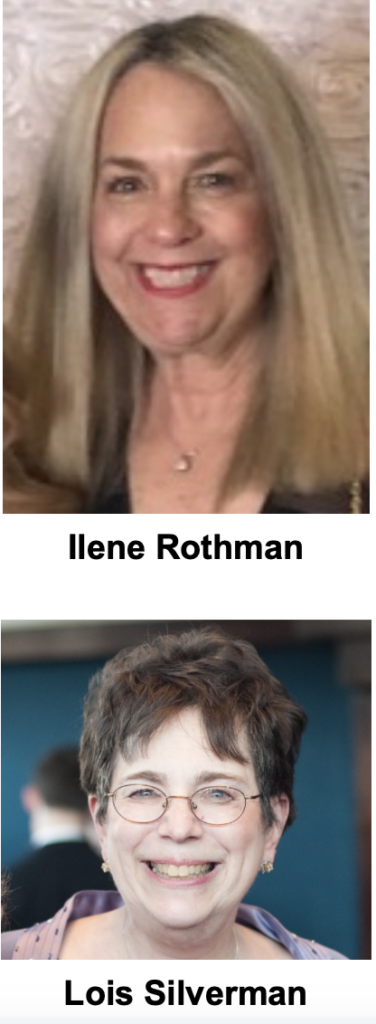 The Value of Being a Virtual Convention Delegate
The Value of Being a Virtual Convention Delegate
Feel our Ruach via the Internet
One of the positive outcomes from the pandemic was the improvement in technology to make virtual meetings productive, efficient, and legitimate, and to get people together virtually for all kinds of purposes. Therefore, even if you cannot attend this year’s Women’s League Convention in Schaumburg, IL in person, you can still connect, learn, celebrate, and even feel the Ruach with us via Zoom. The virtual registration fee is just $250.
Connect with Us
The opening and closing plenary sessions and featured speakers will be livestreamed. Hear about the State of the WLCJ organization and plans for the future. Listen to Rabbi Bradley Shavit Artson and Chancellor Shuly Rubin Schwartz speak about the challenges and successes of the Conservative/Masorti Movement.
Connect with our Masorti World Community around the globe. Did you know that Conservative Judaism outside North America is known as Masorti? Participate LIVE in the Rosh Chodesh service at the Wall in Jerusalem with our Women of the Wall. Join in Tefillot with our women’s minyan during the B’not Mitzvah service and closing plenary.
Learn with Us
Some of the Women’s League Leadership workshops are being broadcast via Zoom. This includes the Sisterhood President workshop. Learn about and support The Gift of a Healthy Birth provided by the Shifrah and Puah Maternity Center in Uganda. Find out what Women’s League is doing to create a stronger bond with our Masorti sisters.
Celebrate with Us
Rejoice with our 2017-2020 Leadership and 2018-2021 Region Presidents. Thank and celebrate our outgoing Women’s League Executive Committee led by outgoing International President Debbi Kaner Goldich and congratulate our incoming leadership led by incoming International President Julia Loeb.
Participate in the Monday morning B’not Mitzvah service and celebration when 30 women will be called to the Torah will lead the service. Many will read Torah for the first time. These women first came together almost three years ago with the formation of a Women’s League adult Bat Mitzvah class.
Applaud our Sisterhood Affiliates as they are recognized for their hard work with the Jewels in the Crown award. Several of the creative programs will be presented during a breakout session.
Join in the 80-year celebration of Torah Fund supporting the five Conservative/Masorti Seminaries training our clergy and lay leaders for future generations. The guest speaker will be Samson Nderitu, a student at the Ziegler School, from Kenya. There will also be a video featuring the leaders of all five Conservative/Masorti Seminaries. Current Torah Fund Legacy Society members and Plus 80 contributors will be recognized after a brief Torah Fund Stands with Israel program.
Of course, nothing can substitute for the Ruach felt at the in-person convention. However, the pandemic has taught us that education, friendships and even Ruach can be fostered via the internet.
Looking forward to being with you at WLCJ Convention 2023 July 16-19, 2023, if not in-person, at least online.
Ilene Halem Rothman
WLCJ International Board Vice President
WLCJ Communications Co-Chair
WLCJ Convention 2023 Communications Co-Chair
irothman@wlcj.org
Lois T. Silverman
WLCJ Communications Co-Chair
WLCJ Convention 2023 Communications Co-Chair
lsilverman@wlcj.org
June 10, 2023 | 21st of Sivan, 5783
By Lori Snow, WLCJ WOW Liaison and Immediate Past President, MAR, and
Illene Rubin, Chair, World Community Engagement
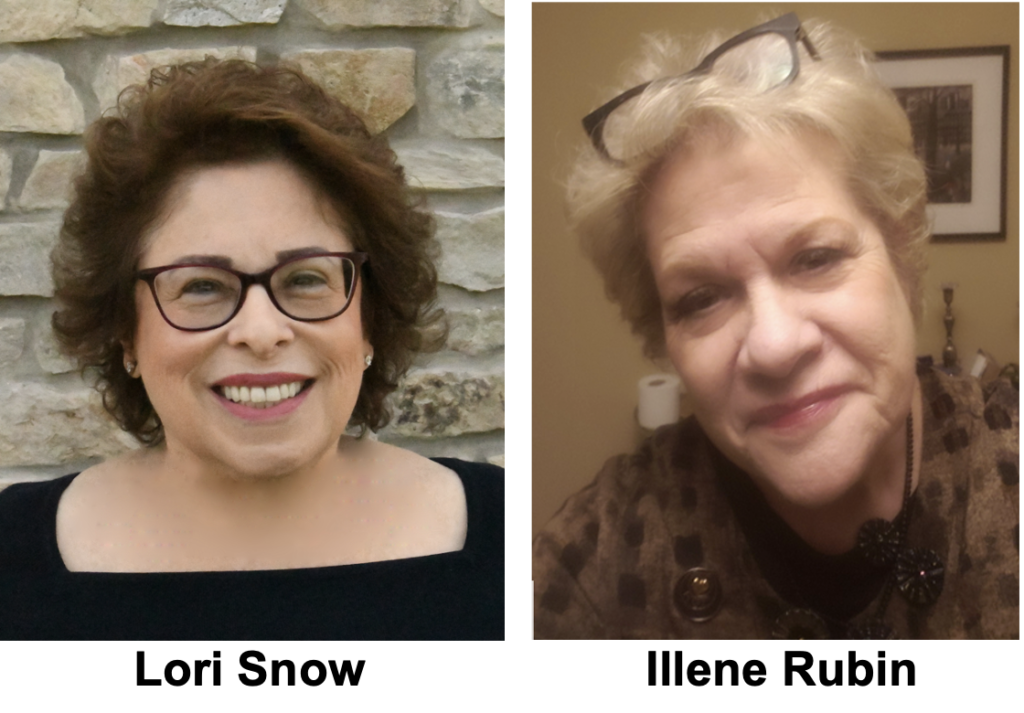 WLCJ is Growing – Worldwide! WLCJ marches on its way to grow as a world community. Learn more at Convention when World Community Engagement presents three international guests describing global updates of interest to all of us. Did you know Masorti (Conservative Judaism outside the US) is growing around the world? Learn where and why from these amazing women and hear how Masorti Olami strengthens and supports over 140 communities across five continents – attend session Aleph. Are you aware of Women of the Wall’s fight for women’s rights in Judaism and for religious pluralism? Discover the world of WOW attend session Bet.
WLCJ is Growing – Worldwide! WLCJ marches on its way to grow as a world community. Learn more at Convention when World Community Engagement presents three international guests describing global updates of interest to all of us. Did you know Masorti (Conservative Judaism outside the US) is growing around the world? Learn where and why from these amazing women and hear how Masorti Olami strengthens and supports over 140 communities across five continents – attend session Aleph. Are you aware of Women of the Wall’s fight for women’s rights in Judaism and for religious pluralism? Discover the world of WOW attend session Bet.
Celebrating Sisters Around the World – Aleph
What is Masorti?
In our Tuesday 7/18 Part 1 Convention morning session meet and hear internationally known Tehila Reuben, Deputy Director at Masorti Olami and MERCAZ Olami.
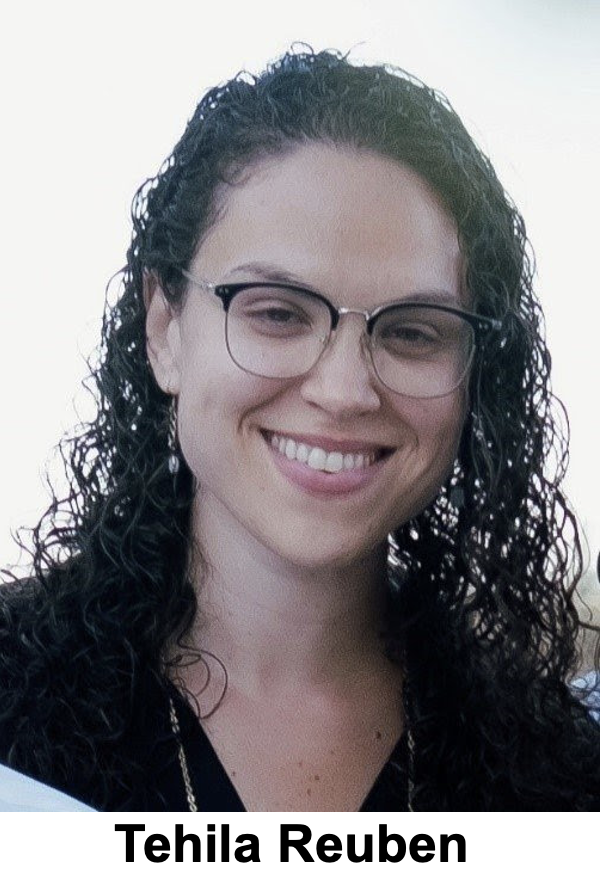 Tehila Reuben
Tehila Reuben
Since May 2011, Tehila has overseen its network of international communities, resource development and operations in the Jerusalem and New York offices. She organized and coordinated events, programs, and missions, to Budapest, Paris, and London. Tehila has been leading the organization’s efforts to help the Ukrainian Masorti/Conservative communities and refugees since the start of Russia’s March 2022 invasion of Ukraine and works as the liaison between the organization and their European, African, Australian, and Asian communities.
Then meet and hear Dafnah Sizomu from Uganda talk about her life story as the wife of a Zeigler rabbinical student and the daughter of the Uganda Abayudaya community rabbi. Hear first-hand stories of how they overcome their struggles and remain among our strongest, most dedicated, and fastest growing communities.
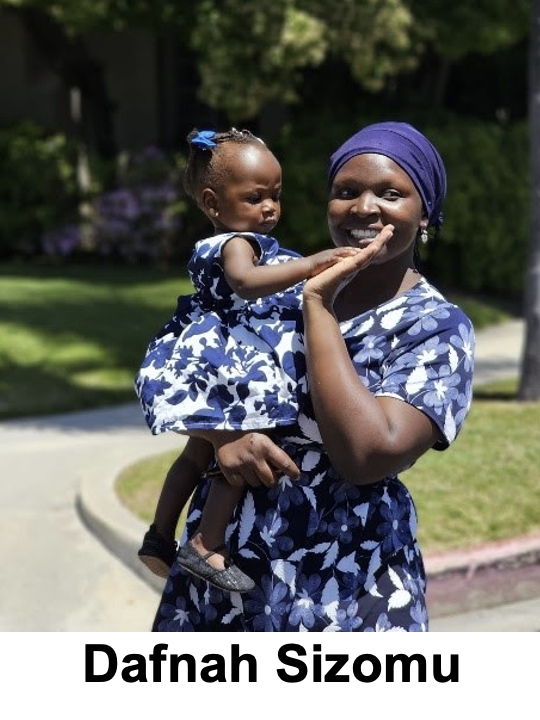 Dafnah Sizomu
Dafnah Sizomu
Dafnah Sizomu, born in Uganda to Abayudaya community religious leader Rabbi Gershom and Tziporah Sizomu, grew up Los Angeles, where her father was in rabbinical school, and spent a year in Israel. After returning to Uganda in 2008, she earned a pharmacy diploma. Dafnah teaches Hebrew, trains bar and bat mitzvah students and has a passion for reading Torah and leading services. She loves art and crafts, making new friends, is married and has a daughter, Shirah Wangechi.
Celebrating Sisters Around the World – Bet
Women of the Wall (WOW) in our Backyard and Israel
At our Tuesday evening session (Bet), immerse yourself in the world of the Women of the Wall (WOW). Hear an interview with Internationally known speaker Yochi Rappeport, WOW Executive Director, describing life in Israel and WOW’s current situation.
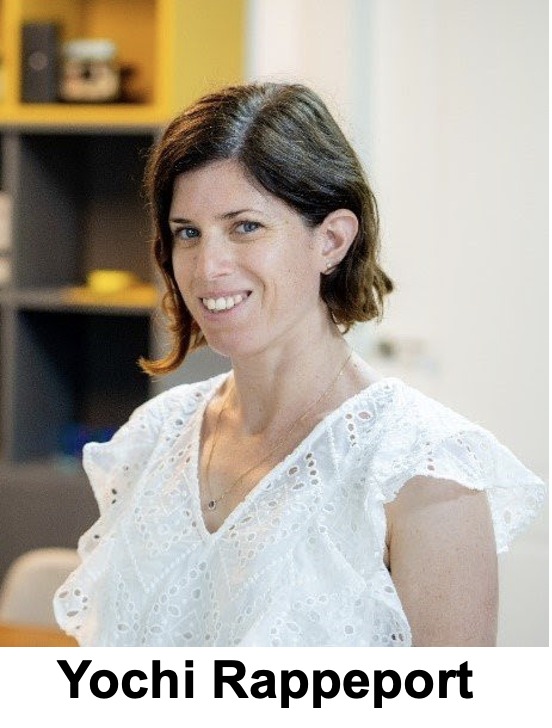 Yochi Rappeport
Yochi Rappeport
Born in Safed and raised in an Orthodox environment, Yochi Rappeport served in the IDF as a Nativ Military Course commander teaching Judaism and Zionism to new immigrants and non-Jewish soldiers. Following her military service, she studied at Bar Ilan University. She joined Women of the Wall in 2016 as Director of Education and Community Outreach. In 2019, WOW appointed Yochi Executive Director. Her identity as an Orthodox woman and feminist shows us a woman may indeed possess both attributes. She strives to make Israel a more tolerant place for her daughters’ generation and beyond.
After Yochi, hear our own Debbi Kaner Goldich, Rabbi Wolintz-Fields and Deb Bruce who attended WOW Rosh Hodesh Adar services discuss their experiences from approaching security until they leave the Western Wall. Then as a group we will watch WOW Rosh Hodesh Av services.
Join World Community Engagement Aleph and Bet sessions at Convention!
Lori Snow
WLCJ WOW Liaison, and
Immediate Past President, MAR
lvsnow@comcast.ne
lllene Rubin
Chair, World Community Engagement
irubin@wlcj.org
June 3, 2023 | 14th of Sivan, 5783
Celebration breakfast to follow
RSVP on the Convention Website at WLCJ.ORG
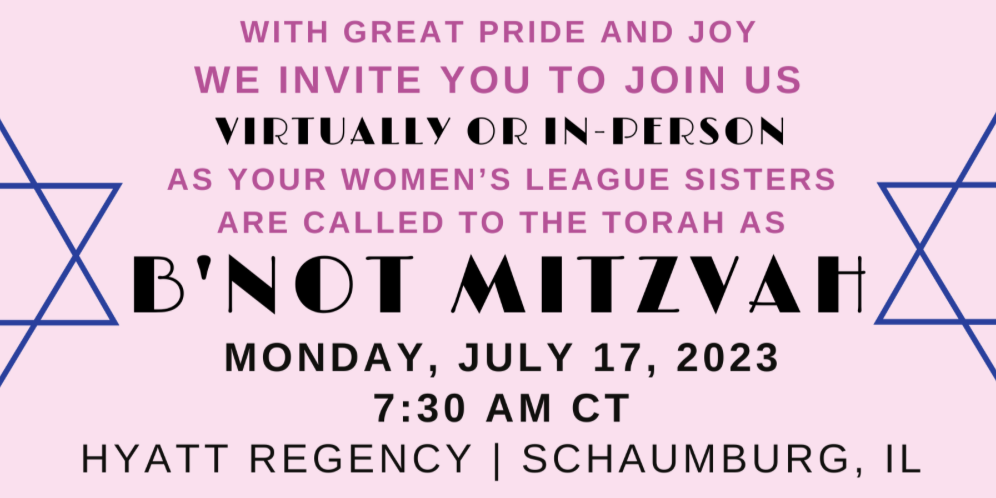
On July 17, 30 women will be called to the Torah during the morning services on Monday of Convention to celebrate their B’not Mitzvah. They will lead the service, and many will read Torah for the first time. These women first came together almost three years ago, responding to an announcement in Women’s League Week that we would be starting an adult Bat Mitzvah class. They came for many reasons—Some are Jews by choice and are just starting their Jewish Journey, some women had a Bat Mitzvah at 12 or 13 in congregations that were not egalitarian. They may have had their Bat Mitzvah on a Friday night or were not allowed up on the bimah, and some women joined the class for Torah Lishmah—learning for the sake of learning. For the past two and a half years, we have met every month, on Thursday nights, for ninety minutes to study, mostly with amazing rabbis in the Conservative movement, sometimes with our amazing Women’s League rabbis or members. We would like to thank all our teachers for helping these women reach this special day.
The women prepared for each class by reading required texts or handouts, thinking about questions provided by the teachers in advance and, recently, writing Divrei Tefillah on prayers from the morning service. The classes were thought-provoking, and sparked discussion and many questions. After all, ours is a religion based on asking questions. One of the requirements for the class was that all our students know the aleph-bet and be able to read basic prayerbook Hebrew. We started a series of Hebrew classes and many women participated. When you hear them lead their prayers on Zoom or from the bimah, or you hear them read Torah, you would never know that some of them did not know any Hebrew when they started this class. We would like to acknowledge the 14 volunteer Hebrew teachers that shared their knowledge and love of the language over the past three years, and we would like to thank Rabbi Cella for teaching trope to the class.
Like other groups within Women’s League, our Bat Mitzvah students have created a Zoom community, and many will be meeting in person at Convention for the first time. They will truly be Sisters Celebrating Together, and we hope you will celebrate them too. Join us on Monday morning, place an ad in the virtual journal to celebrate their accomplishments, and make sure to say Mazal Tov and Yishar Kochech to:
| Lilian Gradofsky – BQLI
Judith Karlin – BQLI
Lisa Bloom – CGL
Sandra Carleton – CGL
Esther Hellman – CGL
Marlene Ostrow – CGL
Eileen Barberi – FLR
Anne Schimberg – FLR
Carol Simon – FLR
Karen Winer – FLR
Jill Tomar – FLR & CGL
Nancy Goldberg – FLR & MAR
Deborah Malafsky – ICR
Laurie Atlas Silverblatt – ICR
Corinne Hammerschlag – INR |
Ruth Shapiro – INR
Marion Tully – INR
Sandy Berenbaum – MAR
Denise Brand – MAR
Faye Laveson – MAR
Illene Rubin – MAR
Madelon Sheff – MAR
Sheila Gersh – Metro North
Arlene Schwartz – NAR
Dana Sirkin – NXNW
Shelliyah Iyomahan – Seaboard
Elissa Kon – Seaboard
Edith Magruder – Seaboard
Jerilynn Payne – Seaboard
Arlene Fisher – Southern |
If you would like to see yourself on this list in three years, whatever your reason for joining, watch for the announcement about the next Bat Mitzvah class which will start this Fall.
See you in Schaumburg!
Julia Loeb
WLCJ Education Co-Chair
jloeb@wlcj.org
Ellen Kaner Bresnick
WLCJ Education Co-Chair
ebresnick@wlcj.org
May 20, 2023 | 29th of Iyar, 5783
By Barbara Finkel, Seaboard Education & Programming VP
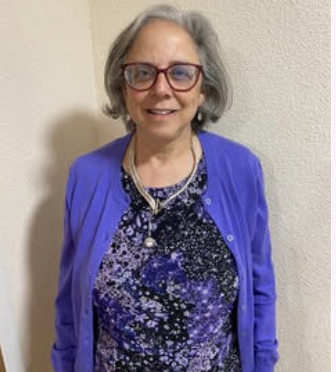 Our Role as Jews in Mitigating Atrocity
Our Role as Jews in Mitigating Atrocity
On March 23, I represented Women’s League at a U.S. Department of State program entitled Diplomacy, Dissent, and the Holocaust: Speaking Out, Then and Now. The program was organized by the Office of the Special Envoy for Holocaust Issues; the Secretary’s Open Forum; and the American Foreign Service Association (AFSA). About 75 people—foreign diplomats, Congressional staffers, representatives of civil society, and current and retired foreign service officers—attended in person; others watched via WebEx.
Deputy Secretary of State Wendy Sherman set the stage in her opening remarks by acknowledging that the Holocaust was a period when “voices of dissent went unheeded and unheard”, and that “when we tune out dissent, we allow society’s worst impulses to take over.” She explained that America in the 1930s was no haven for the oppressed—visa and immigration policies were “roadblocks” designed to keep people out, and U.S. officials responded too slowly even when they could not deny the harrowing events taking place in Europe. Deputy Secretary Sherman’s message was clear: Today, we still must grapple with the painful reality that the conviction to do right was not there, and we cannot let that happen again. She called upon her colleagues, and everyone in the audience, to “gather the bravery to sound the alarm about issues of urgency and give voice to causes often ignored”.
We then watched excerpts of the PBS documentary, The U.S. and the Holocaust, which focuses on how U.S. Government policies and American public opinion during WWII largely failed Jews seeking refuge from the Nazis. I had seen the documentary when it first aired in September 2022, but it shook me to the core once again to watch how events unfolded in this country. If you have not yet watched it, I highly recommend that you do so (https://www.pbs.org/kenburns/us-and-the-holocaust/).
After the screening, U.S. Special Envoy for Holocaust Issues Ellen Germain moderated a discussion among experts, including U.S. Holocaust Memorial Museum historian Rebecca Erbelding (featured in the film); AFSA Vice President Tom Yazdgerdi; Principal Deputy Assistant Secretary for the Bureau of Conflict and Stabilization Operations Colleen Crenwelge; and Foreign Service Officer Elizabeth Zentos, 2022 AFSA dissent award winner. The panel concluded that the State Department is better positioned now to hear dissent and, perhaps act more quickly against atrocity than it was during World War II, as the result of three “tools” at its disposal.
Dissent Channel: It was created by Secretary of State William Rogers in 1971, as controversy arose over the Vietnam War and he determined that existing channels for transmitting new or dissenting ideas were inadequate. Dissent messages are encouraged, and annual awards publicly recognize individuals who have demonstrated the intellectual courage to challenge the system from within, to question the status quo and take a stand, no matter the sensitivity of the issue or the consequences of their actions.
Atrocity Risk Assessment Framework (ARAF): Helps decision makers and country watchers understand atrocity risk and where atrocities are underway. Different iterations of this methodology have existed within academia and the U.S. Government for about ten years. The goal is to identify the dynamics that underpin ongoing or potential atrocities, a set of plausible atrocity scenarios, key developments to monitor, and recommended prevention and response options.
Conflict Observatory: Created in May 2022 to capture and analyze evidence of Russia-perpetrated war crimes and other atrocities in Ukraine. An online platform will publicly share the Observatory’s documentation to help refute Russia’s disinformation efforts and shine a light on abuses.
My biggest takeaway from the meeting is that each of us has the responsibility to pay attention to what is happening in our country and around the world and demand that our leaders take timely steps to prevent and/or mitigate atrocities. I believe we can take this even a few steps further and demand that our leaders act to alleviate the injustice, violence, and inequality that plague our society. The possibilities for action seem endless right now, as we awake every day to reports of mass shootings, acts of antisemitism, racial hate crimes, legislation in many states directed against members of the LGBTQ community, and on and on.
I’ve been thinking about what each of us, as Jews, owes to society, as we celebrate becoming free during Pesach; mourn the victims of the Shoah, war, and terrorist attacks during the somber days of Yom HaShoah and Yom HaZikaron; rejoice on Israel’s birthday on Yom HaAtzma’ut; and remember, in awe, receiving the Torah on Shavuot. The need to take responsibility for making the world a better place also is a prominent theme in To Heal a Fractured World, a book by Rabbi Jonathan Sacks z”l that I’ve been reading for a group discussion. It’s almost impossible to pick just one quote from this brilliant book, but I’ve decided on the very last paragraph:
“Judaism is the guardian of an ancient but still compelling dream. To heal where others harm, mend where others destroy, to redeem evil by turning its negative energies to good: these are mark of the ethics of responsibility, born in the radical faith that God calls on us to exercise our freedom by becoming his partners in the work of creation. That seems to me a life-affirming vision: the courage to take the risk of responsibility, becoming co-authors with God of the world that ought to be.”
Shabbat Shalom,
Barbara Finkel
Seaboard Education & Programming VP
barbarafinkel16@gmail.com
May 13, 2023 | 22nd of Iyar, 5783
Giving the Gift of a Healthy Birth
The Shifrah and Puah Maternity Center in Mbale, Uganda
2023 WLCJ CONVENTION SPECIAL PROJECT
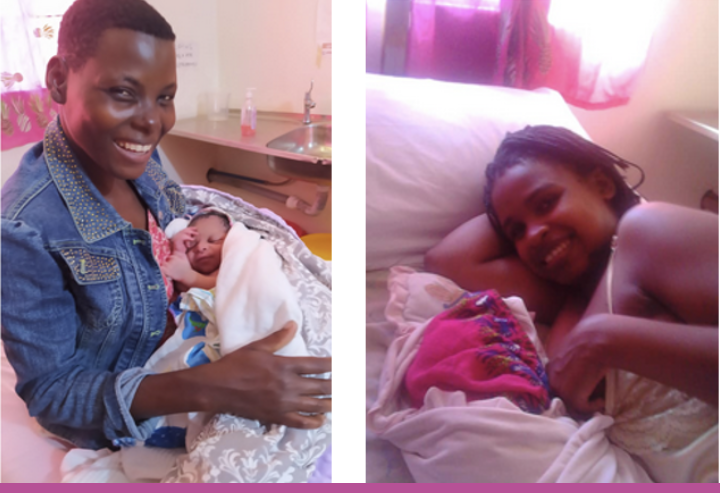 As Mother’s Day quickly approaches, it reminds us how vital mothers are to their babies and their families. They are the nurturers, the caretakers and the force that keeps everyone healthy. We must support these mothers and mothers-to-be during their most vulnerable time – when they are pregnant. Our thoughts are with these mothers having babies halfway across the world, knowing that we can help them. Send a donation in honor of your mother, daughter, daughter-in-law, granddaughter, niece or friend to show them how important it is to help these mothers.
As Mother’s Day quickly approaches, it reminds us how vital mothers are to their babies and their families. They are the nurturers, the caretakers and the force that keeps everyone healthy. We must support these mothers and mothers-to-be during their most vulnerable time – when they are pregnant. Our thoughts are with these mothers having babies halfway across the world, knowing that we can help them. Send a donation in honor of your mother, daughter, daughter-in-law, granddaughter, niece or friend to show them how important it is to help these mothers.
Here are just a few other examples of what we can help cover with your donations:
- $18.00, you can cover a woman’s cost to get an ultrasound during her pregnancy and to have her baby delivered at the Center.
- $36.00, you can cover the costs of the sanitary napkins necessary after each delivery for an entire MONTH.
- $72.00, you can cover the costs of the laundry service to keep the sheets, towels and gowns clean for each delivery for an entire MONTH
- $108.00, you can cover the MONTHLY costs of supplying each mother with three sets of baby outfits and one blanket; otherwise, they only have rags to wrap their baby in.
- $126.00, you can cover the costs of mosquito netting and Malaria treatment and medications – Pitocin, iron pills and infusion solutions; for all pregnant women to prevent stillbirths, prematurity births, and poor fetal growth for an entire MONTH
Please let us know what other questions you might have about his project. Your support is essential to ensure these mothers and babies are healthy and provided with all the services and supplies they need.
Use the drop-down menu on the Women’s League website, click on the Convention 2023 Special Project to make your donation for your Mother’s Day gift to the women of Uganda. If this donation is a gift in honor of someone, an acknowledgement email will be sent. Please supply the name(s) of those you would like to receive an email acknowledgement.
These are just a few examples of what we can do with your donations, your help is greatly appreciated.
Give for Mother’s Day
Thank you for your support.
Best,
Ellen and Randy
Ellen Grossman
WLCJ 2023 Convention 2023 Social Action Project Co-Chair
elkie17@gmail.com
Randy Schwartz
WLCJ 2023 Convention 2023 Social Action Project Co-Chair
rschwartz@wlcj.org
March 25, 2023 | 3rd of Nisan, 5783
By Sheila Offman Gersh, American Mothers of Israeli Olim Google Group Organizer
 A Bat Mitzvah to Cherish
A Bat Mitzvah to Cherish
For the past three years I have been attending the Women’s League Bat Mitzvah class. I completed two levels of Hebrew classes and I am participating in a trope class. Women’s League will have its “official” Bat Mitzvah ceremony Monday July 17; but my granddaughter Maya’s Bat Mitzvah will be in Israel on Rosh Chodesh Av, July 19.
When I learned that my trip to Israel to celebrate my granddaughter’s Bat Mitzvah will conflict with the Women’s League Bat Mitzvah celebration at the Triennial Convention in July 2023, I realized that I could not be in Schaumburg, Illinois for that celebration in person, but I will participate in pre-recording a prayer to be included in the Women’s League Bat Mitzvah celebration.
In light of this, while planning a trip to Israel for this past February, I contacted Yochi Rappeport, the CEO of the Women of the Wall (WOW), requesting the opportunity to become a Bat Mitzvah at the WOW service on Rosh Chodesh. I received a beautiful response from Yochi and immediately made reservations for my trip to Israel to make sure I would be there for Rosh Chodesh Adar. In addition, I immediately started learning the first Aliyah for the Rosh Chodesh. I was determined to succeed.
I arrived in Israel on Wednesday, February 15, one week before my Bat Mitzvah. It was hard to sleep during that week as I was so nervous about a number of things – walking to meet the bus at 6 a.m. in Jerusalem, being at the Kotel and wondering what would happen on this Rosh Chodesh, and whether I was going to succeed in my reading of the first Aliyah.
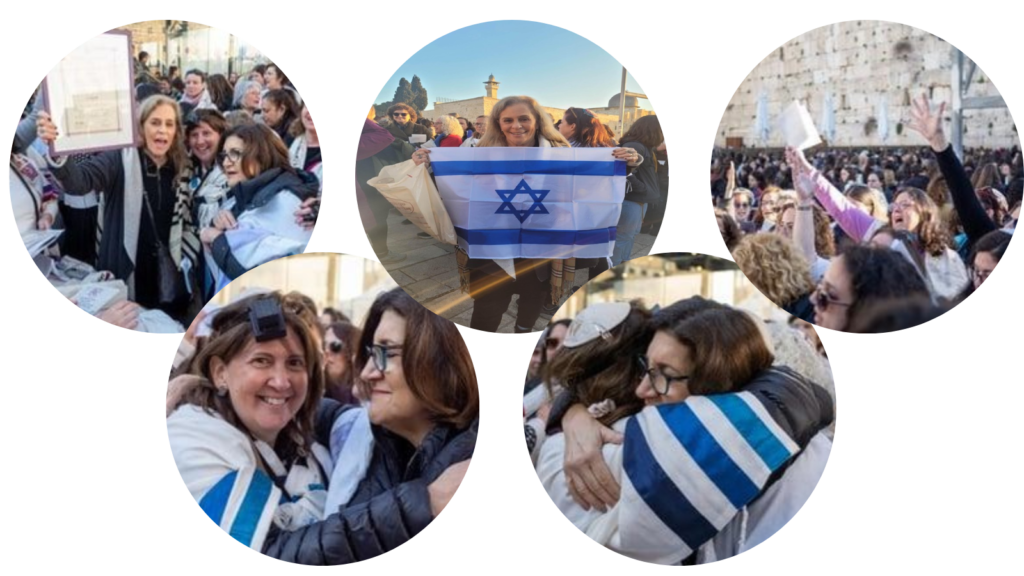 Photo Credit: Tal Kfir Shur, https://talks.picflow.com/PITd1XzOIlrItR7W
Photo Credit: Tal Kfir Shur, https://talks.picflow.com/PITd1XzOIlrItR7W
On my second day in Israel, I received a text from the International President of Women’s League, Debbi Kaner Goldich, who was attending the Conference of Presidents of Major American Jewish Organizations Israel Mission. She and WLCJ Executive Director, Rabbi Ellen S. Wolintz-Fields, would also be attending Women of the Wall. On Rosh Chodesh morning, when I met everyone at the Dung Gate, we received cloths of the Israeli flag. I already felt “at home.” I was introduced to many women, but most important was meeting the WLCJ international president. We all congregated, getting to know each other, and we started singing to get ready to go through security for the walk to the Kotel. While we were outside the gate, I was introduced to many as the “Bat Mitzvah girl” for that day’s service. Everyone was so pleased to meet me and they welcomed me to the service, on my “special” day. (I was not the 13-year-old who usually has her Bat Mitzvah at the Kotel; instead, I was a grandmother of six becoming a Bat Mitzvah.)
The time came to enter the Kotel Plaza, which meant we had to go through security, a normal/regular activity at the Kotel. However, something was different this time. Only one person was allowed in the area at a time. Each individual waited at the gate until the person in front had her items checked from the conveyor belt and she went through security. A guard stayed at the entrance waiting until I was fully through security before the next person was allowed to follow through. While this caused a delay, everyone got through security and we began the walk to the women’s section of the Kotel. Over on the men’s side, the men brought microphones to use for their service, with the purpose of disturbing the women’s service. They only bring microphones on Rosh Chodesh. However, the loud and joyous voices of the women were not going to be disturbed by the men.
There was an area blocked off for the woman for their service. On the other side of the semi-enclosed area, on the sideline, was a small group of female students who also tried to disrupt the women’s service. While they shouted at times and even blew a whistle, they did not succeed in disturbing the WOW service. WOW prayed loudly and we were a group of more than 500.
The women were so nice and proud of what I was accomplishing on that day. Everyone introduced to me was so happy to meet me. The comradery was outstanding. Women came together for the Rosh Chodesh service, and the togetherness, friendship and love in the air was evident.
The Rosh Chodesh morning service began with a huge group of women praying together. Since I attend morning Minyan each day, I was very familiar with the order of the service and could easily follow and participate in the service. While participating in the service, I wore a tallit that once belonged to my father. I had recently found it stored in my basement and immediately packed it for my trip.
There was singing and movement with many of the prayers. Most of the prayers were the same – sometimes the group sang an unfamiliar tune, but I was able to join in soon after it started. Once Hallel began, I knew that the “Torah” service was going to begin very soon. While WOW are not allowed to bring a Torah to the Wall, a large parchment paper is used which is an exact duplicate of how the Torah reading looks. (I just learned that they even have to sneak the parchment into the Kotel for the service.) I was called up for the first Aliyah, and with the greatest feeling of joy and accomplishment, I read the prayer and followed this by reading for the first part of the Rosh Chodesh Torah Reading. I was given a yad to read the Torah, since I forgot to take out the one I had purchased before my trip.
Now the time came for me to READ! While there was a Gabbi at my side, I read the Torah portion without any problem, although I’m not sure I applied all the trope correctly. (Debbi Goldich took a video while I was reading so I have the recording of my doing this.) When I completed the reading, everyone cheered and clapped, which made me feel proud and accomplished. I quickly read the prayer recited after reading the Torah and this was followed by more cheers of joy from the Women of the Wall. I was then presented with a fabulous framed Bat Mitzvah certificate. I held it with pride and joy and showed it off to everyone who was standing near me. How special this moment was to me. I was also presented with a card that had a torn page from a Siddur pasted in it and words that read “Sheila our sister. Mazel Tov on your very special Bat Mitzvah. Thank you for choosing to celebrate with us on (Aleph) Adar. Here is a torn page from one of our prayer books. A mob destroyed 39 of them on 5/6/22…” It was signed by Anat Hoffman. How special this addition is and it will soon be framed and hung. Everyone was filled with passion, love, dedication, and pride for our participation in the Rosh Chodesh prayer service.
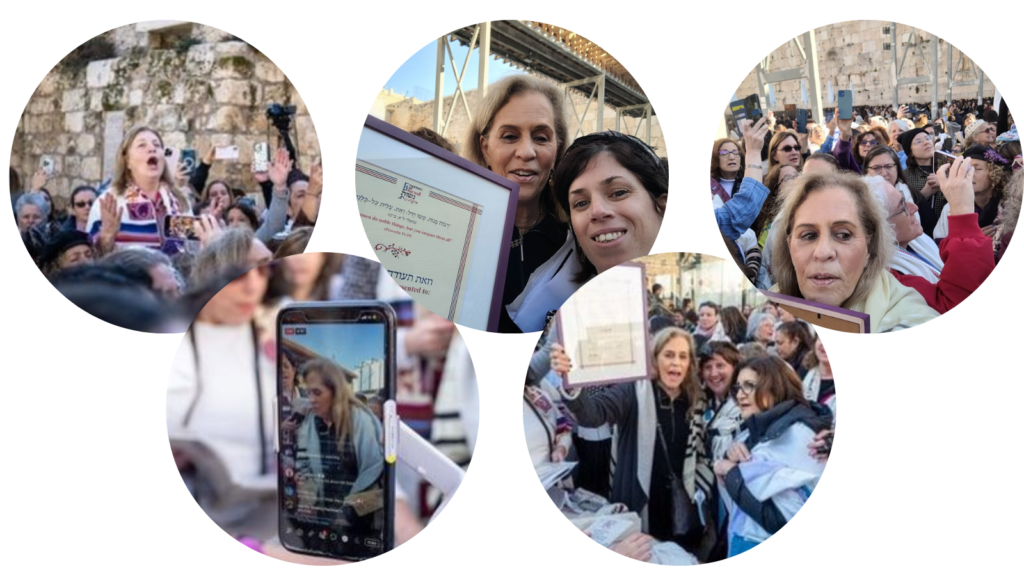 Photo Credit: Tal Kfir Shur, https://talks.picflow.com/PITd1XzOIlrItR7W
Photo Credit: Tal Kfir Shur, https://talks.picflow.com/PITd1XzOIlrItR7W
Singing Aleinu at the Kotel was so very special for me. When the prayer service was over, the group then ended the service by singing Hatikvah. How special this was… being in Israel, being at the Kotel with so many women, reading Torah, and now singing Hatikvah.
I will always relish the experience that started with a dream by joining a Bat Mitzvah class with the Women’s League of Conservative Judaism, and being provided the opportunity to read Torah with the Women of the Wall, and become a Bat Mitzvah. How proud my mother and father would have been to see me on the day I read Torah at the Kotel. My family was back home and they were so proud of what I accomplished.
I celebrated this day in two special ways – first I met up with my Rabbi’s daughter who lives in Israel. She had arranged for the waiter to bring out a plate with cake, ice cream and a candle to celebrate my day. How special this was! On Shabbat, my son and his family celebrated my special day with a fabulous Shabbat dinner and a beautiful celebratory chocolate layer cake. My son, daughter-in-law and four grandchildren were so proud of their bubbe! My daughter-in-law asked me, “Mom, which was more special, getting your doctorate degree or becoming a Bat Mitzvah?” Quickly I responded, “Becoming a Bat Mitzvah.” (I just had my NYU doctorate diploma framed about one month ago, after 33 years, 7 months, and 6 days. When I arrived home, I immediately hung my Bat Mitzvah certificate very close to my NYU diploma).
It was not until I read the evening Jerusalem Post that I saw there were some problems at the KOTEL Plaza while I was there. Some Torah scrolls brought to the Kotel created a commotion. I was not aware of this during the WOW service; In fact, I had no clue of anything that went on outside on the Plaza while we were actively participating in the WOW’s Rosh Chodesh Service.
I look forward to Rosh Chodesh Av, when my granddaughter, Maya, will read Torah at her Bat Mitzvah with the Women of the Wall. And, WLCJ will be able to attend virtually at Convention, since our Continuing the Celebration of Convention will include WOW’s Rosh Chodesh Av service.
I cherish my memory of my Bat Mitzvah at the Kotel on Rosh Chodesh Adar!
Shabbat Shalom,
Sheila Offman Gersh
American Mothers of Israeli Olim Google Group Organizer
sogersh@gmail.com
March 4, 2023 | 11th of Adar, 5783
By Sue Bengele, WLCJ Financial Secretary
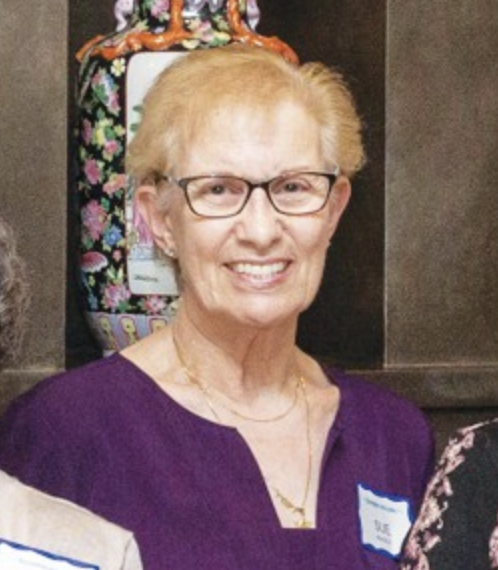 Always be Yourself
Always be Yourself
When I became a Bat Mitzvah many years ago… you know, when girls had their Bat Mitzvah on a Friday night, were able to sing the Haftarah, sing the Kiddush and perhaps be able to lead the congregation in Yigdal… My Rabbi said the following three words to me when he spoke directly to me… ALWAYS BE YOURSELF!
I learned over the years what he meant AND what kind of person I should strive to be.
Always be honest and kind.
Know your own strengths and weaknesses.
Never micromanage; just give suggestions.
Realize that “my way” is not the only way.
Realize that there are many kinds of people in the world; figure out a way to work with them.
Smile! As it always creates a good atmosphere.
Always listen. My Dad, of blessed memory, was the ultimate listener. My brothers and I used to say that listening to him was like listening to E.F. Hutton… some of you may remember that name. When my Dad spoke, which was less often, than more often, everyone always listened.
Know your personnel; in other words, learn about the people you are conversing with. Are they talkers or listeners or both? Do they like to lead the conversation or maybe not? Do they like to have the final say or maybe not?
Figure out the most important things in your life… for me, family is always first followed by good health, kindness and honesty.
Know what are your needs and wants.
I know that we have been told that there are leaders and there are followers. I believe that everyone is a leader in their own way.
I’ve been blessed to meet and get to know a plethora of Women’s League members. Some of them have similar ideas but many have different ones. That’s why I feel that working in committees, teams or partnering with someone is a great idea.
I know that following these points will keep me grounded and lead me to always be myself. I hope that each and every one of you will Always be Yourself, too.
Shabbat Shalom,
Sue Bengele
WLCJ Financial Secretary
Sbengele@wlcj.org
February 11, 2023 | 20th of Shevat, 5783
By Lymor Wasserman, Co-Chair WLCJ Environmental Committee
 Tu B’Shevat – Sustaining our Environment
Tu B’Shevat – Sustaining our Environment
HaShkedia Porachat is one of the most widely known Israeli / Hebrew children’s songs for Tu B’Shevat. HaShkedia Porachat means “the almond tree is blooming.” It seems silly to sing this song when we are still wearing winter coats and long sleeves, I mean, how can anything bloom in this weather? Of course, in Israel, it’s cold and rainy and the first obscure plants are beginning to bloom. If you’ve paid attention to the weather outside, I’m sure that the unusually unseasonal weather is part of your daily conversations. What can one person do about changing this overwhelming part of our lives?
Here are some ways that each and every one of us can reduce our carbon footprint that can fit into our simple-yet-so-complicated lives:
- Spend less time in your car – If you can (weather, distance), don’t take your car! If you work outside the home, consider working from home one day a week. When running errands, try to do them all together instead of leaving your house multiple times a day.
- Cut back on animal product consumption – believe it or not, the processing and distribution of meat and dairy products accounts for half of the food’s carbon footprint! I’m not saying you have to become vegan, but any change in your consumption can make a difference.
- Composting – Simply collecting your organic waste and composting it would reduce what is now the third largest source of human-related methane emissions in the country. Look into getting a backyard composter, seeing if your city or region has a system you can use, or look into private companies that collect from your doorstep. As Jews, we are already conscious of what we eat and when (think kashrut, blessings, etc), so this is one more way we can respect food.
There are so many small steps we can take, and our amazing and determined Women’s League Convention Committee has moved mountains to ensure that we make an impact, such as having refillable water stations, and not using single-use water bottles.
Also at our Convention, 2023, Sisters Celebrating Together! July 16-19, 2023 in Schaumburg, IL, I look forward to meeting you “in person” and sharing our table that will be chock full of resources and information about how we can make the world a better place. Together let us increase awareness about Sustainability and how we can leave this earth better for our next generation, the truest meaning of “L’Dor V’dor.”
Shabbat Shalom,
Lymor Wasserman
Co-chair WLCJ Environmental Committee
mrswass@gmail.com
February 4, 2023 | 13th of Shevat, 5783
By Fran Hildebrandt, WLCJ Mishpachah Chair
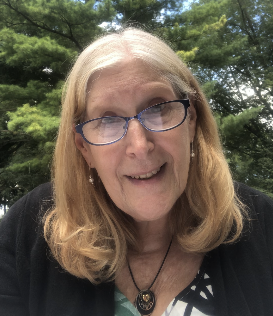 Exploring LGBTQ+ Identities
Exploring LGBTQ+ Identities
Building Bridges . . . Creating Community
We live in a world in which our family members may be exploring new identities. Words like “cisgender, nonbinary, transgender and queer” (to name a few) may feel new to us. Issues that our loved ones may be grappling with, the words and terms and pronouns they’re using, and the lives they’re living, may be new to many of us.
How can/do we celebrate them and show that we love them for who they are?
To support our LGBTQ+ family members, we can learn about identity terms we may not yet have encountered. Some of us may also struggle with what appropriate pronouns to use. Now WLCJ members will have the opportunity to learn affirming language and correct pronoun usage. Join Keshet and WLCJ for a two-part series which will provide us with foundational knowledge and shared language, so that we can better understand and affirm the important people in our lives. Please be aware that the second session is predicated on the knowledge presented at the first one.
February 9th, 7:30–9:00 PM ET: Introduction to LGBTQ+ Concepts
This training is designed to familiarize participants with the basics of building LGBTQ+ equality and belonging.
April 23rd, 7:30-9:00 PM ET: Going Deeper: LGBTQ+ Language & Pronouns
This training will focus on equipping participants to be active allies to the LGBTQ+ community, specifically through language and pronoun-use.
You can find the registration information on the WLCJ website, in the WL Week newsletter, or click on the button below. You may also email me and I will help you to register. (fshildebrandt@gmail.com)
REGISTER NOW
I hope that I will see you on February 9th and April 23rd. As Benjamin Franklin (and a few others) said, “Tell me and I forget, teach me and I remember, involve me and I learn.” What better way can we demonstrate our love and support for our families by putting forth the effort to learn and participate with them on their journey?
Shabbat Shalom,
Fran Hildebrandt (pronouns: she/her/hers)
WLCJ Mishpachah Chair
fshildebrandt@gmail.com
January 21, 2023 | 28th of Tevet, 5783
By Mindy Steinholz, WLCJ International Vice President and Health & Wellness Chair
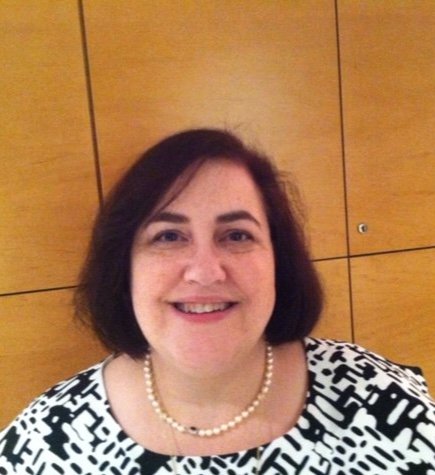 Health and Wellness: End of Life Issues, Two-Part Program
Health and Wellness: End of Life Issues, Two-Part Program
“In this world, nothing is certain except death and taxes.”- Benjamin Franklin
Most of us would in fact prefer to discuss our taxes rather than death. Yet we know that death is something we will all face. Most of us have already faced it with our families and dear friends. We have visited them in the hospital or sat at their bedside at home. Maybe we have been the ones tasked with making decisions for someone who is terminally ill, of extreme age, or has become unable to make their own healthcare decisions for some reason.
Nonetheless, it remains something most of us prefer not to talk about or even think about. We consider it as something that will happen “later” or “in the future”. Most of us just assume we have time to plan. But we don’t know when plans might be needed which means that the time to plan is now.
Please join Women’s League for a two-part series this winter on end-of-life issues. Part 1 on January 26 will feature guest speaker Rabbi Ron Goldberg speaking about “Difficult Conversations”. Rabbi Goldberg is a graduate of the Ziegler School and works at LA Jewish Health (formerly the LA Jewish Home). He will lead us in a program regarding those conversations we need to have with our families and significant others surrounding what we (and they) want. These conversations are not easy to have and yet are necessary – what kinds of medical care do we want especially if we are unable to make decisions ourselves? What kind of care do our loved ones want when they are unable to make decisions? Even if we able to make decisions, have we discussed our thoughts on the kind of care we want in various situations?
Part 2 on March 30 will feature a team from the Jewish Hospice and Chaplaincy Network. This Michigan based organization’s mission statement is “To ensure that no Jewish patient or family faces terminal illness alone. We help those we serve gain access to the needed resources compatible with their own Jewish identity, practice, and values.” The team includes rabbis, social workers, nurse practitioners, doctors, music therapists, and volunteers. We will welcome Rabbi David Rosen, Rabbi Joseph Krakoff and Natalie Rosenfeld (social worker and the director of patient care) for this session.
I hope you will join me for these important programs this winter. Together, we can make these topics more approachable and increase our comfort with them.
I wish you all good health and look forward to seeing you.
Shabbat Shalom,
Mindy Steinholz
WLCJ Health and Wellness Chair
msteinholz@wlcj.org
January 14, 2023 | 21st of Tevet, 5783
By Ellen Grossman and Randy Schwartz, Convention 2023 Social Action Project Co-Chairs
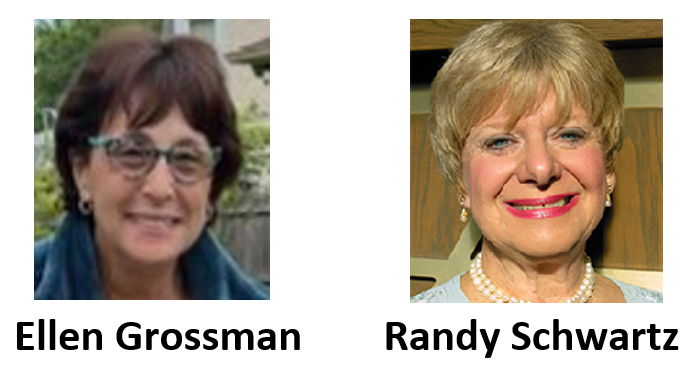 WLCJ 2023 Convention Social Action Project: Our Shifra and Puah Project – GIVING THE GIFT OF A HEALTHY BIRTH
WLCJ 2023 Convention Social Action Project: Our Shifra and Puah Project – GIVING THE GIFT OF A HEALTHY BIRTH
In Parashat Shemot, Exodus 1:1–6:1, is the story of Pharaoh, who enslaves the Jews in Egypt and orders the midwives, SHIFRAH AND PUAH to kill all Jewish babies. Pharaoh, fearing the Jews will outnumber the Egyptians, commands his people to cast the Jewish babies into the Nile River. This forced Yocheved and Amram to place their baby in a basket in the Nile River. Moses, as he became known, becomes the future leader of the Jewish people and the rest is history.
The WLCJ 2023 Convention Social Action Project – GIVING THE GIFT OF A HEALTHY BIRTH, is a project to support the Shifrah and Puah Maternity Center in Mbale, Uganda. This project exemplifies what it is to give the Gift of a Healthy Birth.
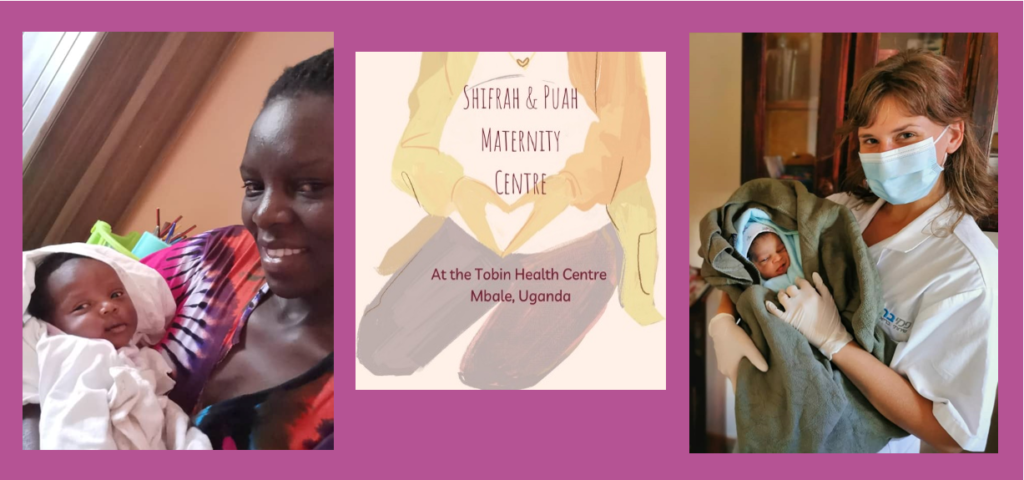
The Shifrah and Puah Maternity Center in Uganda births many Jewish babies each year. To enable this to continue, our Social Action Project will raise money and help offset their expenses. As more babies are being born there, the need becomes even more apparent.
To initiate your support, we are designing a very easy way for you to help. There are many costs that need to be covered at the Shifrah and Puah Maternity Center. With your donation of:
- $18.00, you can cover a woman’s cost to get an ultrasound during her pregnancy and to have her baby delivered at the Center.
- $36.00, you can cover the costs of the sanitary napkins necessary after each delivery for an entire MONTH.
- $72.00, you can cover the costs of the laundry service to keep the sheets, towels and gowns clean for each delivery for an entire MONTH
- $108.00, you can cover the MONTHLY costs of supplying each mother with three sets of baby outfits and one blanket; otherwise, they only have rags to wrap their baby in.
These are just a few examples of what we can do with your donations. With your donation, whatever the amount, you will help greatly.

Look for more information to come and more ways to help our Convention 2023 Shifrah and Puah Maternity Center Project. Have a wonderful Shabbat and realize how important “GIVING THE GIFT OF A HEALTHY BIRTH” can be to help those who need our help. The help we can give is truly of life-saving value.
Todah Rabah
Shabbat Shalom,
Ellen Grossman
WLCJ 2023 Convention 2023 Social Action Project Co-Chair
elkie17@gmail.com
Randy Schwartz
WLCJ 2023 Convention 2023 Social Action Project Co-Chair
rschwartz@wlcj.org
January 7, 2023 | 14th of Tevet, 5783
By Lymor Wasserman, Co-Chair WLCJ Environmental Committee
 Hanukkah Memory
Hanukkah Memory
Happy Gregorian New Year to all! We have many things we look forward to in the new year. Personally, I can’t wait for the end of March when the new Maj Jongg card comes out! Maybe you’re looking forward to getting together with some friends, going to brunch at a favorite restaurant, celebrating a milestone birthday. There are some things I don’t look forward to when the calendar year changes its last number, like the diet industry sales, gym memberships, and all those resolutions. Do you remember when you had to think carefully when writing checks to use the new year on them? Write important dates like birthdays and anniversaries in our calendar? Wow, how the world has changed! OK, maybe you still have a calendar hung in your kitchen or home office, but how many checks do we actually write a year, and how many of us rely on our electronic calendars to remind us of important appointments and birthdays?
As our traditions and mundane activities have changed, we are reframing our minds about how we think about our weather and the changes to the environment. Yes, I’m talking about Climate Change! Over the past month, we have experienced much colder weather than normal. This isn’t the first time. We have been experiencing hotter summers, colder and snowier winters and more deadly hurricanes and tornadoes than ever before. Women’s League has already taken action by co-sponsoring the Reverse Tashlich program. Many of our congregations and sisterhoods joined in the fall to clean up our waterways and reduce our carbon footprint.

Women’s League has a unique opportunity to once again participate in being part of the change! Join us on Tuesday, January 17th when we co-sponsor a webinar with Jewish Earth Alliance to hear what opportunities our new Congress can bring for climate action. Hear directly from Senator Sheldon Whitehouse (D-RI) about what Jews can do to press for Tikkun Olam in the 118th Congress. Whitehouse is a climate champion who has kept up a drumbeat for action on climate change with over 285 speeches to the Senate. You’ll also have an opportunity to sign up for virtual lobbying on Tu Bishvat, Monday, February 6th. Register here https://bit.ly/climate118 to join Women’s League and Jewish Earth Alliance for this exciting webinar: The Climate on Capital Hill – A Roadmap for Jewish Climate Advocacy in the 118th Congress on January 17, 2023 at 8:00 pm ET. We can all be part of repairing this world L’Dor V’dor (from one generation to the next).
Shabbat Shalom,
Lymor Wasserman
WLCJ Sustainability Co-Chair
mrswass@gmail.com
December 24, 2022 | 30th of Kislev, 5783
By Doreen Bornfreund, WLCJ Kol Ishah Co-Chair
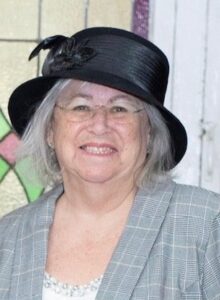 Hanukkah Memory
Hanukkah Memory
My favorite Hanukkah memory!
Fourteen years ago, on the seventh day of Hanukkah, my first grandchild, my first grandson was born. Just after Shabbat, on Rosh Chodesh and Hanukkah! He and his mother were home from the hospital within twenty-four hours! Plans were already in place to celebrate lighting the eight candles at my home, with my son, my daughter-in-law, her parents, brother and sisters, my other son, his fiancée, and my husband – a family together, while we awaited the birth that would further bind us together. Little did we know!
So we packed up the latkes and all met at sundown at the new baby’s home. How more exciting than this, can it get, to enjoy the mitzvah of lighting the Hanukkah candles? Although, I must admit, most of us were gathered around our baby in his bassinet, our camera phones in hand, like paparazzi, while his Saba lit the eight candles in the front window.
Every year as we light the eight candles, I fondly remember that night. This memory will stay with me forever!
This past January (2022), this grandson celebrated becoming Bar Mitzvah. Amazingly, it was also a day to remember. It was the Pandemic. Only fifty people allowed at the morning service at the Kiever Synagogue. Masks and social distancing required. Always thinking ahead, I had booked a hotel in downtown Toronto for my husband and myself, and my other son, with his now, wife, and 9 year old daughter. Just in case.
Ha ha! Two feet of snow overnight. We got stuck three times driving the short distance to the shule. My two sons shovelled part of the parking lot to get our cars in. Only eighteen people made it, including the photographer. The Bar Mitzvah boy was the tenth man to make the minyan. Two magic numbers! Despite the odds, the Torah was read, my grandson became Bar Mitzvah.
They say we make plans and Adonai laughs. So don’t count on things going the way you want. But I say, believe, things work out. Adonai makes miracles too.
May you all create wonderful memories of lighting Hanukkah candles and participating in miracles. From my family to yours, I wish us all miracles, good health and peace. And love. Shabbat Shalom and Chag Hanukkah Sameach!
Shabbat Shalom,
Doreen Bornfreund
WLCJ Kol Ishah Co-Chair
Dbornfreund@rogers.com
December 17, 2022 | 23rd of Kislev, 5783
By Ellie Kremer, WLCJ Israel Chair
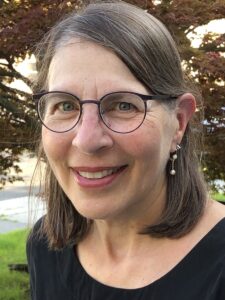
Our own small miracles
It is a curious thing: For Shabbat and for Hanukkah, we light candles, right? But we are not permitted to use the light from those candle flames. How does that work?
For Shabbat, it was the institution of a special lamp to be lit before sunset, so that you could not say “It’s okay, I’ will sit in the dark.” Not only is it an old joke but eating Shabbat dinner in the dark would fly in the face of the injunction of “Oneg Shabbat,” that we are required to enjoy, to delight in Shabbat observance.
The key here is that it is the light from the extra “oneg” lamp you are using to serve, eat, clear, and sing zemirot and Birkat haMazon. The light from other sources — your Shabbat candles — is essentially not in “practical” use.
As for Hanukkah, a similar principle applies: In the Talmud, that 1400-year-old magnificent and challenging work of rabbinic discussion and debate, law and legend, superstition and so much more, the sage Rava speaks of the Hanukkah lights. “Another lamp is required for its light to be used…” (Shabbat 21b)
A millennium and a half later, that is still what we do. How? It is the shammash, the “helper” candle with which we light the other candles required for the particular day of Hanukkah.
The shammash has a more important role than merely being a kind of long-lasting match. Its flame produces light that we may use. When we’re playing dreidel, eating, or reading near the Hanukkah, we are “using” only the light from the shammash; the light from the other candles is incidental. After all, it’s impossible to mark off the exact place where the light from any single candle begins and ends.
Women’s League’s Torah Fund is akin to a shammash. We help light the flames of Jewish life through contributions to our Conservative / Masorti institutions of higher education. As our students go out into the world, spreading the light of our tradition, it is difficult, if not impossible, to attribute a particular teaching, preaching, or reaching out moment to a specific donation.
The light cast through all our efforts illuminates the beauty and wisdom of our sacred texts and our practices and customs. When we light our Hanukkah candles, we recite “she’asa nisim,” a blessing that acknowledges God for having “performed miracles for our ancestors back when”, and for doing so in our day as well.
We can perform our own small miracles of light by contributing to Torah Fund, say, $10 for each day of Hanukkah above our usual contribution. We might not be able to see the light of an individual day’s donation. We will certainly be able to enjoy the bright glow of teaching and learning, inspiration, and insight our future leaders will bring to the Jewish lives of untold numbers of students and congregants, young and old.
Including us!
Shabbat Shalom,
Ellie Kremer
WLCJ Israel Chair
EllieVentnor@gmail.com
December 10, 2022 | 16th of Kislev, 5783
By Anne Schimberg and Karen Winer, WLCJ Jewels in the Crown 2023 Co-Chairs


Jewels in the Crown 2023
Jewels in the Crown. Jewels: people or things that are treasured, esteemed or indispensable. Jewels are our affiliates. The Crown is WLCJ.
For an award, we acknowledge those affiliates who educate, care, support and inspire their women with programs and events, or through the use of programs and events designed and presented by Women’s League.
At the next WLCJ International Convention in 2023, we will again bestow these awards on those Sisterhood Affiliates who meet certain requirements. As we plan for 2023, we are taking into account the pandemic and how it has affected planning and programming.
What is important is that to receive a Jewels in the Crown award, the affiliate must participate or sponsor two programs each fiscal year in each category. For each category there are choices and the affiliate does not have to complete all of the choices, just two.
There will also be information on WLCJ website pertaining to diversity and inclusion initiatives.
In order to apply, an application is found on WLCJ website: https://www.wlcj.org/programs/jewels-in-the-crown-awards/ which needs to be filled out and sent in either snail mail to the Women’s League office: 520 8th Avenue, 4th Floor, New York, NY 10018 or email: jewel@wlcj.org.
It is wonderful to be able to say to the members of your Sisterhood Affiliate, to the members of your synagogue, and to prospective members that yours is an award-winning organization. We look forward to welcoming our newest award-winning affiliates who will be designated a Jewel in the Crown of Women’s League for Conservative Judaism at our Convention in 2023!
Jewels in the Crown 2023 Application Instructions
- A sisterhood/affiliate must participate in or sponsor two programs or projects in each category during each fiscal year between July 2020 and June 2023
- For Jewels in the Crown 2023, there will be three award levels – for one year, two years, and for three years.
- Activities must have occurred, or be scheduled to occur, between July 1, 2020 and June 30, 2023
- Download the form from wlcj.org and return with supporting materials to jewel@wlcj.org as attachments by March 2, 2023.
- Electronic submissions are preferred and must be submitted to jewel@wlcj.org. Materials and forms SHOULD NOT BE SUBMITTED to any other email address. If electronic submission is not possible, please fill out this form and mail the material to WLCJ at 520 8th Avenue, 4th Floor, New York, NY 10018
- Email any questions to: jewel@wlcj.org
Eligibility
To be eligible for a Jewels in the Crown Award, a Sisterhood Affiliate, or a member of one, must fulfill each of the following for each fiscal year between July 2020 and June 2023:
- Submit Women’s League per capita payment on time
- Participate in the Torah Fund Campaign
- Attend a region conference and/or meetings and virtual meetings count!
Categories
Education/Program (Participate in or sponsor two programs each year)
- Official Women’s League Education or other such programs, such as Personal Conversations, WL Reads, Health and Wellness; How to Live Forever, Women in Film, Masorti Days of Study, Sichot beyn Achayot (dialog between Diaspora and Israeli sisters), Makom B’yachad.
- Use of any Women’s League holiday and educational materials: Ruth, Esther, Kohelet, Shir Hashirim, Psalms, Mitzvah Yomit, Yom Yarok, Hiddur Mitzvah, Ushpizot, Divrei Nashim: Words of Our Women, Women’s League Shabbat, Sisterhood Planner
- Participation in the WLCJ Adult Bat Mitzvah Program or participation in an adult Bat Mitzvah program using Etz Chayim He Bat Mitzvah/Adult Jewish Studies Curriculum
- Special interest groups such as Rosh Chodesh or book group, needlework club, Torah yoga, etc.
- Program from the Women’s League Sisterhood Planner (name/date of program)
- 2020 and 2017 programs from previous Jewels in the Crown winners – Download by logging into the Members Only section of the WLCJ website!
- Original or innovative programming of Jewish or general content (such as women’s health, financial planning, nutrition, etc.)
- Programming which directly addresses issues of diversity and inclusion such as LGBTQIA+, disability/differing abilities/autism, Jews of Color, or family status
- WLCJ Hebrew Classes
Community Service/Israel/World Affairs
(Participate in or sponsor two programs each fiscal year)
- Event either planned with or opened to another sisterhood/affiliate or to your region members
- Any type of community service (chesed) project (description required); such as collecting clothes for community shelters; collecting food for food banks; environmental project, etc.; community-wide health initiatives, such as organized walks for any health disorder; health fairs; or the collection of financial donations in support of such programs given that other sorts of collections may have been limited during the pandemic
- Contribute to Masorti Women and/or Kehillot (in Israel)
- Mercaz programming
- Program focused on Israel (such as JNF, Israel Advocacy, etc.)
- Supporting WLCJ community service initiatives such as Stock the Shelves; Support the Girls; Sharsheret; or WLCJ Giving Tuesday which helps support the Masorti Day of Study in Israel
Women’s League Activities
(Participate in or sponsor two programs or activities each fiscal year)
- Schedule a Women’s League Shabbat (on prescribed or other date)
- Schedule a Women’s League Preparation for Shabbat Together: HaChanah L’Shabbat B’Yachad (as some Sisterhoods/affiliates may be unable to celebrate a traditional WL Shabbat during the pandemic due to restrictions on virtual services)
- Invite/include region officers to sisterhood meeting or event; virtual attendance counts!
- President is a member of PrezNet
- Member participates in a WLCJ virtual education program
- Member attends Women’s League Leadership Institute when available
- Member participates in region training for her portfolio (ex: president, Torah Fund, treasurer)
- Schedule or confer with Women’s League consulting services
- Member is registered for Women’s League convention (2023)
- Host region or area meetings when able or a member participates in the planning of such events (as when they are virtual).

Anne Schimberg
Jewels in the Crown 2023 Co-Chair
Jewel@wlcj.org
Karen Winer
Jewels in the Crown 2023 Co-Chair
jewel@wlcj.org
 December 3, 2022 | 9th of Kislev, 5783
December 3, 2022 | 9th of Kislev, 5783
By Lori Snow, Women of the Wall Event Chair and WLCJ/ WOW Liaison
Sacred Feminism
Women’s League and the Women of Reform Judaism (WRJ) are jointly sponsoring a Women of the Wall (WOW) program on Tuesday, December 6 at 12:00 PM EST. This is our second joint program with WRJ sponsoring WOW.
As Women’s League’s liaison to Women of the Wall, I invite you to join us for this special event. Alieza Saltzberg, an educator at Rothberg International School at Hebrew University in Jerusalem, will be speaking with WOW about “Sacred Feminism,” which explores how Jewish women may have been deliberately left out of Halacha’s evolution. (Halacha is the body of legal works that provides guidance on all aspects of life and changes over time to address shifting realities, rooted in the Torah, Midrash, and Talmud.) Sacred Feminism grew out of the need and desire for women to participate in organized Judaism. Ms. Saltzberg developed this curriculum for WOW and will be presenting her work. Please see the flyer below to register.
Women of the Wall fights for all Jewish women to be heard. WLCJ supports these Western Wall liberators who help all women understand the strength and goals of determined Jewish women. With the changing political environment in Israel, we need to ensure the input of strong Jewish women is not lost.
As a reminder every Rosh Chodesh except those falling on Shabbat, WOW meets at the Western Wall to gather and pray. You can find their live Facebook feed at 12:00 AM EST – the evening before Rosh Chodesh in Israel. If you are not a night person, you can watch the video the next day. For more information and to show your support, please use the links below:
To sign up for their newsletter: https://www.womenofthewall.org.il/
To Donate: https://www.womenofthewall.org.il/donate/
To make a Purchase: https://www.womenofthewall.org.il/donate/shop/
Facebook: https://www.facebook.com/womenofthewall to watch Rosh Chodesh and to follow WOW
WOW’s efforts directly affect Judaism and egalitarian progress in Israel as they fight for all Jewish women. We follow WOW’s efforts as they strive for women’s rights in Judaism and religious pluralism in Israel – areas of extreme importance to us in the Diaspora. WLCJ has championed WOW’s mission by purchasing WOW items, providing strong Rosh Chodesh support, and asking members for monetary assistance.
Don’t miss this opportunity to learn about Sacred Feminism and support WOW – who supports us every day in Israel.
My work with WOW falls under Illene Rubin, Chair of World Community Engagement. Be sure to register for the December 6 program!
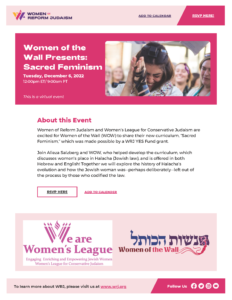
Click here to REGISTER.
Shabbat Shalom,
Lori Snow
Women of the Wall Event Chair and WLCJ/ WOW Liaison
lvsnow@comcast.net
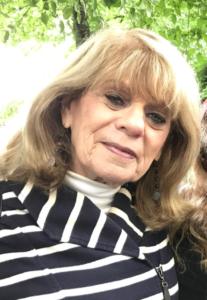 November 19, 2022 | 25th of Cheshvan, 5783
November 19, 2022 | 25th of Cheshvan, 5783
By Florence Wolpoff, WLCJ Board Member and United Nations WLCJ Representative
Update from a WLCJ Representative to the United Nations
On behalf of Lucy Becker, Sandy Koppell and me, Florence Wolpoff, your representatives to the United Nations, I take this opportunity to highlight some of the important activities that took place since our last meeting of the Board of Directors in June 2022.
Each year, as your representatives, we are invited to attend the opening sessions of the General Assembly. There we have the privilege of listening to the Heads of State of each of the member nations.
On September 22, 2022, Yair Lapid, Prime Minister of Israel, addressed the General Assembly. He said, “An agreement with the Palestinians based on a two-state solution is the right thing for the Israeli security for their economy, and for the future of their children”. “Peace is not a compromise, it is the most courageous decision we can make”.
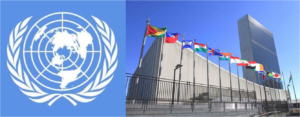 September 23, 2022, marked the third time I heard Mahmoud Abbas, head of the Palestinian Authority, address the General Assembly. Each year his message changes. He declared that Israel does not believe in peace and said, “We do not have an Israeli partner.” He claimed that Israel is exercising terrorism against the Palestinians. He said he wants to live in peace with Israel. In 2019, Abbas spoke of returning to Jerusalem and holding an election. But up to today, he says, Israel has not allowed them to have elections. He called Israel an Apartheid Nation. He wants permanent status at the United Nations. These are just a few of the statements he has made. What was most upsetting was the loud applause he received from the member nations when he finished addressing the assembly.
September 23, 2022, marked the third time I heard Mahmoud Abbas, head of the Palestinian Authority, address the General Assembly. Each year his message changes. He declared that Israel does not believe in peace and said, “We do not have an Israeli partner.” He claimed that Israel is exercising terrorism against the Palestinians. He said he wants to live in peace with Israel. In 2019, Abbas spoke of returning to Jerusalem and holding an election. But up to today, he says, Israel has not allowed them to have elections. He called Israel an Apartheid Nation. He wants permanent status at the United Nations. These are just a few of the statements he has made. What was most upsetting was the loud applause he received from the member nations when he finished addressing the assembly.
On December 10, 2021, the UN Watch reported that in its history, the General Assembly has passed 121 resolutions against Israel and only 45 for the rest of the world combined.
A UN Commission of Inquiry on Israel was created in May 2021 by the Human Rights Council. In October, 2022 the Chairperson of the Commission of Inquiry presented a report citing Israel. The Chairman of the Commission claimed that the report was Law Based. Member nations were given an opportunity to respond to the report. Very few nations came to Israel’s defense. It was painful to listen as nation after nation condemned Israel.
Just before this meeting, the Ambassador representing Israel, Gilad Erdan, addressed the press outside the chamber. He said, “The Commission of Inquiry does not give Israel’s opinion. “The purpose of the Inquiry was to demonize Israel” The organization Stand With Us held an earlier rally in defense of Israel on 47th Street, just outside the UN Building.
On Friday November 11, 2022, the UN Commission of Inquiry approved a draft resolution calling on the International Court of Justice to issue its opinion on the legal consequences of allegedly denying the Palestinian people the right to self-determination. This draft was opposed by Israel who said that this would destroy any chance of peace with the Palestinians.
The vote in the Special Political and Decolonization Committee of the General Assembly was 97 in favor and 17 against, 52 abstentions. The resolution will now go to the 193 member nations of the General Assembly some time in December.
The countries that voted with Israel in opposing the resolution were: Austria, Bulgaria, Canada, Czech Republic, Hungary, Italy, Liberia, Lithuania, Marshall Islands, Micronesia, Nauro, Palau and the United States.
The United Kingdom and France were two of the nations that abstained. All Arab nations voted in favor of the resolution. Even Ukraine voted in favor of the resolution. The opinion by the International Court is non-binding. U N Ambassador Riyad Mansour, thanked the Assembly and then went on to say: “There will be a day when our people {Palestinians} will bring the flag over the churches of Jerusalem and to the Mosques of Jerusalem and Haram-al Sharif referring to the Muslim name for the Temple Mount.”
In September, Sandy Koppell arranged for a tour to explore the UN Gardens. The tour was a successful but only open to twenty participants.
Some good news to report: The President of the General Assembly is from Hungary. I believe he had been the Hungarian Ambassador to Israel. In his capacity as President, he advertised a position in his cabinet. Sarah Weiss Maud, the Chief Legal Advisor at the Israeli Mission, applied and was chosen. This is the first time that an Israeli has been recognized in such a way. Some of our Women’s League members met her when Lucy Becker arranged a meeting with the Israeli Mission before the pandemic.
Each year on January 27 Holocaust Remembrance Day is commemorated at the UN. This event is open to the public. As the information for this year is sent to me, I will share it with WLCJ. I believe it will also be on Zoom.
Shabbat Shalom,
Florence Wolpoff
WLCJ Board Member and United Nations WLCJ Representative
florence.wolpoff@verizon.net
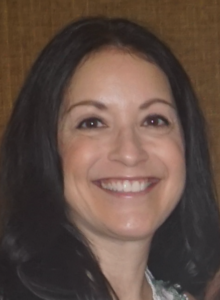
October 29, 2022 | 4th of Cheshvan, 5783
By Grace Schessler, WLCJ Vice President and Program Chair
In Pursuit of Knowledge
We all come to Judaism from our own backgrounds and perspectives. During my term as BQLI Region President, I wrote a weekly letter for our Shabbat Greetings newsletter. To begin this process each week, I’d read the Torah parashah, along with many commentaries, while giving thoughtful consideration as to how its major themes related to my life or our ever-changing world. After three trips around the sun, I’d learned more Torah than I had in all my years of 3-day-a-week Hebrew School, and, as a bonus, I shared a great deal of personal information with my Women’s League Sisters which built a very special connection! Additionally, I discovered a level of personal introspection I didn’t know I possessed.
 On Monday evening, November 7th at 7:00PM, Women’s League is honored to share a special program with our community featuring internationally renowned Israeli artist, Avner Moriah. Raised a secular Jew in the Abu Tor neighborhood of Jerusalem, Moriah served in the Yom Kippur War, sharing in a recent Jerusalem Post article that he felt, “The (Israeli) political leadership just threw us into battle and sacrificed our youth forever.” It was many years later, after Moriah had earned his Master’s of Fine Arts degree at Yale University, when he set off to New York where he channeled his feelings about the war into his artwork. His time in New York proved to be life changing as he began to engage in the city’s vibrant Jewish community and befriended synagogue patrons like Gershon Kekst, z”l, then chairman of the board of the Jewish Theological Seminary. Kekst commissioned Moriah to create panels on “The Gathering at Mount Sinai” for JTS, which he completed in 1999. This commission proved to be the impetus of the artist’s foray into illuminating Jewish texts and themes. Moriah spent many hours studying how biblical texts are interwoven into traditional Jewish rituals. As Moriah studied the texts he would visualize them in pictures. Though still decisively secular, Moriah is enthusiastically connected to his Jewish heritage and Israel.
On Monday evening, November 7th at 7:00PM, Women’s League is honored to share a special program with our community featuring internationally renowned Israeli artist, Avner Moriah. Raised a secular Jew in the Abu Tor neighborhood of Jerusalem, Moriah served in the Yom Kippur War, sharing in a recent Jerusalem Post article that he felt, “The (Israeli) political leadership just threw us into battle and sacrificed our youth forever.” It was many years later, after Moriah had earned his Master’s of Fine Arts degree at Yale University, when he set off to New York where he channeled his feelings about the war into his artwork. His time in New York proved to be life changing as he began to engage in the city’s vibrant Jewish community and befriended synagogue patrons like Gershon Kekst, z”l, then chairman of the board of the Jewish Theological Seminary. Kekst commissioned Moriah to create panels on “The Gathering at Mount Sinai” for JTS, which he completed in 1999. This commission proved to be the impetus of the artist’s foray into illuminating Jewish texts and themes. Moriah spent many hours studying how biblical texts are interwoven into traditional Jewish rituals. As Moriah studied the texts he would visualize them in pictures. Though still decisively secular, Moriah is enthusiastically connected to his Jewish heritage and Israel.
Take a moment to reflect on what (or who) has inspired your journey through Judaism? Do you want to learn for the sake of knowledge? To feel more connected to other like-minded women? To cultivate a career path? Whatever the genesis of your journey might be, the pursuit of knowledge and the development of intellect is mightily motivating.
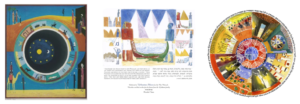 Register HERE to meet Avner Moriah, and to learn more about what motivates him as an artist.
Register HERE to meet Avner Moriah, and to learn more about what motivates him as an artist.
To read the Jerusalem Post article about Avner Moriah click HERE.
To familiarize yourself with his work, you can go to: Avner Moriah’s Website. All WLCJ members will enjoy a generous discount (CODE: WL2022) on all art on this website!
Shabbat Shalom,
Grace Schessler
WLCJ Vice President and Program Chair
gschessler@wlcj.org
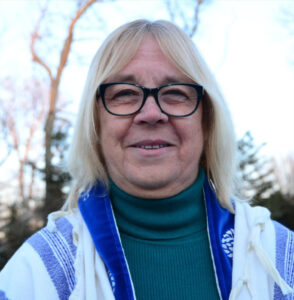 October 8, 2022 | 13th of Tishrei, 5783
October 8, 2022 | 13th of Tishrei, 5783
By Rabbi Margie Cella, WLCJ Educator
MiDor L’Dor – From Generation to Generation
Each of us is a unique Jewish woman, whose identity was shaped and molded by the women who preceded us. Who were the women who passed their Jewish values down to you—Mother(s) Grandmother(s)? Aunts? Sisters? Friends? Teachers?
In addition, we, the Conservative/Masorti women of today are the beneficiaries of the many opportunities that have been opened for us through the struggles of generations of Jewish feminists who came before us—especially in the last one hundred years, since Judith Kaplan became the first woman to celebrate a Bat Mitzvah in 1922.
Together we commit ourselves to passing on our values to the next generations—our daughters and granddaughters, nieces, and students—and to continue to strive for increasing the number of roles and opportunities that will be available for them.
These are the topics that we will be exploring in this year’s Sichot beyn Achayot, Conversations Between Sisters, program, a series of three zoom workshops, made possible through a generous grant from Keren Kayemet L’Yisrael (KKL-JNF) and Masorti Olami and MERCAZ Olami. Each workshop will feature well-known speakers from both the United States and Israel engaged in conversations about our lives as Jewish women.
Please join us on Thursday, October 20, Sunday, November 20, and Sunday, December 11, at noon eastern, via zoom. Registration is now open through the links in the attached flyer; you may sign up for one, two, or all three workshops. I invite you to become a part of the global conversation.
REGISTER for ALL Three Workshops
Shabbat Shalom,
Rabbi Margie Cella
WLCJ Educator
mcella@wlcj.org
 September 24, 2022 | 28th of Elul, 5782
September 24, 2022 | 28th of Elul, 5782
By Ellie Kremer, WLCJ Israel Chair
Zoom: Keeping us Connected through ongoing Israel online programs
Hurray for Zoom! Why? Zoom has helped us connect with our Masorti women in Israel and Zoom can help you too! Currently WLCJ has three ongoing Israel programs:
Women’s Days of Study — an opportunity to learn and dialog with some of the best teachers in Israel. Each day has multi approaches to a theme chosen by committee of Israeli women with input by the WLCJ Israel Chair. Part of the funding for these three days (two in the winter and one in June) is raised on GivingTuesday, on Tuesday, November 29, 2022.
Mothers of Olim — Monthly Zoom calls connect WLCJ members who have child/ren, grandchild/ren, favorite nieces or nephews who have made Aliyah, for emotional support, travel information and navigating life from a distance are some of the issues discussed.
The KKL (Keren Kayemet L’Yisrael Grant program Sichot beyn Achayot: Conversations between Sisters – MiDor L’Dor is in its second year, sponsored by Keren Kayemet L’Yisrael (KKL). Plan now to attend any or all of the three free 1 ½ hour sessions: Thursday, October 20; Sunday, November 20, and Sunday, December 11, at noon eastern.
REGISTER for ALL Three Workshops
Thursday, 10.20.22 at 12-1:30 PM ET/7-8:30PM Israel Time
Workshop One – MiDor L’Dor: Transmitting Our Jewish Values to the Next Generation
How do we connect to the next generation to make Judaism relevant for today and tomorrow? We will explore the various settings of educating our children: formal, informal, and in the family and community.
Speakers:
Prof. Alice Shalvi, Founder of Women’s Rights Movement in Israel and Israel Prize recipient for her contribution to education
Shira D. Epstein, Ed.D, dean, William Davidson Graduate School of Education, JTS
Rabbi Nathalie Lastreger, Kehilat HaMinyan HaMishpachti, Kfar Vradim, Upper Gallilee
Amy Skopp Cooper, director of the National Ramah Commission, US
Aliza Zeff, Director and Head of School, Tichon Ramah Yerushalayim
REGISTER for Workshop One
Sunday, 11.20.22 at 12-1:30 PM ET/7-8:30PM Israel Time
Workshop Two – MiDor L’Dor: Revering and Honoring the Generations Until 120
How do we maintain value and meaning in our lives at every age? We will discuss the importance of self-care, as well as ideas for caregivers, as we honor the generations that gave us our Jewish values.
Speakers:
Prof. Alice Shalvi, Founder of Women’s Rights Movement in Israel and Israel Prize recipient for her contribution to education
Rabbi Judith Hauptman, Professor Emerita of Talmud and Rabbinic Culture, JTS
Rabbi Miriam Berkowitz, accredited Hospital Chaplain/Spiritual Caregiver, Jerusalem
Rabbi Tracee Rosen, Hospital Chaplain, Phoenix, Arizona
Rabbi Judith Edelman-Green, Pastoral Caregiver and Educator, Kfar Saba
REGISTER for Workshop Two
Sunday, 12.11.22 at 12-1:30 PM ET/7-8:30PM Israel Time
Workshop Three – MiDor L’Dor: Taking the 100-Year Journey from Bat Mitzvah to Egalitarianism
How did the first bat mitzvah lead to the expanded roles for Jewish women, both in the synagogue and the community? We will explore how things have changed in the last 100 years and ponder what the next 100 may bring.
Speakers:
Prof. Alice Shalvi, Founder of Women’s Rights Movement in Israel and Israel Prize recipient for her contribution to education
Chancellor Shuly Rubin Schwartz, JTS Chancellor and Irving Lehrman Research Professor of American Jewish History
Saralee Schrell-Fox, educator and chazzanit, Jerusalem
Rabba Dikla Druckman-Sherzer, Fuchsberg Center, Jerusalem
REGISTER for Workshop Three
Have you thought about having a region — twin Kehilah program as part of your spring region training conference? Several regions have: Florida Region, Garden State Region, North by NorthWest, Southern Region, and International North East Region. Zoom can also offer more intimate meetings — coffees, teas, tours, bingo games, or mitzvah projects.
All of these programs raise our understanding of each other — our common issues we all share as Jewish women and our differences — living 6,000 miles apart in different cultures.
On pages 112 and 113 of your new WLCJ Calendar Diary, you will find the Region/Israel Special Relationship Masorti Congregations. As individual contact people change, either Diane Friedgut, our WLCJ Israel Liaison, or I will be happy to help you find names of the contact person from each Kehila.
So, use Zoom to your advantage! And say Hurray to the new relationships we will form with our sisters!
With best wishes for a Shanah of health, joy and peace,
Ellie Kremer
WLCJ Israel Chair
ellieventnor@gmail.com
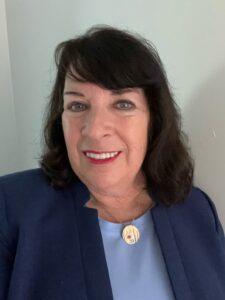 September 17, 2022 | 21st of Elul, 5782
September 17, 2022 | 21st of Elul, 5782
By Vivian Leber, WLCJ Personal Conversations Chair and WLCJ Board Member
The “Before” Faces of the Holocaust’s Children: A film made with Respect and Love
My husband, Mark, and I never knew our grandparents—all were Holocaust victims. My late father-in-law was one of only seven Holocaust survivors among 5,000 Jews in his town in Poland. That drew us, over Labor Day weekend, to view a critically acclaimed documentary, Three Minutes: A Lengthening, in Manhattan, which has won an award from Yad Vashem for Cinematic Excellence in a Holocaust Documentary.
This remarkable film had its origins in a grandson’s search for a home movie that he knew his late grandfather, David Kurtz, had made in August, 1938. When Glenn Kurtz found it in his parents’ closet in Florida, the 16 mm reel was in a state of advanced decay. Recognizing its historic significance as a visual record of ordinary people soon to disappear in the maw of the Holocaust, Glenn donated it to the US Holocaust Memorial Museum, which arranged to have it restored. He also tracked down clues from the film to research and write a book; through luck, he even found a survivor, a boy seen in the film, who helped to identify some of the townspeople.
The elder Kurtz had come to the US as a young child, prospered here, and returned on a grand tour of Europe. This included a visit to his birthplace, the small town of Nasielsk, in Poland. Using his new handheld movie camera, he recorded a silent film in color, which was intended, along with all footage from his tour, only for his private viewing. In the three-minute recording in Nasielsk, as the camera pans the buildings, some of the town’s 3000 Jews steal the scenes, mostly youngsters who tussle to be captured by the new-fangled gadget. We also see a big crowd spilling out from the town’s synagogue onto the street.
There are an infinite number of ways to retell the Holocaust and parse its meaning, and this film contributes a unique and moving record of that vast story. British Jewish film star Helen Bonham-Carter is the main narrator, interspersed with others, including Glenn. As the three minutes are closely dissected, we catch glimpses of the living spirit of those doomed souls. We learn of the Nazis’ invasion and tortuous capture of the town’s Jews, and their subsequent deportation, which occurs 16 months after they had stood, smiling, before the camera. Only 100 of the town’s Jews are known to have survived. My husband and I never grow tired of fresh new takes on personal Holocaust stories. We’re missing so many details of our own family story that this visual evidence through film feels to us as an homage to our own lost relatives.
I’m grateful that, through my role as Chair of WLCJ’s Personal Conversations, I was introduced in June to WLCJ Southern Region Treasurer, Marsha Raimi (West End Synagogue Sisterhood, Nashville, TN). Marsha told me about the film and explained her personal connections to it.
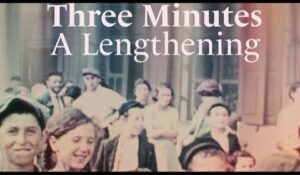 “In preparation for our 2018 trip to Poland with our husbands, my sister suggested that I read Glenn’s 2014 book “Three Minutes in Poland,” because our father was mentioned in it as having come from Nasielsk. This was a revelation to me. Dad was an Auschwitz survivor who spoke of it often and recorded testimony for the USC Shoah Foundation and Yad Vashem, but he only ever talked about his town of Mlawa. I realized that his father (my grandfather) was born in Nasielsk and moved to Mlawa when he married. My grandmother’s last name was the same as the people in Nasielsk who owned the button factory described in the film. As in the movie, the details of my ancestors’ lives came to life for me, and I had to know more. I joined Glenn’s Facebook page for the descendants of Nasielsk’s Jews, and I began doing genealogical research. When the film premiered at Sundance, I watched it online. So when Glenn arranged two days of events related to the film’s premier this May in Poland, I felt compelled to return. Now, Holocaust remembrance, reconciliation with our former Polish neighbors, and prevention of future genocides is my mission.” To hear more of Marsha’s story, go to this podcast by her local Jewish newspaper: https://www.jewishobservernashville.org/our-podcast/conversation-with-marsha-raimi-journey-into-the-past.
“In preparation for our 2018 trip to Poland with our husbands, my sister suggested that I read Glenn’s 2014 book “Three Minutes in Poland,” because our father was mentioned in it as having come from Nasielsk. This was a revelation to me. Dad was an Auschwitz survivor who spoke of it often and recorded testimony for the USC Shoah Foundation and Yad Vashem, but he only ever talked about his town of Mlawa. I realized that his father (my grandfather) was born in Nasielsk and moved to Mlawa when he married. My grandmother’s last name was the same as the people in Nasielsk who owned the button factory described in the film. As in the movie, the details of my ancestors’ lives came to life for me, and I had to know more. I joined Glenn’s Facebook page for the descendants of Nasielsk’s Jews, and I began doing genealogical research. When the film premiered at Sundance, I watched it online. So when Glenn arranged two days of events related to the film’s premier this May in Poland, I felt compelled to return. Now, Holocaust remembrance, reconciliation with our former Polish neighbors, and prevention of future genocides is my mission.” To hear more of Marsha’s story, go to this podcast by her local Jewish newspaper: https://www.jewishobservernashville.org/our-podcast/conversation-with-marsha-raimi-journey-into-the-past.
The documentary was written and directed by Bianca Stigter, who points out the power of the film medium to memorialize ordinary people—lost, not only to time, but in this case, also to horrific violence. Reviewers have given the film their highest ratings. Runtime is 72 minutes. Go to https://superltd.com/films/three-minutes-a-lengthening for the official trailer, reviews and current theatrical screenings. It is expected to be on several digital platforms beginning September 20th.
Shabbat Shalom,
Vivian Leber
WLCJ Personal Conversations Chair and WLCJ Board Member
vleber@wlcj.org
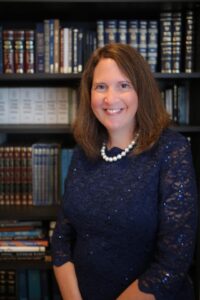 September 10, 2022 | 14th of Elul, 5782
September 10, 2022 | 14th of Elul, 5782
By Rabbi Ellen S. Wolintz-Fields, WLCJ Executive Director
125th Anniversary of the First Zionist Congress – An Experience of a Lifetime
It is difficult to put into just a few words the incredible experience I had recently when I had the honor and privilege to represent Women’s League for Conservative Judaism as part of the Mercaz delegation to the 125th Anniversary of the First Zionist Congress. We began this magical celebration with a Shabbaton in Zurich, Switzerland and then journeyed to Basel, Switzerland for the World Zionist Organization 125th Anniversary events. Over the course of Shabbat, I was able to reacquaint myself with long time friends, and also new friends, who gathered from the four corners of the earth – to comprise the Mercaz Delegation. Our delegation consisted of representatives of the Mercaz Olami and Masorti Olami community, from places such as France, Brazil, Argentina, Australia, Spain, Israel, Hungary, USA and Canada. We took a Friday afternoon guided tour of Zurich, prayed together, learned together, ate, sang and conversed. I learned that we are alive and strong as a Global Masorti / Conservative community, and have much to be proud of. I was privileged to lead Maariv at the end of Shabbat, and was filled with emotion, as the entire Jewish Community that evening began the twice daily custom of reciting Psalm 27, from the beginning of Rosh Chodesh Elul unil Hoshanah Rabbah. It was a sense of irony and pride, as I led our Mercaz delegation in Maariv, wearing my new Torah Fund pin, Hazak, reciting the words of Psalm 27, which include our Torah Fund theme this year – “Chazak v’Yametz lebechah v’kaveh el Adonai” Be Strong, Take Courage, and Hope in Adonai.” It was a true honor to represent Women’s League for Conservative Judaism at this powerful Shabbaton, with the leaders of the Conservative / Masorti Movement. WLCJ has a seat at the table, and we have earned respect from all parts of the Masorti movement, worldwide. Meeting all these Masorti representatives truly will help us continue the initiative that Illene Rubin leads, as our WLCJ Chair of World Community Engagement, now that I have made friends with leadership in Australia, Argentina, Brazil, Hungary, Spain, and Israel, who have learned about our WLCJ mission.
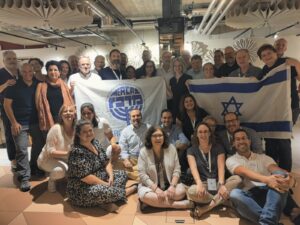 Our Mercaz delegation arrived in Basel, Switzerland on Sunday, August 28, on our own reserved train car, after a spiritual ride which included the sounding of the Shofar. While enjoying lunch in the Messe Conference Center in Basel, a woman working for the Conference production team came over to me and asked me if I was a rabbi, and when I said yes, she said she loved me, and was so proud of me – one of the many memorable interactions I had with people over the course of my time in Switzerland.
Our Mercaz delegation arrived in Basel, Switzerland on Sunday, August 28, on our own reserved train car, after a spiritual ride which included the sounding of the Shofar. While enjoying lunch in the Messe Conference Center in Basel, a woman working for the Conference production team came over to me and asked me if I was a rabbi, and when I said yes, she said she loved me, and was so proud of me – one of the many memorable interactions I had with people over the course of my time in Switzerland.
There were two tracks at the conference: The Herzl Social Impact Entrepreneurship Summit and the Herzl Leadership Conference. The sessions were inspirational and meaningful, and our entire Mercaz / Masorti delegation kvelled when we had our own people presenting in plenary sessions – such as Rabbis Elliot Cosgrove, David Wolpe, and Tamar Elad-Appelbaum, Chancellor Shuly Rubin Schwartz, Sarah Lipsey Brockman, and opening remarks from our very own Dr. Yizhar Hess, Vice Chairman of the World Zionist Organizaton. Some of the most impactful speakers were people like Miriam Peretz, Israel Prize Winner for Lifetime Achievement for “Strengthening the Jewish-Israeli Spirit,” whose two sons both died while serving in the Israel Defense Force (IDF), who spoke on “The Heroism of Life”; Yossi Cohen, Former Director of The Mossad and Head of SoftBank Investment Advisers, Israel, who spoke on “Israel’s Vision and National Security”; Brooke Goldstein, Founder and Executive Director, The Lawfare Project & Founder, #EndJewHatred, and Joanna Landau, Founder and CEO of Vibe Israel, who both were on a plenary discussing “The Everyday Battle – Fighting the Disinformation.” Every session was informative and gave much food for thought. My head is still spinning from all I learned during such sessions as, “Hertz’s Two Ideas: One that changed the past and the other that will change the future”; “Israel 2048 – Herzl’s Vision in the 21st century”; “Unity and Solidarity within the Jewish People”; “The complex business of living the Zionist dream”; “A 21st Century Zionism for a 21st Century people”; “Combating Antisemitism and fostering Jewish life in Europe and Worldwide – The implementation of the EU Strategy”; “The New Jews – The Mosaic of identities in the USA”; “Z3 – Zionism in the Next Era.”
Monday night was the Gala Event of the 125th Anniversary of the First Zionist Congress at Stadtcasino Basel, the location where Theodore Herzl held the very first Zionist Congress, where people both 125 years ago, and in 2022, were instructed to dress in their best – some even in tuxedos and white bow ties, and even some top hats. Descendants of the very first Zionist Congress Delegates spoke and President Isaac Herzog addressed all gathered. The previous day the Conference production company created a video of the participants – and I was excited to even have a cameo in that – with my new friends, while we sang and waved our flags of Israel.
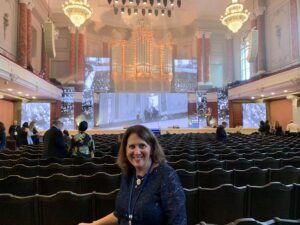 Tuesday, we wrapped up our magical days in Basel, once again being addressed by President Herzog and posing for pictures on the very same hotel balcony at the Les Trois Rois Hotel in Basel, where Herzl took his famous picture looking out onto the Rhine River, dreaming of the creation of the State of Israel.
Tuesday, we wrapped up our magical days in Basel, once again being addressed by President Herzog and posing for pictures on the very same hotel balcony at the Les Trois Rois Hotel in Basel, where Herzl took his famous picture looking out onto the Rhine River, dreaming of the creation of the State of Israel.
The days in Basel were thought provoking and left me with even more to ponder. But that is for another Shabbat message… stay tuned! However, a truly important take away that I will conclude this Shabbat message with, is that all of our membership in Mercaz USA/Canada, the Zionist organization of the Masorti (Conservative) Movement is extremely important because that is how we can continue Herzl’s dream. Mercaz represents Masorti Judaism within the World Zionist Organization and Congress, the Jewish Agency for Israel, the American Zionist Movement, and the Jewish National Fund. Mercaz is the force that advocates for funding of pluralistic streams of Judaism in Israel through the World Zionist Congress, which is crucial to our movement’s growth in Israel and around the globe. We must continue Herzl’s dream by supporting the State of Israel, by belonging to our organization that gives the Conservative / Masorti Movement a voice in Israel today. Become a member of Mercaz (https://www.mercazusa.org/support-us/membership/ or in Canada https://mercaz.ca/join-mercaz/) and make sure that when it is time to vote for the World Zionist Congress in 2025, we vote for Mercaz. Am Yisrael Chai !
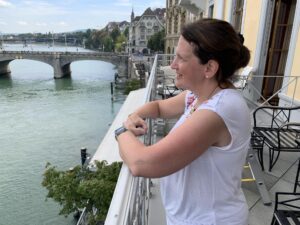 Shabbat Shalom,
Shabbat Shalom,
Rabbi Ellen S. Wolintz-Fields
WLCJ Executive Director
ewolintz-fields@wlcj.org
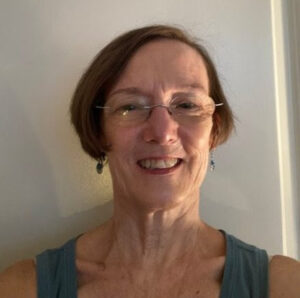 August 20, 2022 | 23rd of Av, 5782
August 20, 2022 | 23rd of Av, 5782
By Pam Hudson, Individual Member MetroNorth
Finding Makom B’Yachad
I am a Jew by Choice. These days, one could say that all of us are Jews by Choice because of the effort it takes to maintain a Jewish identity in this society, but I am one of those Jews who formally converted.
I grew up Roman Catholic. I attended Catholic grade school in the 1960’s. In my neighborhood, when strangers met, as a way of introduction they would ask each other what parish they belonged to. Where I lived, Protestants were The Other; Jews weren’t even on the radar screen.
So, it came as a shock to my family when, many years later, I told them I was converting to Judaism. But the truth was that this process had been happening for just as many years. Even though I had no exposure to Judaism growing up, my Jewish soul was giving me signals, little flashes of light that, when I connected the dots, led to the path I knew my soul needed to take.The books I was drawn to, the music that moved me, came from a tradition that valued the human being as a pure yet complex soul, not a person who was born bad. Judaism creates a community that does not claim to have all the answers to the most troubling questions of life, but it compels us to struggle together with those questions in an attempt to get closer to the Divine. Instead of restricting worship to a hierarchy of clergy, Judaism expects that each of us be literate and active in our worship services. I love that!
I came to Makom B’Yachad as an individual member because this group combines strong Jewish literacy with spirituality and a commitment to social justice, while giving me a circle of support. During each Makom B’Yachad session, the recitation of Misheberach, Kaddish, and the Daily Psalm grounds us in our rich tradition. In addition, the weekly lessons give each of us an opportunity to teach and learn from each other.
I have found my home in Judaism, and I have found a warm and supportive community in Makom B’Yachad. I think you will too. It’s a community you can join from anywhere!
Many thanks to my friend Debbie Lempert for introducing me to this group!
Pam Hudson
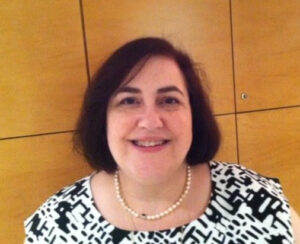 July 30, 2022 | 2nd of Av, 5782
July 30, 2022 | 2nd of Av, 5782
By Mindy Steinholz, Health and Wellness Chair
Health and Wellness: Suicide Prevention
It has been said that suicide is a permanent solution to a temporary problem. But help is out there for people who are suffering. People who are in crisis need to know that there are ways of reaching out.
According to the American Foundation for Suicide Prevention, suicide is the 12th leading cause of death in the United States. In 2020, over 45,000 Americans died by suicide and there were an estimated 1.20 million suicide attempts. According to the Canadian government, an average of more than 10 Canadians die by suicide each day. According to the University of Haifa, the number of suicide attempts in Israel increased linearly between 2013 – 2020 but actually decreased during the Coronavirus lockdowns.
On July 16, 2022, the United States debuted the three-digit National Suicide Prevention Lifeline, 988. This was the result of the work of many advocacy groups including the American Foundation for Suicide Prevention and the National Suicide Prevention Lifeline. This number is a direct connection for anyone in need of support for mental health distress, which includes thoughts of suicide, substance abuse crisis, and emotional distress. This is a free service, available to anyone. There are interpretation services available in over 150 languages; Spanish speakers can access that language by pressing 2 and veterans can access specialized services by pressing 1. The original lifeline number, 800-273-8255, is still available. Using this service will also help by going directly to mental health support services as opposed to calling 911, which is not set up for such services.
Canada has a suicide prevention number, 1-833-456-4566 which is available 24/7/365. The text line in Canada is 45645 available from 4 PM to 12 MN Eastern Time. In Israel, the suicide hotline is *3201 (dial 1 for English).
Wishing all a happy, healthy, safe summer,
Mindy Steinholz
Health and Wellness Chair
msteinholz@wlcj.org
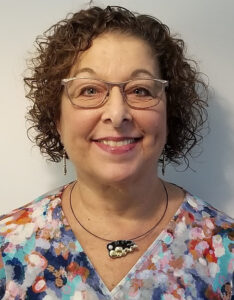 May 14, 2022 | 13th of Iyar, 5782
May 14, 2022 | 13th of Iyar, 5782
By Jeanette M. Brownstein, Florida Region President
Together Again… but in Good Health
“Mann Tracht, Un Gott Lacht” Man/Woman Plans and God Laughs. We have all certainly learned over the past two-plus years that life is unpredictable, but we women have overcome these bumps in the road and have repeatedly refocused and moved on with new and creative ideas and programs.
The Florida Region had planned a hybrid (in-person and virtual options) Shabbaton/Retreat for the first weekend in May.
Unfortunately, due to COVID exposure to some of the volunteers who were directly involved with the implementation of the weekend, plans were abruptly changed early on Erev Shabbat, and we pivoted to a full virtual event for Sunday only and canceled the Shabbaton. A difficult decision was made in consultation with the host synagogue leadership, Florida Region WLCJ leadership, the weekend’s leadership, and the WLCJ Executive Director, International President, and Medical Chair.
We certainly tried to create a safe in-person/virtual event where we could be “Together Again”. Food was bought, the chicken was defrosting, centerpieces were made, welcome bags were ready to be delivered to the hotel, name tags were made, special added touches made by the host affiliate members were completed, tables and tablecloths for our outdoor meals were ready to be put in place, complicated electronics were prepared for this hybrid event, prayer books for the Rosh Chodesh celebration were ready as were copies of the Megillah Ruth which we were to study, individual spice bags were made for Havdalah, sticks were collected for our marshmallow toasting at our planned kumzits, mitzvah project donations for a local women’s shelter were ready to be brought from around the state and so on and so on.
To say we were sad and disappointed is an understatement. But in a few hours’ time, our village of Sisters worked B’Yachad and pivoted to a one-day-only virtual event. Phone calls were made and emails were sent to eager volunteers who were to prepare the weekend’s meals, e-mails and phone calls were made to those about to travel from around the state, hotel reservations were canceled, emails were sent to all registered participants about the change in plans with new details for the now one-day Zoom event, food was repurposed, returned and donated, centerpieces were put away for future events, many, many supplies were put back into their storage places and arrangements were made to collect and ship the mitzvah project donations from around the state. Each session had to be rethought to accommodate everyone on Zoom and new PowerPoint presentations had to be created for the now totally virtual event.
Money will be refunded, and the details above may become a distant memory, our disappointment will wane, but what we won’t forget is how our Sisters from around the Region worked together in a very short period of time to turn one of those “unpredictable life events” into a wonderful, memorable, positive day that we in the Fabulous Florida Region can be proud of.
What did we learn from all of this? Preserving a life takes precedent over everything. Pikuach Nefesh, one of our most important Jewish principles, teaches us that safeguarding the health of individuals takes priority over everything. And, of course, that our sisters of Women’s League can rise to any occasion on a moment’s notice. But most importantly we are all safe, healthy, and had the opportunity to spend an incredibly uplifting, educational day Together/B’Yachad on Zoom. All involved were inspired by the special day that came out of this experience, and we will look forward to the future when we can try again to be together in person.
Yes, it was disappointing and yes, it was an overwhelming amount of preparation that we did not get to see come to fruition. And YES, we were still able to be B’Yachad for one day of the full weekend that had been planned, but most importantly we are all healthy and are able to celebrate another Shabbat with our family, friends, and loved ones.
Shabbat Shalom!
Jeanette M. Brownstein
Florida Region President
flpresident21@wlcj.org
May 7, 2022 | 6th of Iyar, 5782
By Debbi Kaner Goldich, International President
Mother’s Day
Hallmark recently reported that Mother’s Day is the holiday when more cards are sold than any other. It is the most commercially successful, even more than Christmas and Valentine’s Day. Mother’s Day is not a public holiday in USA or Canada yet it is honored as a legal National one. Since last week, everyone has been wishing me a Happy Mother’s Day if I will not see them or speak to them until after May 8.
This Mother’s Day will be somewhat difficult for me. My beloved mother in law passed away four weeks ago and my own mother passed away almost four years ago leaving me without a mother to celebrate for the first time in my life. My mother and mother in law held a special friendship. As a working mother I often depended on the fact that they would speak to each other and I would not have to connect with both of them to tell the same story. They bonded over the love of children and grandchildren. Their values were similar and they shared varied interests. They looked forward to celebrating Mother’s Day together every year with my extended family of siblings and nieces and nephews. To say I was lucky is an understatement!

I recognize and appreciate that I know women who have not had a mother for more than four years or not have a mother in law for more than one month. I also recognize and appreciate that there are many women who are not mothers because they have lost a child through death, abortion, miscarriage or estrangement. And, I recognize and appreciate that some women are not grandmothers or mothers in law, though they desperately wish for that.
How do we, as a women’s organization, express care and show sensitivity to those around us not celebrating as joyfully or not at all with those who are? Many of you reached out to me after I lost my mother in law to tell me stories of yours. Some stories were of genuine love and others asked me about my wonderful relationship with mine. Many of you sent emails and Torah Fund Cards and made donations to WLCJ. Reaching out through phone calls, emails and donations are what we do best at Sisterhood and Women’s League. We support our sisters with love and care at all times. I loved hearing from all of you. I loved your stories and your memories. I loved knowing you cared about me and that you cared about my family. I loved that you attended the service on Zoom and told me how special my sons are and how eloquently they spoke about their grandmother. I loved that 74 of you showed up on Zoom shiva and greeted my husband with introductions of how we know each other. (After all these years he knew many of you by sight or by name.) I cannot thank you enough for the love and support you showed the Goldich family at this time.
To those of you who celebrate, I wish you a meaningful and happy day with your families. To those of you who do not, for whatever reason, my thoughts are with you. You may not be a mother, mother in law or a grandmother, but you are special to your Women’s League sisters and to me. Thank you for all you do to make us the organization we are.
Shabbat shalom,
Debbi
Debbi Kaner Goldich
WLCJ International President
dgoldich@wlcj.org
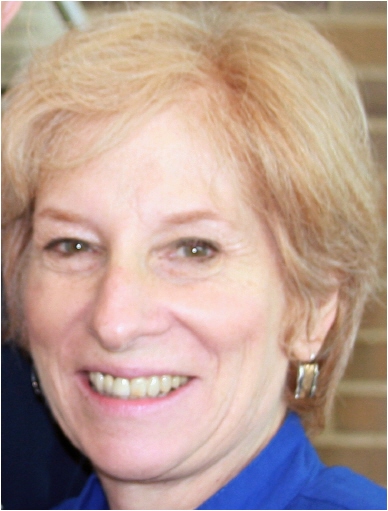 April 2, 2022 | 1st of Nisan, 5782
April 2, 2022 | 1st of Nisan, 5782
By Edna Schrank, Convention Chair
Sisters Celebrating Together!
That is the theme of our WLCJ International Convention 2023, beautifully communicated in the Convention logo below. Personally, I cannot wait to get together with my WLCJ sisters in person! Though you likely don’t have a paper calendar for 2023 yet, mark your digital calendars for Sunday, July 16 through Wednesday, July 19, 2023; destination, Schaumburg, IL!!!! A very short cab ride from O’Hare International Airport.
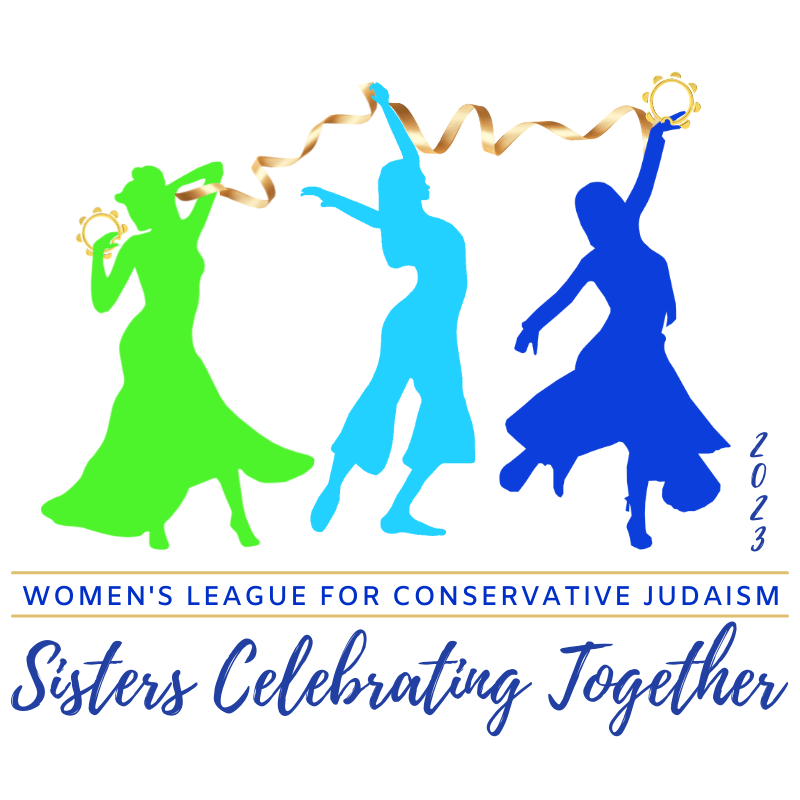 We feel our Convention logo (designed by our very own Karen Ballena) perfectly sets the mood for our festivities. During Shacharit on Monday morning of Convention, we will be celebrating the B’not Mitzvah of 40 WL sisters. This very special occasion, truly the first of its kind, will be the culmination of their three years of study and we plan to make it a very joyous event.
We feel our Convention logo (designed by our very own Karen Ballena) perfectly sets the mood for our festivities. During Shacharit on Monday morning of Convention, we will be celebrating the B’not Mitzvah of 40 WL sisters. This very special occasion, truly the first of its kind, will be the culmination of their three years of study and we plan to make it a very joyous event.
Our programs throughout Convention will provide you the opportunity to embrace our programming theme, Kol Yisrael Arevim Zeh Ba’Zeh: We Are All Connected. We look forward to connecting with our sisters in global communities around the world.
Convention will be the perfect opportunity to literally embrace (as in hug in-person) the women you have become so connected to over Zoom during the pandemic. Personally, I can’t wait to actually be in the same room with my Makom B’Yachad friends, with whom I kibbitz and learn several times a week. I know others feel similarly about the women they see weekly in their Bat Mitzvah and/or Hebrew class.
We have many things to celebrate during Convention: the conclusion of the 80th Anniversary of Torah Fund our 2018-2021 Region Presidents, International Board, and International Past President, Margie Miller our 2020-2023 Region Presidents, International Board, and current International President, Debbi Kaner Goldich and Installation of our 2023-2026 International Board and President
This Convention will also be our first multi-access Convention, welcoming delegates in-person and virtually. To do this successfully, we need your help. Shortly after Pesach you will be receiving a brief survey asking about how you anticipate participating in Convention. Please take a few minutes to complete it. We want to make this Convention the best ever!
Shabbat Shalom,
Edna Schrank, Convention Chair, and on behalf my wonderful team, Anise Parnes, Vice Chair of Logistics and Rachel Ferber and Dana Sirkin, Vice Chairs of Programs
Edna Schrank
Convention Chair
eschrank@wlcj.org
March 19, 2022 | 17th of Adar II, 5782
By Debbi Kaner Goldich, International President
My Trip to Israel
Four weeks ago today I left for the trip of a lifetime to Israel. Waiting for me in Israel was our Executive Director Rabbi Ellen Wolintz-Fields. I stayed eleven days and although I have been home almost two weeks, I still feel so excited and as though I just left. I arrived Tuesday afternoon and was met at the airport by my friends Debi and Jon Bruce. Debi is the International Recording Secretary and I stayed with them for two nights before the conference. My negative Covid test results came in the middle of the night. Over the next three days Rabbi Ellen and I met with our WLCJ database manager Joyce Levitas, our wiz events manager Rich Levitas, visited Neve Hanna where we both sit on the Board, had lunch with Naomi Graetz who teaches at the Masorti Women’s Day of Study, visited with Avner Moriah, the artist whose paintings hang in the WLCJ Educational Pavilion at JTS at his studio, prayed at Nava Tehilla, had lunch on Shabbat at the home of Rabbi Paul Freedman and his lovely wife Nina and on Wednesday met with Tehila Ruben, the Deputy Director of Masorti.
Before Shabbat Rabbi and I moved to the Inbal hotel which was the site of the conference. The conference began Sunday morning. As a participant in the Conference of Presidents of Major American Jewish Organizations 47th Leadership Mission, I was thrilled to return to Israel. This was my fourth trip and very different from all the rest. The purpose of this Conference of Presidents is to hold an assembly for all American Jewish leaders of 53 major organizations to have one place when a group or official want to contact those leaders. It is a place for professionals and lay leaders to hear from and interact with Israel’s political and military leaders while networking with each other. The conference was canceled last year and extra safety measures were in place to ensure our safety.

Over the five days, the COP met with President Isaac Herzog, at his beautiful residence, Prime Minister Naftali Bennet, US Ambassador to Israel Tom Nides, Foreign Minister Yair Lapid, Defense Minister Benny Gantz, Opposition Leader Benjamin Netanyahu, Knesset Speaker Mickey Levy, Minister of Regional Cooperation Issawi Frej, Member of Knesset Mansour Abbas, Justice minister Gidon Saar, Ambassador of Morocco Abderrahim Beyyoudh, Minister of Diaspora Affairs Nachman Shai, Yad Vashem chairman Dani Dayan, Pnina Tamano-Shata the Minister of Aliya and Integration and other Members of Knesset (MK) at the Knesset building. Other celebrated speakers included Natan Sharansky, journalists, business leaders and military leaders.
We visited Jerusalem City Hall and met with the Mayor and Deputy Mayor. We visited the Gaza Border and the new IDF Home Front Command Headquarters. The opportunity to network with leaders of other organizations was integral to the conference. Rabbi Ellen and I were a presence at the conference. We shared as well as learned from the leaders who have the same challenges and successes. We both chaired a session and Rabbi lead the delegation in Havdalah on Saturday night.
What a trip! The highlight of a challenging year and a half of my presidency during this Pandemic. It was truly an honor to represent Women’s League for Conservative Judaism at the conference. The trip lasted eleven days and the jetlag lasted almost a week but the memories will last a lifetime.
Shabbat shalom,
Debbi
Debbi Kaner Goldich
WLCJ International President
dgoldich@wlcj.org
March 12, 2022 | 9th of Adar II, 5782
By Margie Miller, Immediate Past International President
I tr uly am my brother’s keeper
uly am my brother’s keeper
Having taught Hebrew school for many years, I obviously retold the story of Cain and Abel, introducing the children to the literal meaning of that question. ”Where is your brother?” asked God and Cain replied “Am I my brother’s keeper?”
As adults we know that simple question is not just about the literal meaning, but it’s greater interpretation can transform mankind. Are we responsible for each other? Where does that obligation begin and end? During the current crisis in Ukraine, I assume many of us are asking that same question daily.

This past week I’ve been dealing with the death of my brother, Andrew, who had no other family members other than me. I truly am my brother’s keeper. I guess quite frankly I always have been. For close to 20 years there was nobody else to do well check ins. For close to 20 years questions and answers were avoided, as if one day there would be magical solutions to all life ending plans and concerns.
We all know people who have family members with dementia. They often question why they need to visit when their loved one doesn’t know who they are. The answer to me has always been clear… you know who they are!
My brother was healthy and well but mostly a recluse. He chose to live for over 50 years in the home we grew up in. By not answering my phone calls, by not responding to my outreach, he would tease me every month or so when I would go knock on the door and he would come out to the street and talk with me for five minutes perhaps. He didn’t seem to want me to visit but I guess he always knew I would keep coming back. Because no matter what he wanted, I knew I had an obligation to make sure he was safe. I knew there was nobody else. I knew that indeed I am and was my brother’s keeper.
My brother was bright and had so much potential, he was witty and inquisitive. He had so many talents and possibilities. I mourn his lost opportunities. I’m mourn a man who could’ve had such a different quality of life.
This week, not only have I reaffirmed my sisterly duties, but all of you have reaffirmed your commitment to sharing the burden of caring for each other with every call, every card, attending the zoom shiva, and the hundreds of virtual hugs. We/you are as much as “our sister’s keepers” as I have literally been my brother’s.
Shabbat Shalom,
Margie
Margie Miller
WLCJ Immediate Past International President
mmiller@wlcj.org
March 5, 2022 | 2nd of Adar II, 5782
By Debbi Kaner Goldich, International President
 A Small Jewish World
A Small Jewish World
Last week I had the honor of attending the Conference of Presidents of Major American Jewish Organizations’ (COP) 47th leadership mission in Israel. Rabbi Ellen Wolintz-Fields, WLCJ Executive Director and I were part of a delegation that represented 53 organizations with a single purpose of engaging with Israel. During the five days we met President Herzog, the Prime Minister, foreign ministers, members of the Cabinet, Ambassadors from other countries, the new US ambassador to Israel and other members of this government’s diverse coalition.
On the fourth day we visited the Gaza border and the new IDF’s Homefront Command headquarters. While waiting in line to use the ladies’ room the young woman soldier behind me noticed my tag. Sophia proudly told me that she was also Conservative and had about a year left on her tour of duty. We talked further and she told me she was from New Rochelle, New York and her family belonged to Beth EL Synagogue. Of course I asked if her mother belonged to the Sisterhood and she told me her mother had belonged for a long time. I quickly used my phone to look up her mom in the database and Jayne’s name was there as a longtime member of Sisterhood and Women’s League. At the end of the visit, Rabbi Ellen and I took a picture with Sophia to send to her mom so Jayne could see Sophia was well and safe. I also wanted to tell Jayne how impressive this young lone soldier was and that it was my privilege to meet her.
When I returned to the database, Jayne’s email was not in her page and neither was her cellphone number. I could not email or text the picture so I wrote to a friend who belongs to that synagogue sisterhood. My friend, Judi wrote to the sisterhood president who wrote back to me with Jayne’s email. Finally, I could send the beautiful picture of Sophia to Jayne. Jayne wrote to me to thank me and I subscribed Jayne to all the Women’s League emails with her email address so she could receive this message and all the rest that come out.
If you receive this message you are subscribed but if you know someone who does not receive our messages, please reply with that woman’s name and email and we will subscribe her. Our information connects our members with valuable programming on the International level and the Conservative Jewish world. The world may be large but our Women’s League for Conservative Judaism world is small enough that Jewish mothers can share our children’s pictures from thousands of miles away.
Thank you to Sophia and Jayne Peister for giving me permission to share the story and the picture.
Shabbat shalom,
Debbi
Debbi Kaner Goldich
WLCJ International President
dgoldich@wlcj.org
 February 19, 2022 | 18th of Adar I, 5782
February 19, 2022 | 18th of Adar I, 5782
By Randy Schwartz, WLCJ Torah Fund Canadian Liaison and International Consultant
Change is Good
They say change is good. As we think back at our lives, we think of the various changes that we have had to undergo – some changes were because we thought they had to be made and, of course, some changes were out of our control. For the most part, they work out for the best.
In order for an international organization such as Women’s League for Conservative Judaism to grow, to flourish and to survive, change is a must and is inevitable. Over the 100 years of our existence, many changes have taken place affecting our regions and our affiliates. Women’s League changed from 28 Branches to 13 Regions, restructuring the geographic make-up in most. Three of our Regions have merged American / Canadian memberships. We have altered Region bylaws, allowing each Region to determine the leadership positions necessary for them to operate.
One of the most important global changes has been in technology and how we use it to effectively communicate within our large Women’s League organization. A number of years ago we launched online giving options to our membership. We were only able to offer online options to our American membership; there was no vehicle available to our Canadian membership. In January 2021, a Torah Fund ecard portal was launched for our American membership. We have been working diligently since then to set up a designated Torah Fund ecard platform for our Canadian supporters. We are delighted to advise that this was done, and launched in January. This is a most welcome addition as we continue to increase, improve and strengthen our services equally to all our affiliates throughout North America.
We thank you for your continued support of Women’s League for Conservative Judaism and the Torah Fund Campaign.
Shabbat Shalom,
Randy
Randy Schwartz
WLCJ International Torah Fund Canadian Liaison
WLCJ International Consultant
rschwartz@wlcj.org

February 12, 2022 | 11th of Adar I, 5782
By Debbi Kaner Goldich, International President
An Honor and a Privilege to Serve
2022 has brought many new adventures and opportunities for me personally as
WLCJ President. As President I have sat on the Boards of the Seminaries we support, United Synagogue of Conservative Judaism, Neve Hanna and Mercaz. I have had the honor of working collaboratively with leaders of our Conservative movement and I have attended Zoom meetings with Israel’s Prime Minister and Foreign Ministers and the Chanukah program with President Biden.
Next week, on February 15, I will travel to Israel with WLCJ Executive Director, Rabbi Ellen Wolintz-Fields on a National Leadership Mission as delegates to the Conference of Presidents of Major American Jewish Organizations. Rabbi and I will represent Women’s League with fifty other delegates from around the country and meet with Israel government officials and as well as military leaders, policy makers, and diplomats to discuss concerns facing Israel. This conference will be the time for me to learn about the changing dynamics of World Jewry so that I can return home and be a better and more effective advocate on behalf of Israel. There is no better time to be in Israel meeting with important government officials to discuss the Kotel agreement and to support our Sisters at Women of the Wall.
After two years of not traveling on behalf of WLCJ, I am excited to not only return to Israel but to strengthen relationships with other colleagues and Presidents of other organizations. Rabbi Ellen and I hope to do WLCJ business while we are there and meet with our contacts.
I thank all of you for the opportunity and privilege to represent you as President of Women’s League for Conservative Judaism. Stay tuned for an update on my fabulous adventure!
Shabbat shalom,
Debbi
Debbi Kaner Goldich
WLCJ International President
dgoldich@wlcj.org
 February 5, 2022 | 4th of Adar I, 5782
February 5, 2022 | 4th of Adar I, 5782
By Rabbi Ellen S. Wolintz-Fields, WLCJ Executive Director
Judaism Is Not a One Size Fits All
Two of my favorite Debbi-isms, a term I just coined for terms that our Women’s League for Conservative Judaism International President, Debbi Kaner Goldich, likes to say are: ‘We are alive and well at Women’s League’ and ‘There is chocolate, vanilla, and swirl.’ (Of course referring to ice cream flavors.) This past Sunday, January 30, 2022 was a great example of both those Debbi-ims. The program “Who Owns the Wall?” was extraordinary, with at one point 376 zoom screens – and more than 376 people, because some screens had multiple people! The program organizers, Illene Rubin and Lori Snow, outdid themselves in planning, promoting and implementing a very educational and moving program. The response truly showed that we are indeed, alive and well at Women’s League, and truly thriving. Our Women’s League program was done in collaboration with two other great women’s organizations, Women of the Wall and Women of Reform Judaism. We truly showed how we are all stronger together, B’yachad, when we work together for a common cause and goal – to raise women’s voices.
Our speakers truly showed that women’s voices come in all flavors – chocolate, vanilla, strawberry and swirl. Our women are part of the Conservative Movement, although not all of us grew up in the Conservative Movement. Some of our sisters will wear a tallit, and don tefillin – a few grew up doing so; some just took on these mitzvot later in life; and some will never think of performing these mitzvot – which is totally fine. Conservative Judaism is a pluralistic movement and as an organization WLCJ is tolerant. We are chocolate, vanilla, strawberry and swirl! Additionally, we were able to partner with Women of Reform Judaism, because we are stronger together, and although we may worship differently, and may have different interpretations of various aspects of Judaism, we should learn from each other. Halachah, Jewish Law, also means a path. And there are many paths that can be taken. Furthermore, our speaker on the Women of the Wall (WOW) program, Yochi Rappeport, Executive Director of WOW, shared with us that she is from an Orthodox background, grew up in Safed, and lives an Orthodox life, and additionally, she davens with Tallit and Tefillin. Judaism is not one size fits all. Nor are the women who are part of Women of the Wall. Supporters of Women of the Wall are from all denominations of Judaism. We should be tolerant of all denominations in Judaism, and learn from each other. If we look within our own sisterhood affiliates, I am sure there are many sisters who follow and observe differently than they did in their former years, and also in unique ways from their family members. Many of us have chocolate, vanilla, strawberry and swirl in our own families. When a comment is made about other Jews – being Orthodox, Reform, Reconstructing, Humanist, or make comments about people of other faiths – let us always keep in mind, that the comment is not about other – but may actually be a comment about the sister you are speaking to, or the sister’s relatives – could be her spouse or partner, or her child, or another family member.
Let us be cognizant of what we say, and remember we are pluralistic. Let us be tolerant, and careful of what we say. Judaism is not one size fits all. Nor is Women’s League for Conservative Judaism. We are here for all of our sisters – no matter what flavor you like.
Shabbat Shalom,
Rabbi Ellen S. Wolintz-Fields
WLCJ Executive Director
ewolintz-fields@wlcj.org
 January 22, 2022 | 20th of Shevat, 5782
January 22, 2022 | 20th of Shevat, 5782
By Terri Hartman, WLCJ Personnel Chair and WLCJ International Board of Directors Member
Why are we the Chosen People?
This week’s parashah, Parashat Yitro, is one of the busiest and most dramatic of the Torah. It has a little something for everyone – lessons in leadership from Moses’ father-in-law, receiving the Ten Commandments at the foot of Mt. Sinai, and, for Philadelphia football fans, Adonai declaring to the people that he, “bore you on Eagles’ wings.” But I really want to focus on a few specific aspects.
In Exodus 19:5, Adonai says, “Now then, if you obey faithfully and keep my commandments, you shall be my treasured possession among all the peoples.” In Hebrew, the word for treasured possession is “סְגֻלָּה segulah.” “Am segulah” is sometimes translated as the chosen people. But what does that mean? What are we chosen for?
Being chosen is something I think about a lot in my family. All of us are strongly connected to Conservative Judaism. My children work in the Conservative Jewish world – one is a rabbi, one is a cantor, and one is a youth director. One daughter–in-law is also a cantor/rabbi, and one son-in-law works for Ramah. My husband is also on the board of USCJ. People have asked me: how did that happen?
The truth is that I am not sure. Like many of you, I sent my children to synagogue preschool. They felt comfortable there, and even made lifelong friendships. The shul became my “Cheers”, where everybody knows your name, and they’re always glad you came. In different ways, we all felt a calling and responsibility to serve.
So, what does that say about being among the chosen? Many scholars agree that it is not arrogance or innate characteristics that make us better than other peoples. The same parashah that introduces “segulah” also introduces the world to the Ten Commandments. Perhaps chosen means that it is our responsibility to lead and show the rest of the world the example of striving for a life of morality and service.
It is in this way that we, the devoted volunteers of Women’s League, serve as our movement’s Chosen People. It is through our dedication and service that we shine a light on what service to the community and a passion to grow and learn means to Conservative Judaism. May we all continue our sacred mission and go from strength to strength.
Shabbat Shalom,
Terri
Terri Hartman
WLCJ Personnel Chair and
WLCJ International Board of Directors Member
tshartman@comcast.net

January 15, 2022 | 13th of Shevat, 5782
By Debbie Zimmerman, WLCJ Mid Atlantic Region Education Vice President and WLCJ International Board of Directors Member
Expressing our Gratitude
On this Sisterhood (Women’s League) Shabbat, as on every day, we give thanks for our blessings. As Jews, this begins when we wake up in the morning. We are commanded to recite prayers of gratitude even before we get out of bed. The first words that often roll off our tongues are “modeh ani lefanecha”. I gratefully thank You for returning my soul”. Our Siddur here is telling us something very interesting…to be a wakeful human being is to greet each day by appreciating our surroundings— including the air we breathe and the people that are part of our lives. We give thanks for the morning that brings us life and health, and for Shabbat that teaches us to be grateful for all that life brings us on a daily basis. But what happens when we can’t see the blessings? When all we see are the obstacles and the challenges.
For the past two years, the theme for Women’s League for Conservative Judaism has been “B’Yachad”. The word “B’Yachad” in Hebrew means “together”. This year, we once again have endured the challenge of the Covid pandemic. We have endured sickness. We have been lonely. We have been cautious. So where are the blessings in this? How can we be “together” when we are told to stay far away from one another? How can we be “wakeful”? How can we be grateful?
As Supreme Court Justice Ruth Bader Ginsburg, of blessed memory, once said, “So often in life, things that you regard as an impediment turn out to be great, good fortune.” In the face of the pandemic, our Sisterhoods pivoted….. B’Yachad, together, we made necessary changes.
Together our committees organized events and meetings on zoom. Together we studied Torah and held virtual services. We baked challot together virtually. We attended virtual Hebrew classes, distance learning events, training sessions and programming in our regions and across North America.
We are grateful for the creativity that emerged. Grateful for the camaraderie that continued to build. Grateful for planting the seeds for success instead of allowing the challenge to stop us. Grateful to be “together, B’Yachad, spiritually. By working together, we have had the strength to change the course of our thoughts and actions.
And in our personal lives, we can be grateful for things large and small. Grateful for the first responders, doctors and nurses who risked their lives day in and day out in the hospitals full of patients being treated for Covid. Grateful for the workers who kept the shelves stocked with essentials. Grateful for the phone calls from friends who checked to see if we were well. Grateful for the chicken soup that they brought if we were not. Grateful for the friends who appreciated our calls to them. Grateful for our health and the well-being of our closest friends and relatives. Grateful for the extra time spent with our children who were home for virtual learning. Grateful for our clergy who continued to inspire us in times of crisis. And, grateful for being “wakeful” and noticing what needed to be done and for having the ability to do it.
Together, B’yachad, we made a difference. Together, B’yachad, we will continue to do so.
And so, I offer you a prayer of gratitude. Birkat Hagomel, is a prayer that is often said after recovering from a serious illness or surviving a dangerous journey. We all have survived the journey through the pandemic and have emerged more “wakeful” and “grateful” on the other side.
Blessed are You, Lord our God, ruler of the world, who rewards the undeserving with goodness, and who has rewarded me with goodness. May he who rewarded you with all goodness, reward you with all goodness for ever.
Shabbat Shalom,
Debbie
Debbie Zimmerman
WLCJ MidAtlantic Region Education Vice President,
and WLCJ International Board of Directors
debrazimmerman1@gmail.com
January 8, 2022 | 6th of Shevat, 5782
By Marsha Strongin, WLCJ Treasure
Family Togetherness
We have been reading about the plagues and this week, Parashat Bo tells of the last plagues and the first Passover. I am always reminded during this time of year of the Passovers that I spent with my family. Although my three sisters and all of our children and (in some cases) grandchildren are spread over 7 states, we try to get as many of us together as we can for Seder. Before COVID began, we were all planning on coming to Texas to my house to celebrate. Unfortunately, because of this modern-day plague, we have had to hold our Seders on Zoom. Having the Seder on Zoom was a small pleasure compared to being able to celebrate them in person. There is something about a crowded room, all singing together, that just does not measure up to what we can do on Zoom.
Geoffrey, my husband, and I did manage to visit my parents in Charleston, South Carolina, for both of my parent’s birthdays last year. We went there in our RV – a three-day trip from Texas and stayed for about a month. That was the first time that my parents saw any of the family in person for over a year!
I recently returned from a visit to Charleston and was joined by my three sisters to celebrate our mother’s (significant) birthday which was on December 21. It was so nice to finally be able to get together in person, even though our children and grandchildren were not able to join us.
I enjoy seeing all of my Women’s League friends over Zoom for all of our programs. When COVID first began, going online to Makom B’Yachad (it was called Psalms, then) was the only real contact that I had on a daily basis with anyone. I made new friends and saw old ones every day and that kept me sane when I couldn’t go anywhere or have anyone come to my house. Now, I still can see those friends three days a week as well as on other WLCJ programs, like the “How to Live Forever series” or the “Jewish Women in Film” series that I enjoy. Those programs bring me together with friends but it warms my heart even more to be able to actually be able to hug my parents, sisters, and brothers-in-law. I keep hoping that next Passover will again see the whole family united. I pray that this plague of COVID won’t last too much longer! I hope that you were also able to see your families over the recent holidays and had as much joy as I did with mine.
Wishing all of you a very happy secular New Year.
Shabbat Shalom to you all,
Marsha
Marsha Strongin
WLCJ Treasurer
mstrongin@wlcj.org
December 25, 2021 | 21st of Tevet, 5782
 By Debbi Kaner Goldich, International President
By Debbi Kaner Goldich, International President
We Need Tomorrow and Tomorrow Needs Us
“If you are not a better person tomorrow than you are today, what need have you for a tomorrow?”
-Rabbi Nachman of Breslov, 18th Century Rabbi.
As I read these words this morning in the daily issue of E-Jewish Philanthropy I immediately related them to myself. As Jews, we are taught we can become better tomorrow through our actions today. A few moments later after some self-reflection, I thought about these words in relation to Women’s League and the Pandemic situation. After the past year and all that has happened, I wonder how we enter this new secular new year and be better than we were last year.
We have accomplished a great deal this past year. Our successes have been enormous and include offering sophisticated educational opportunities for learning and engagement, rewriting of Region and Sisterhood affiliate bylaws, creating an International central calendar of activities, preparing and training two classes of consultants, translating our website into eight languages, brought back the WLCJ APP to our cellphones, joining with other organizations such as ADL, JCPA, USCJ and FJMC for programming, connecting with world communities of Jewish women like Uganda and preparing Region leadership through regular monthly trainings to name a few.
How is it that we even have a need for tomorrow after accomplishing all this? Our need for tomorrow stems from the fact that we are a Jewish women’s organization in the 21st century. It is our role to keep our ancient religion sacred and alive. As women we are responsible to maintain the family’s connection to Judaism. As an organization we are responsible to provide educational initiatives that make our movement stronger and provide women the opportunity to do that also.
Make a New Year’s resolution to join us. Many of your Synagogues and Sisterhood affiliates are still not doing full programming due to Covid. Take the time to join Women’s League. Read the weekly newsletter (WL Week) and look for programming that interests you. Register and attend with hundreds of women just like you from all over North America. Volunteer on the Sisterhood affiliate, Region or International level. We have many opportunities and never refuse an offer to help. Feel free to share programming ideas with me and your Region leadership.
Tomorrow, we are a better organization with you. We welcome you and need you to help make us better. We are also here to make a difference in your life. Your tomorrows will be better with us. All you have to do is show up. It is as easy as clicking the Zoom button!
Wishing you all a healthy and happy secular New Year. Stay safe.
Shabbat shalom,
Debbi
Debbi Kaner Goldich
WLCJ International President
dgoldich@wlcj.org
December 18, 2021 | 14th of Tevet, 5782
 By Barbara Ezring – International Torah Fund Chair
By Barbara Ezring – International Torah Fund Chair
Gifts to Ensure the Future
I’ve been thinking lately about the legacy I want to leave my children and grandchildren. This week I am particularly moved by one blessing in the Torah parashah, Va-Yehi. At the end of his life, Jacob finally met Joseph’s sons in Egypt. He blessed his grandsons as his own sons saying, “By you shall Israel invoke blessings saying, יְשִֽׂמְךָ֣ אֱלֹהִ֔ים כְּאֶפְרַ֖יִם וְכִמְנַשֶּׁ֑ה
God make you like Ephraim and Menashe.” (Genesis 48:20) Today, we bless our sons and our grandsons using those same words.
How will I leave my legacy to my children and grandchildren? I will tell them my stories and I will share precious family objects, each having its own story. I will let my children know what is important to me through my actions now. They will hear the story of my first Benefactor level donation to Torah Fund, the year that my husband was ordained a rabbi by the Jewish Theological Seminary. I wanted to be sure that future rabbis and cantors would be able to begin their new careers debt-free, as we had. I will share my stories about some special jewelry that I own. I will sit with my children and grandchildren and let them select for themselves the Torah Fund pins from my collection that they will treasure.
What will you do with your pins? Share them with those you love. Let them know that each pin represents your dedication to the future of Conservative/Masorti Jewish education. Gift them to Jewish women in nursing homes who love a beautiful piece of Jewish jewelry. Many members have used their old pins to create beautiful tallit clips. Let your family know why you have these pins, why you donate to Torah Fund.
I donate to Torah Fund so that my grandchildren and their grandchildren will have qualified, dedicated, wise leaders in their synagogues, religious schools, summer camps, universities, and communities. I generously give to the Torah Fund General Campaign each year so that the Jewish Theological Seminary in New York, Ziegler School of Rabbinic Studies in Los Angeles, Schechter Institutes in Jerusalem, Seminario Rabinico Latinoamericano in Buenos Aires, and Zacharias Frankel College in Potsdam, Germany will have the funds they need to continue to provide quality programming and scholarships. I give to the Creating New Spaces campaign because I want our students at JTS and at Ziegler to have safe spaces to work and study. I am a member of the Torah Fund Legacy Society to ensure the future of Conservative/Masorti Jewish education. I send Torah Fund ecards and paper greeting cards to celebrate joyous occasions and console a grieving friend.
Join me in creating a legacy that will ensure the future of Conservative Judaism. Donate to Torah Fund, celebrate Judaism with your family, share your stories.
Each Shabbat, we can bless our daughters with the words, “May you be like Sarah, Rebecca, Rachel and Leah”. We can bless our sons and grandsons with “God make you like Ephraim and Menashe” using our Patriarch Jacob’s enduring words, part of his legacy to us.
Shabbat Shalom,
Barbara Ezring
International Torah Fund Chair
bezring@wlcj.org
































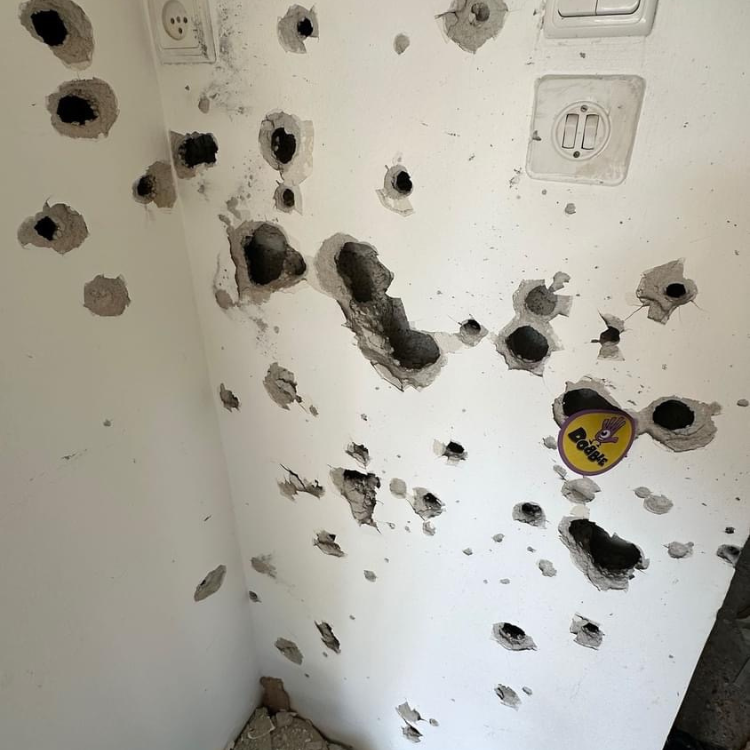
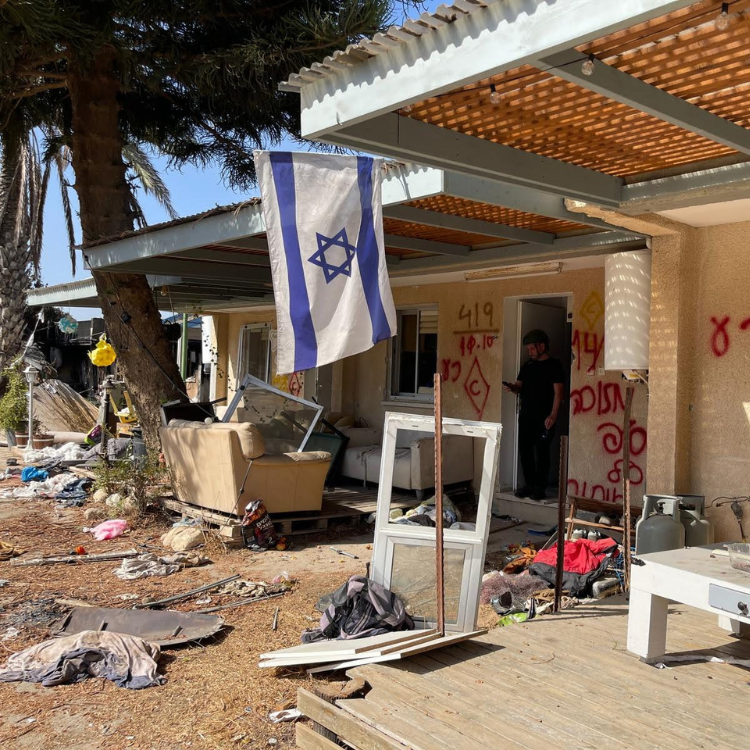
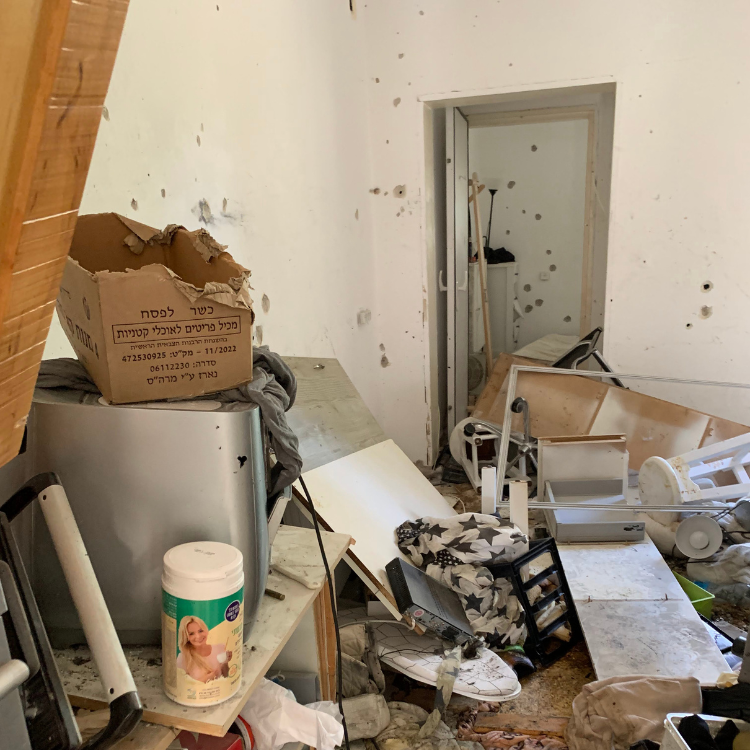
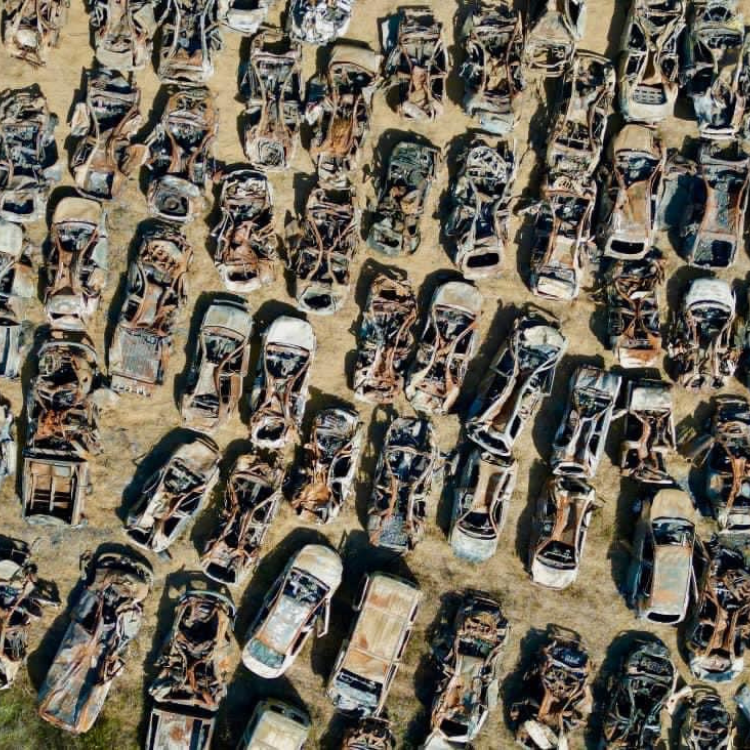
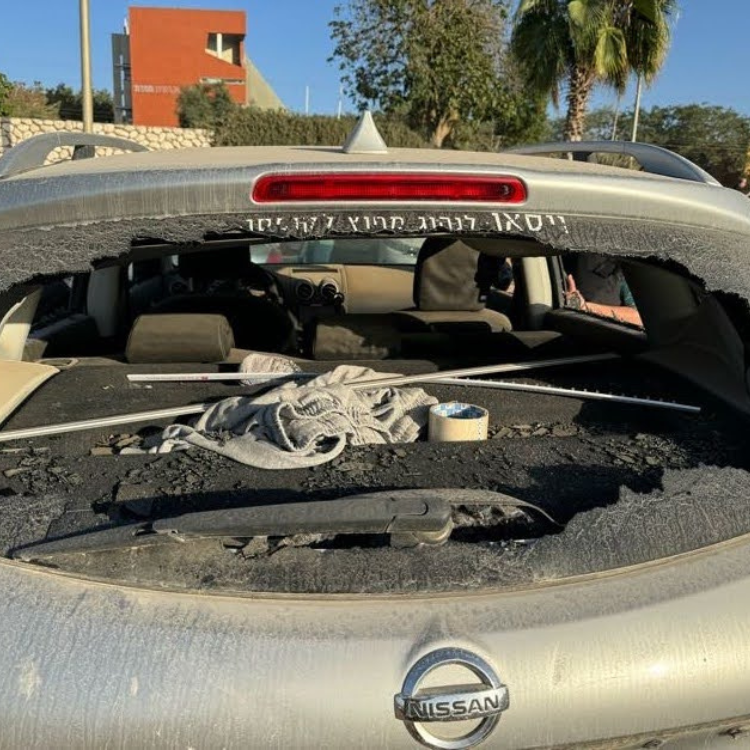
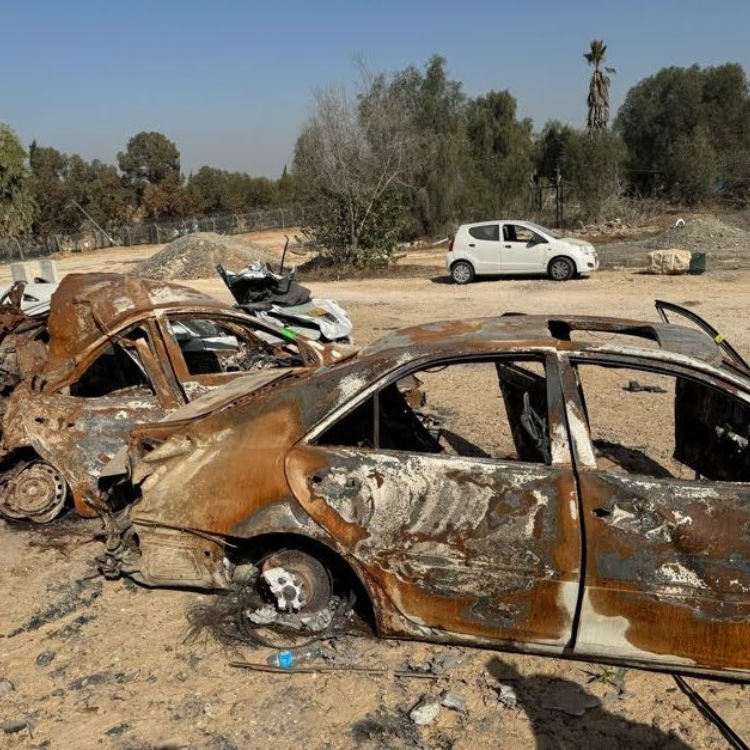
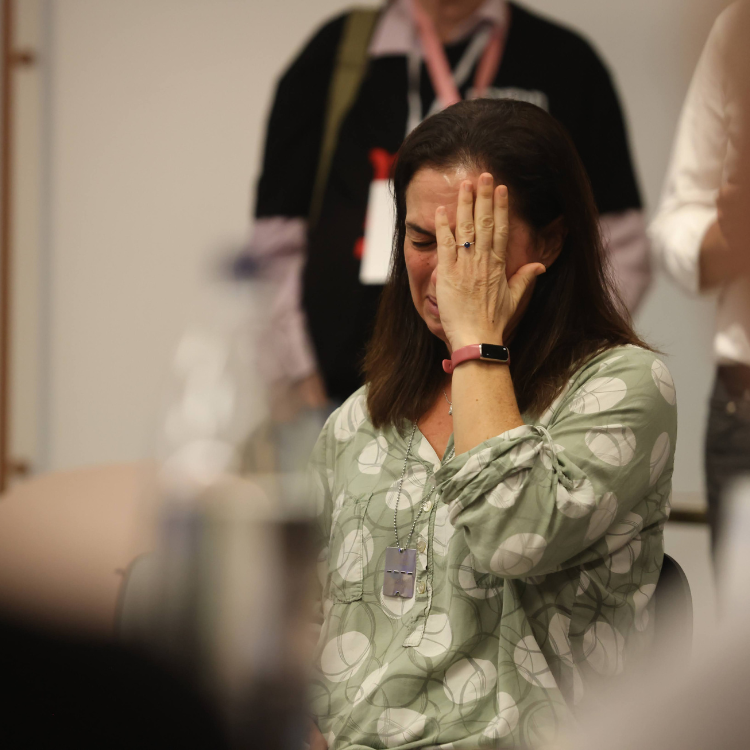
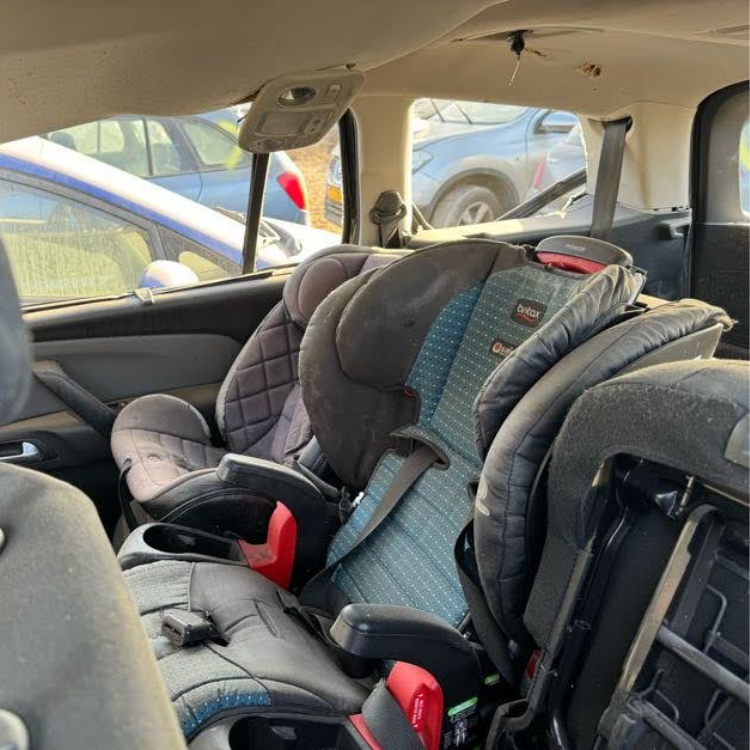
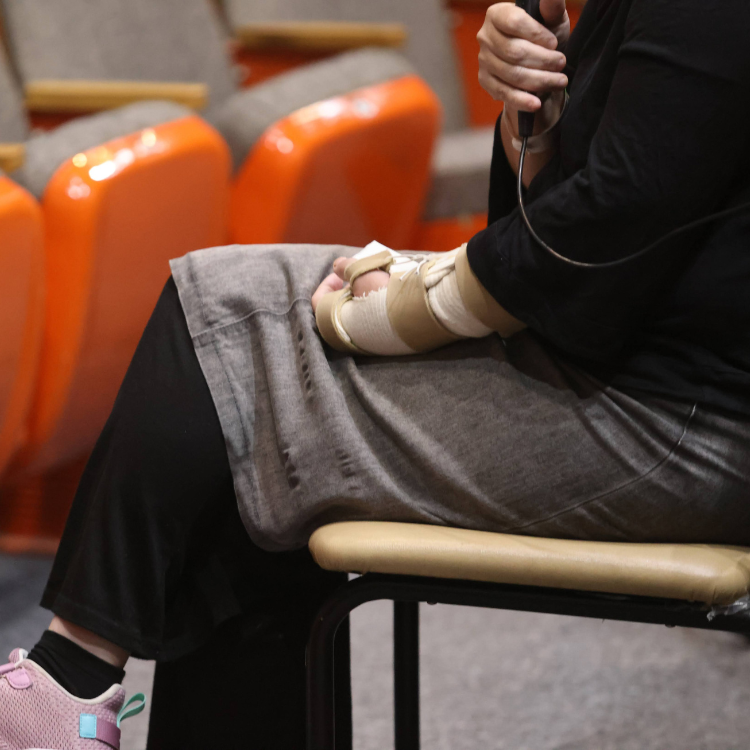
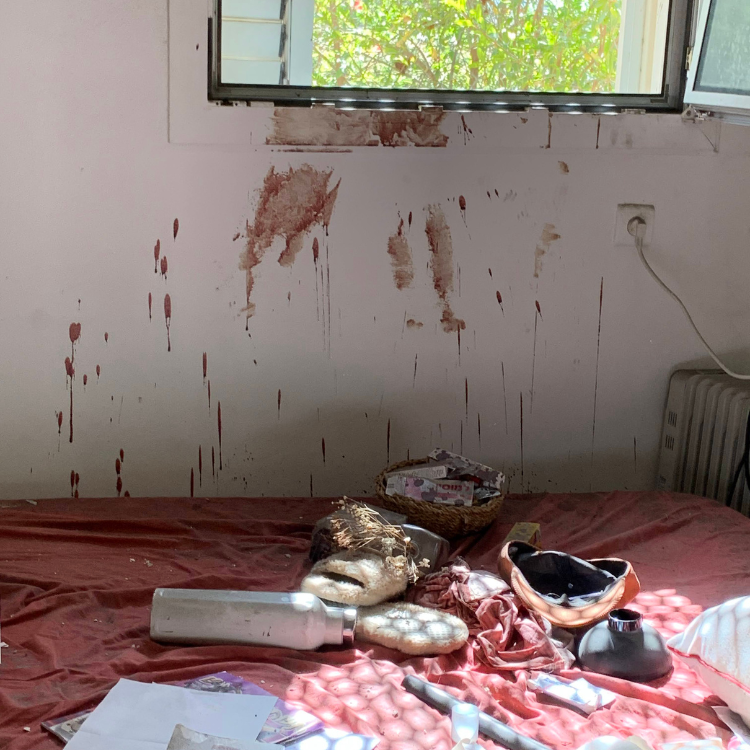
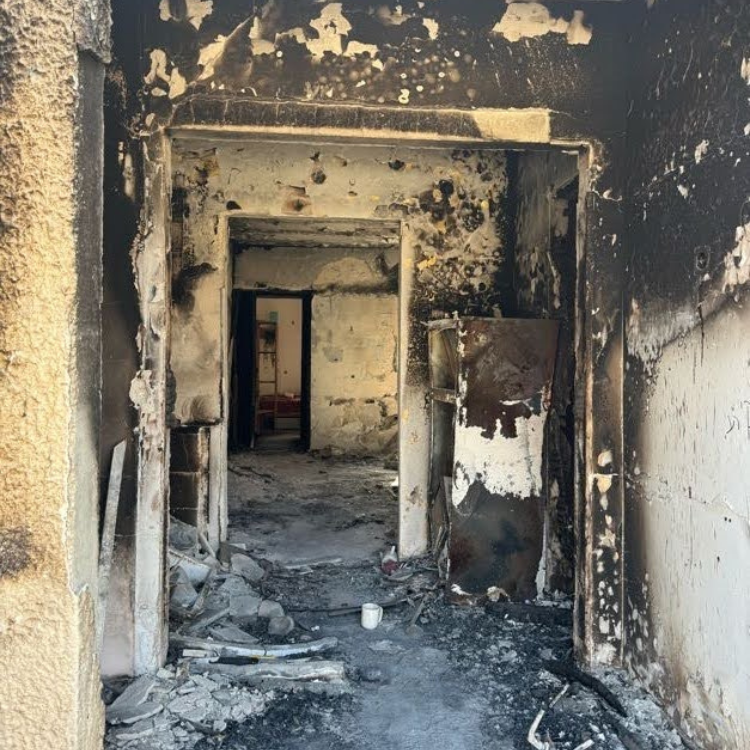
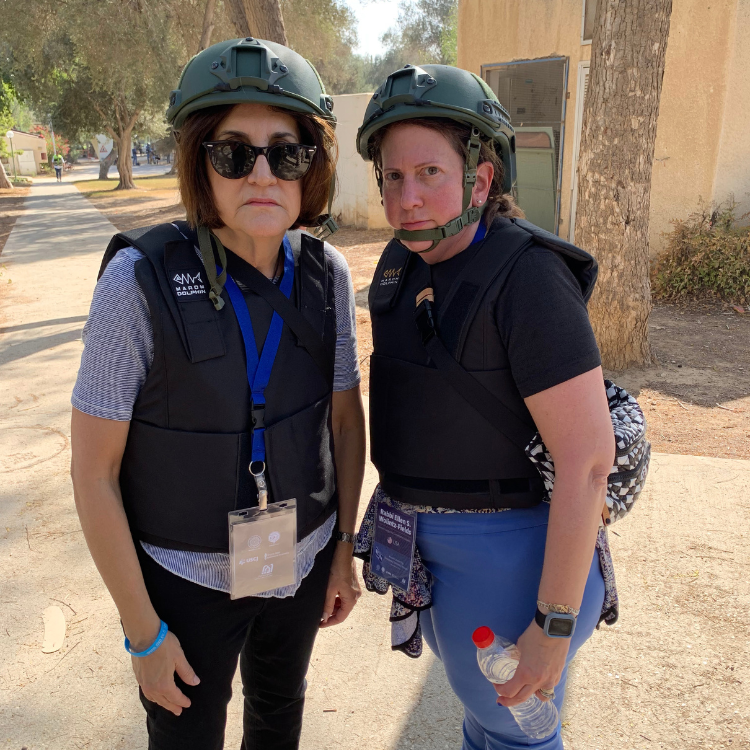
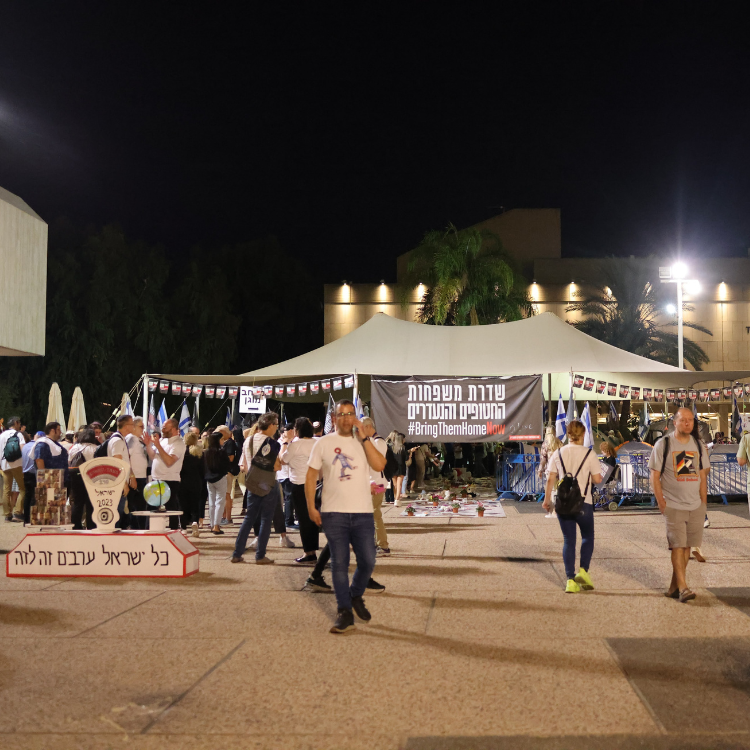
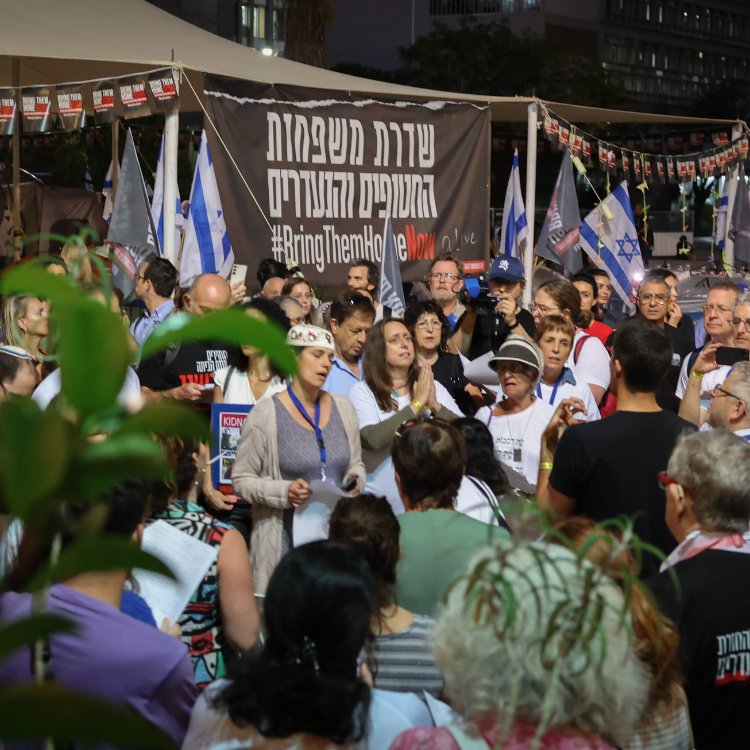
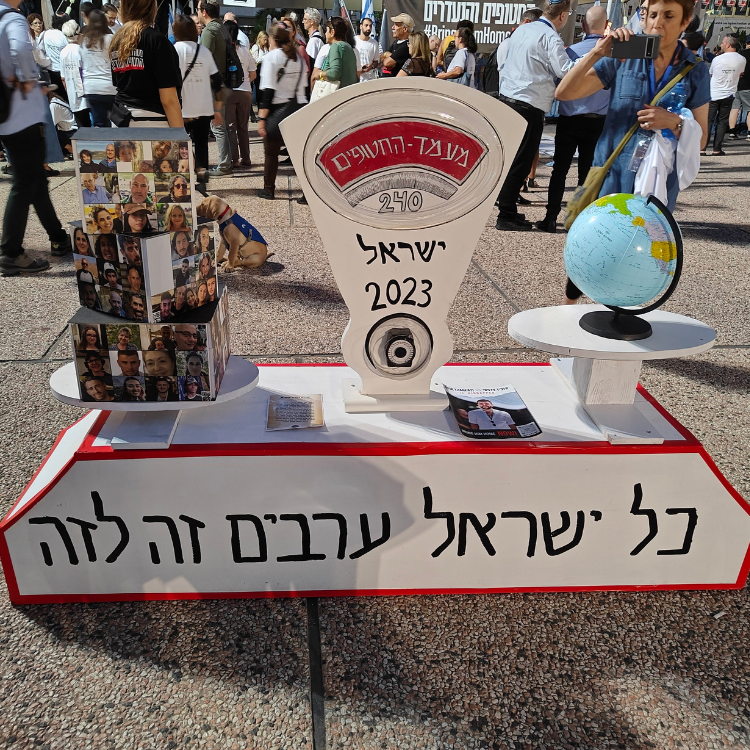























































 uly am my brother’s keeper
uly am my brother’s keeper
 February 19, 2022 | 18th of Adar I, 5782
February 19, 2022 | 18th of Adar I, 5782 February 5, 2022 | 4th of Adar I, 5782
February 5, 2022 | 4th of Adar I, 5782 January 22, 2022 | 20th of Shevat, 5782
January 22, 2022 | 20th of Shevat, 5782


 By Barbara Ezring – International Torah Fund Chair
By Barbara Ezring – International Torah Fund Chair